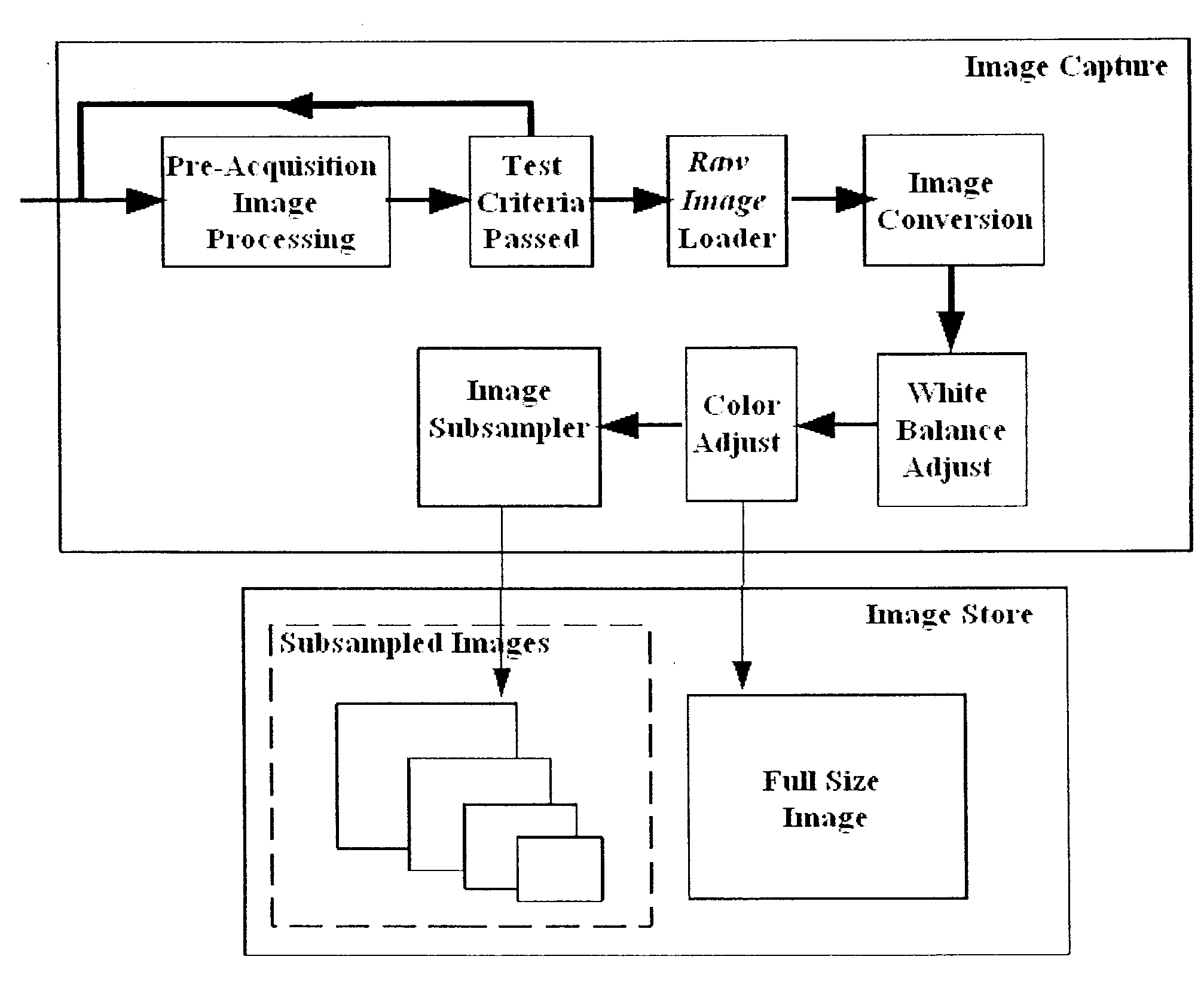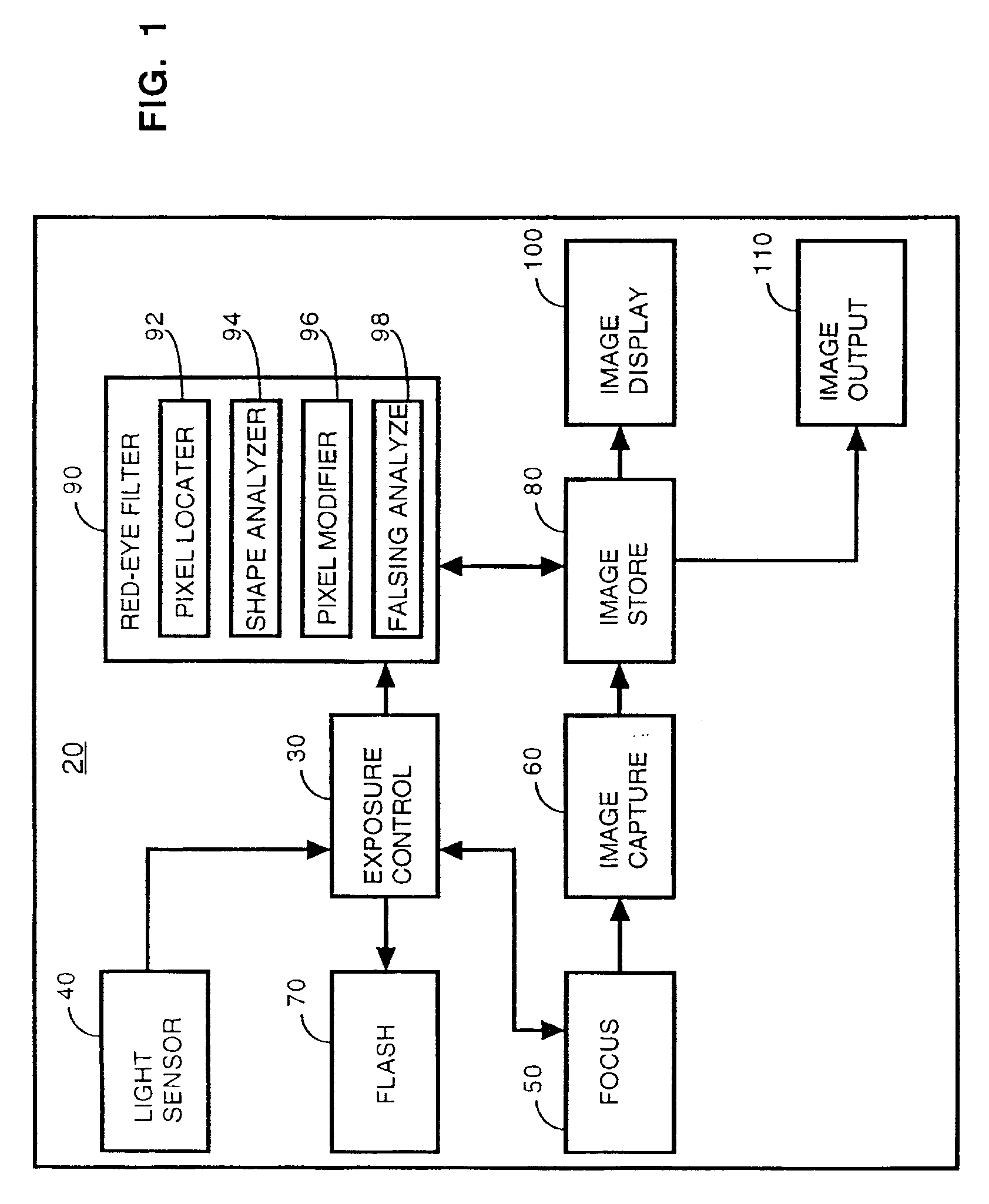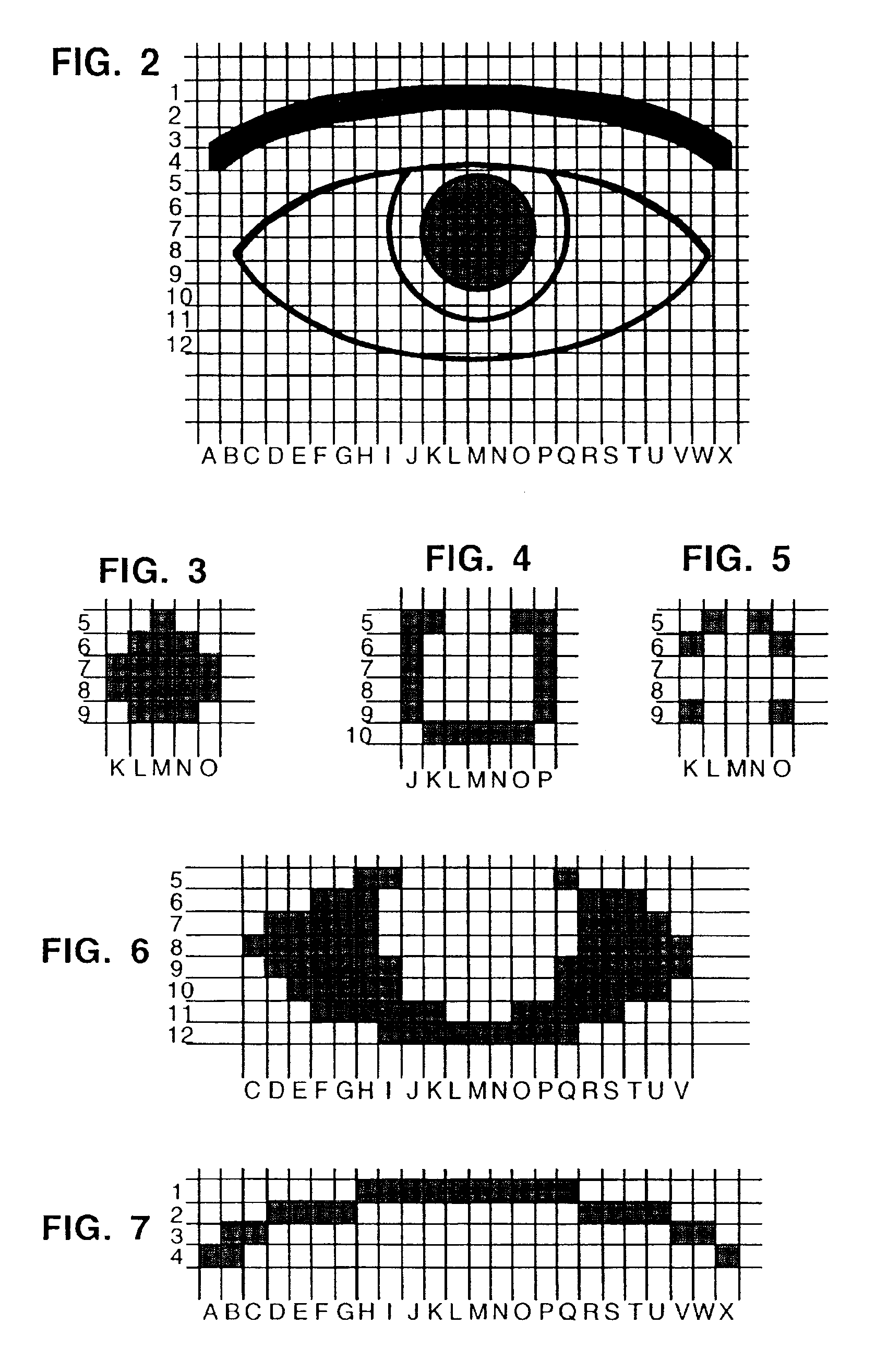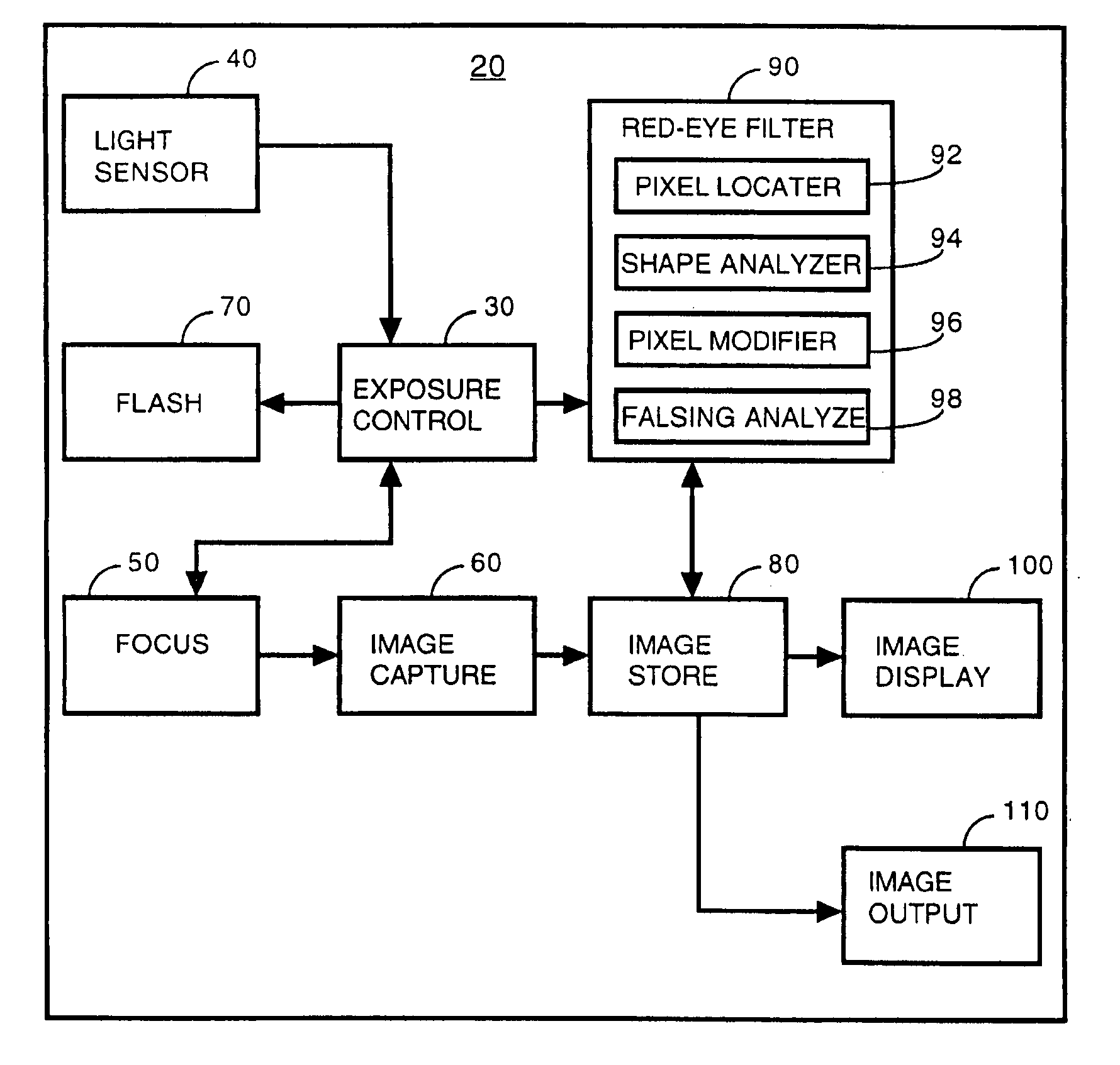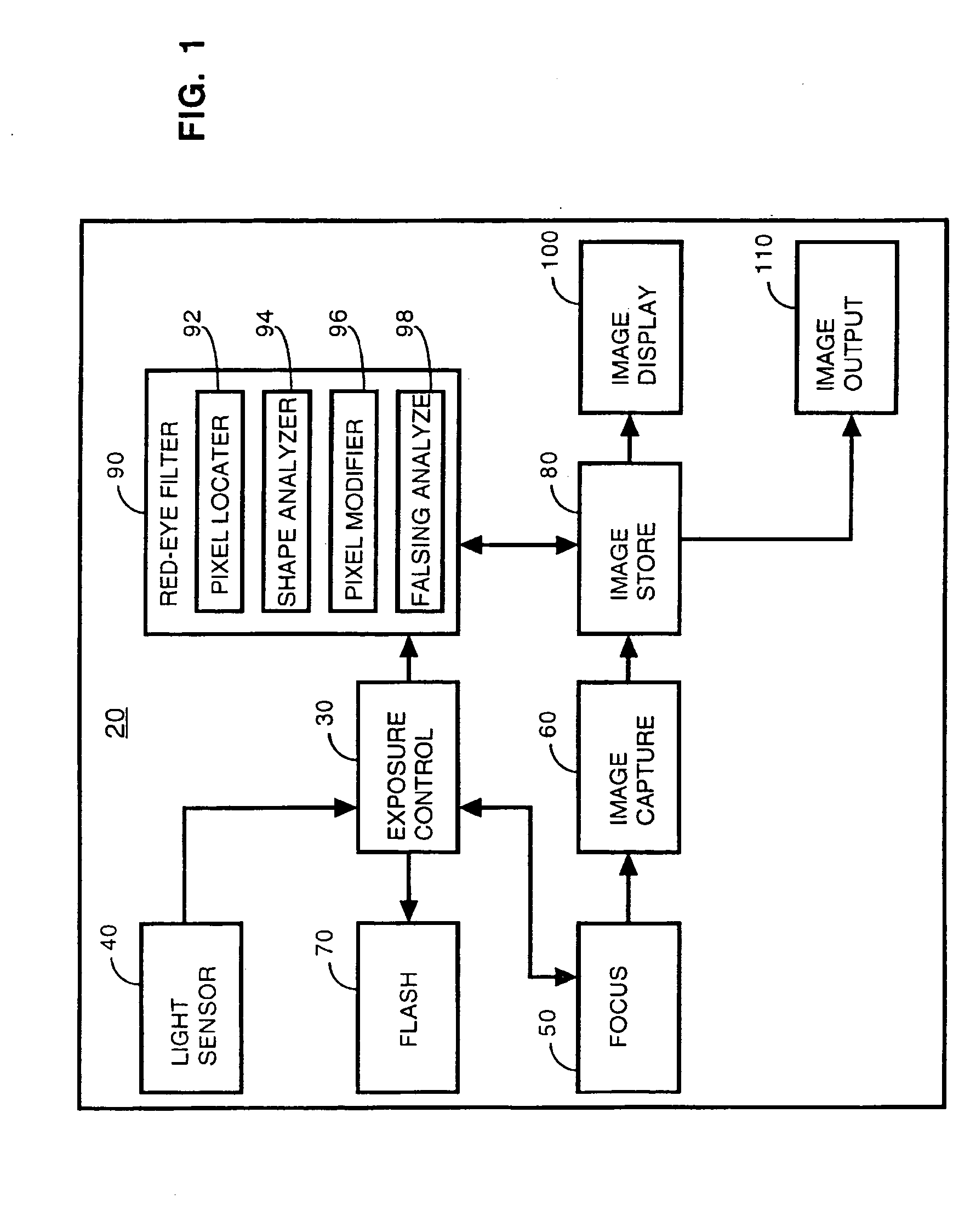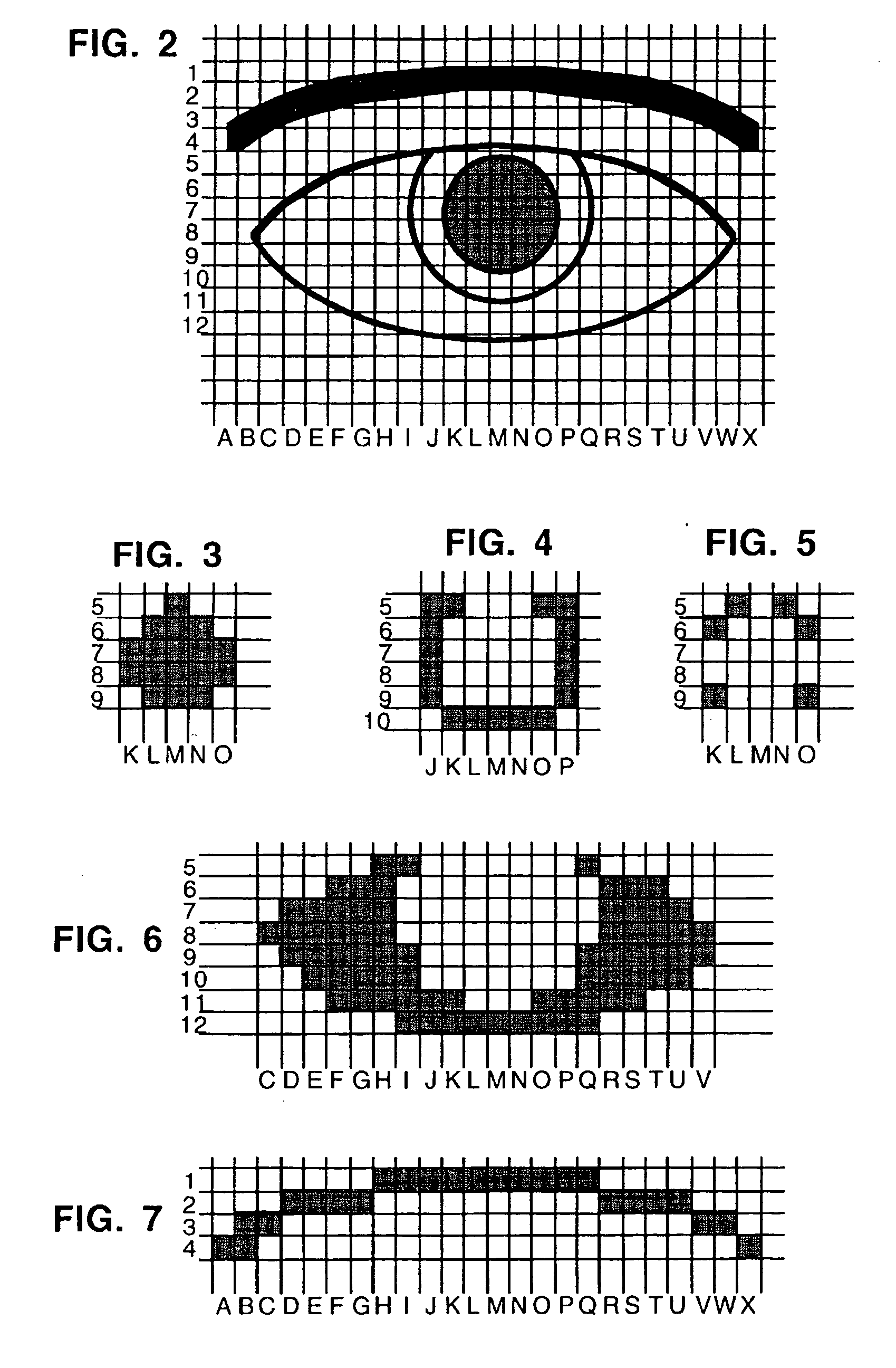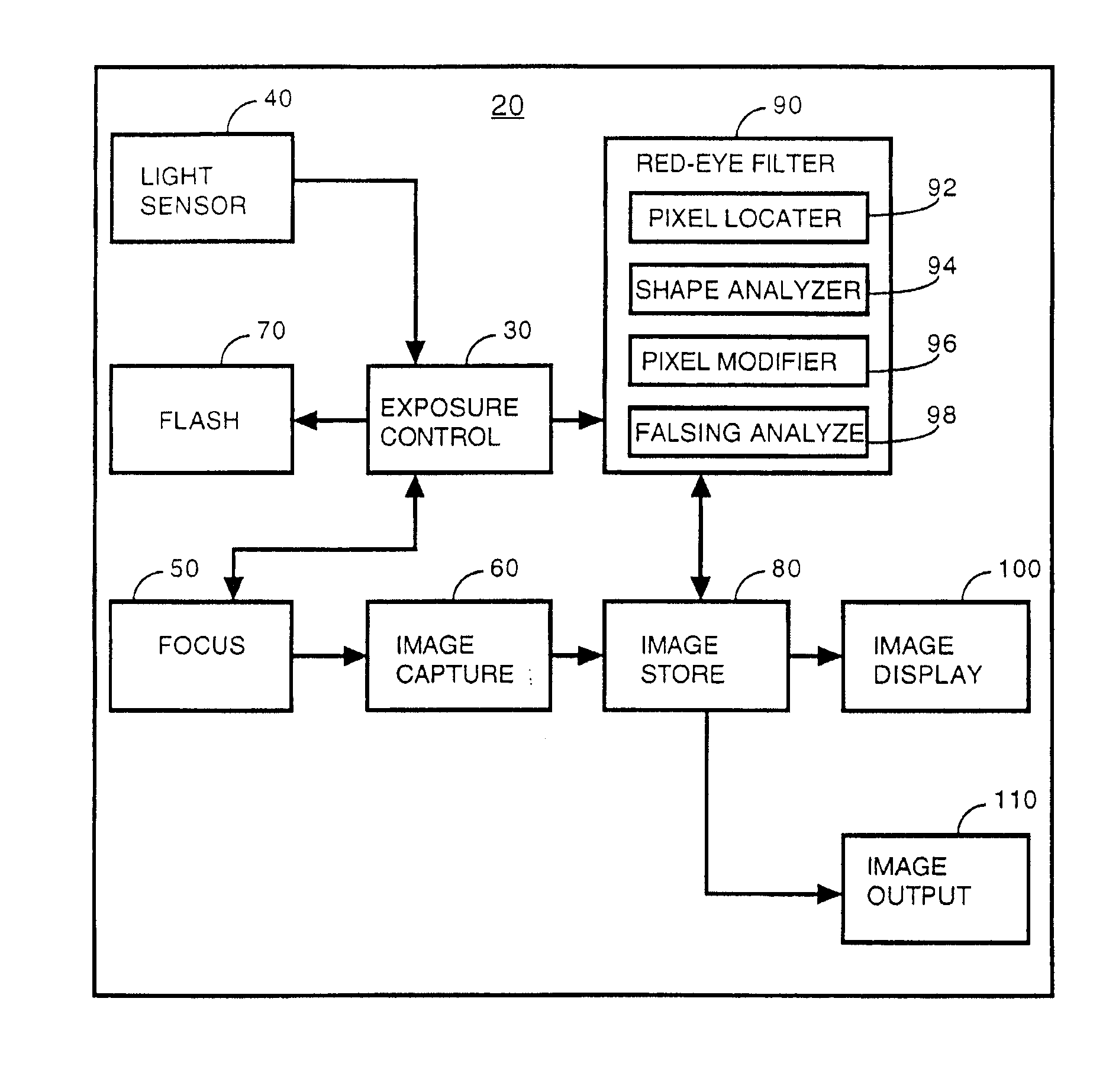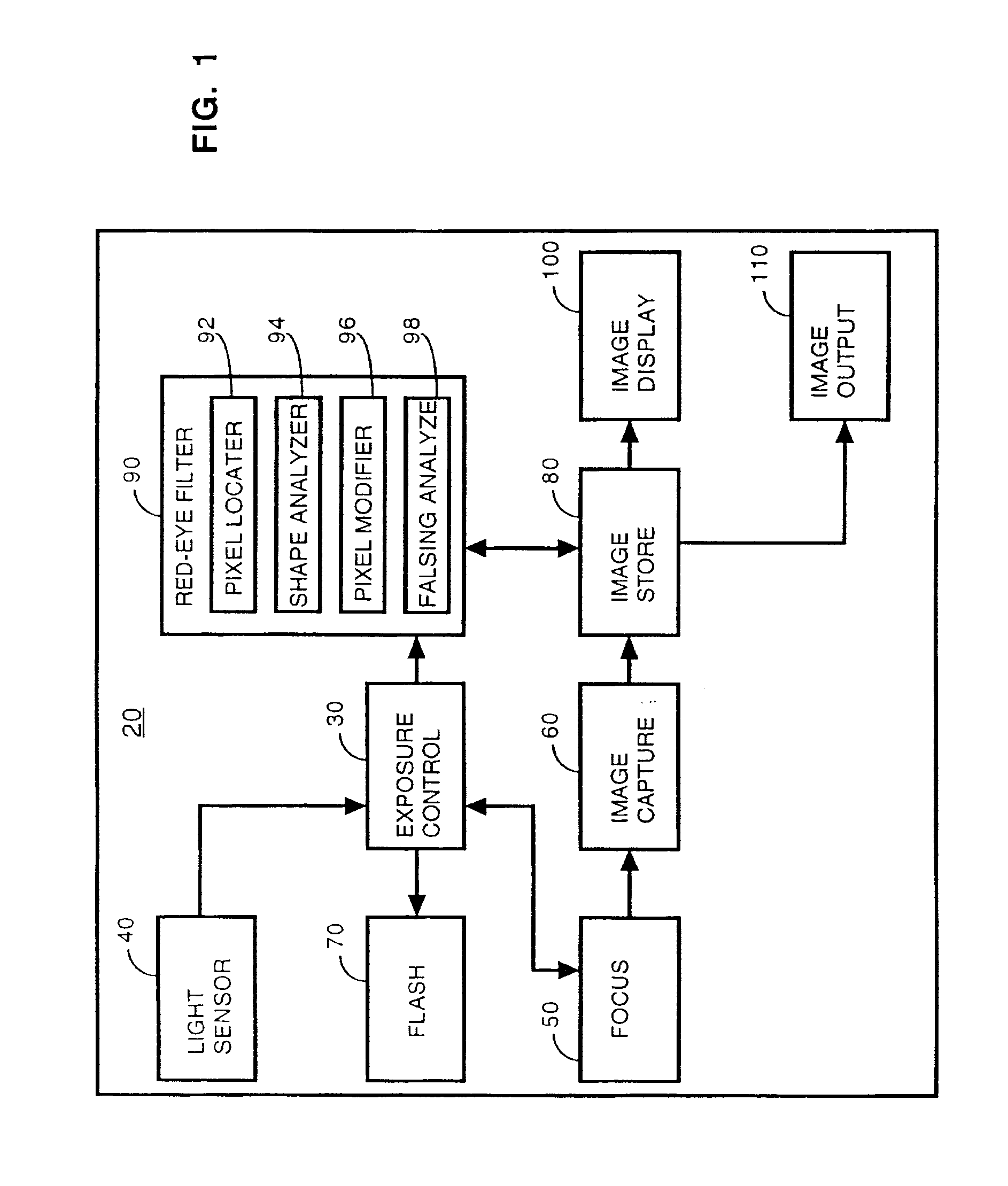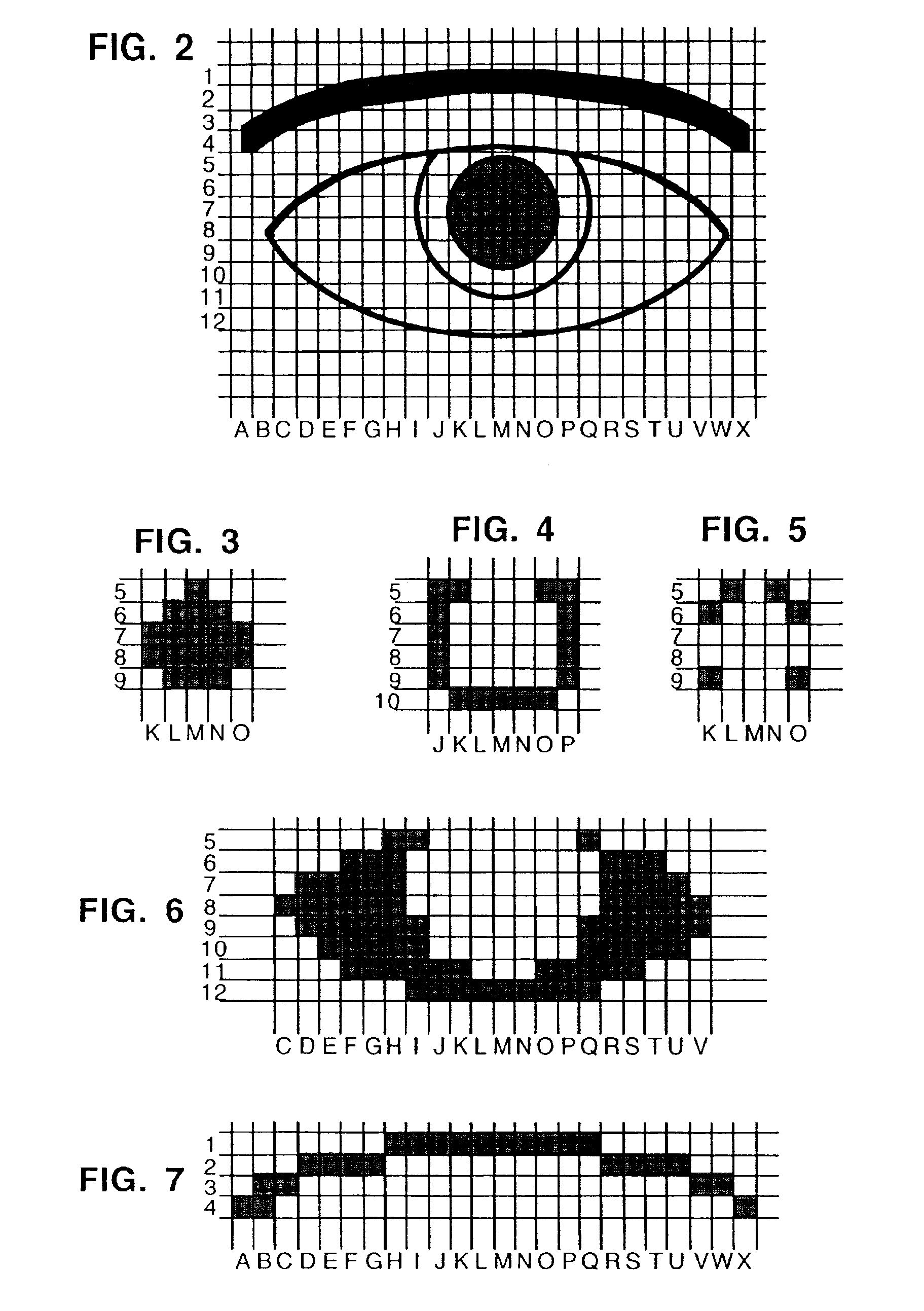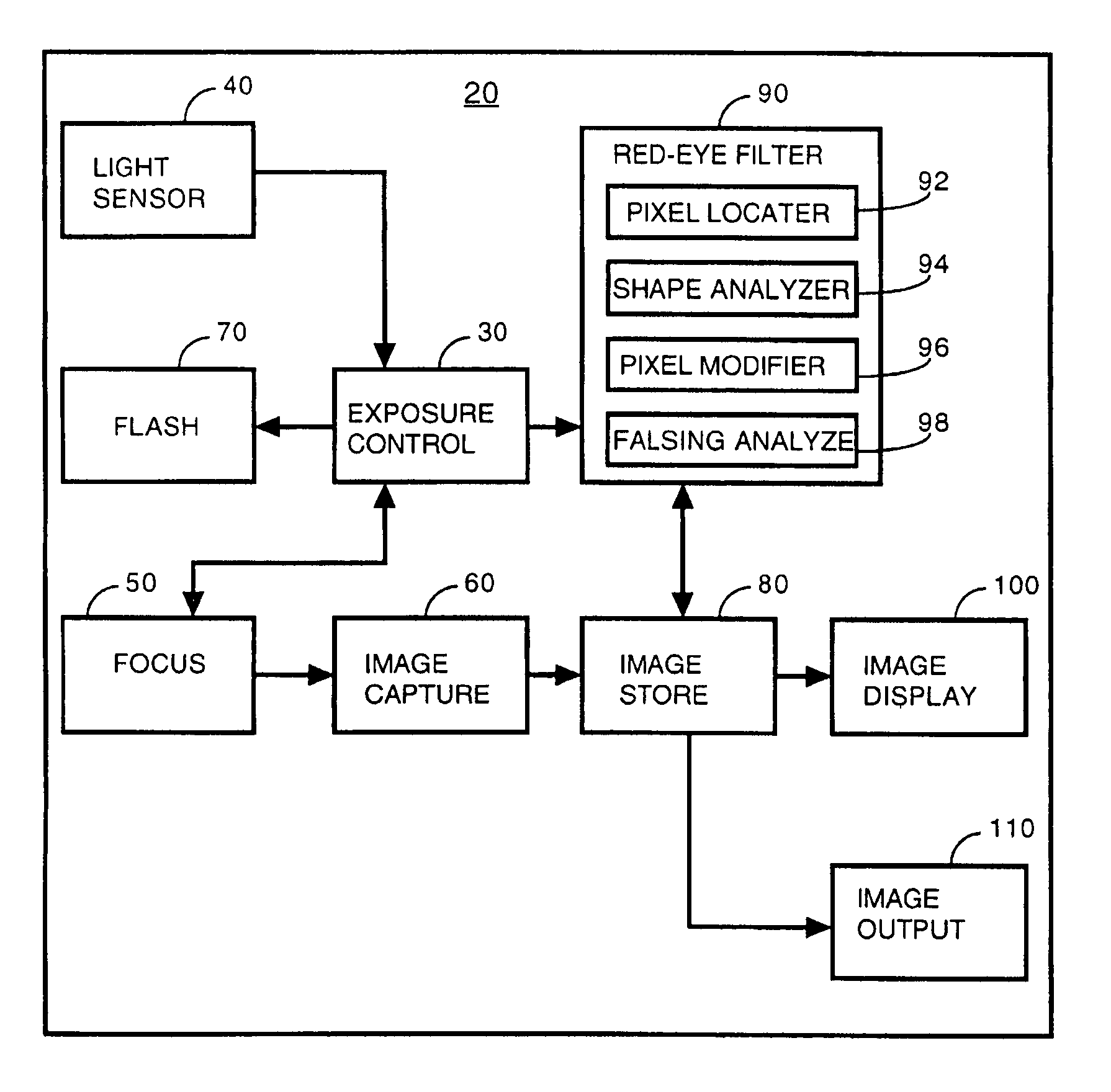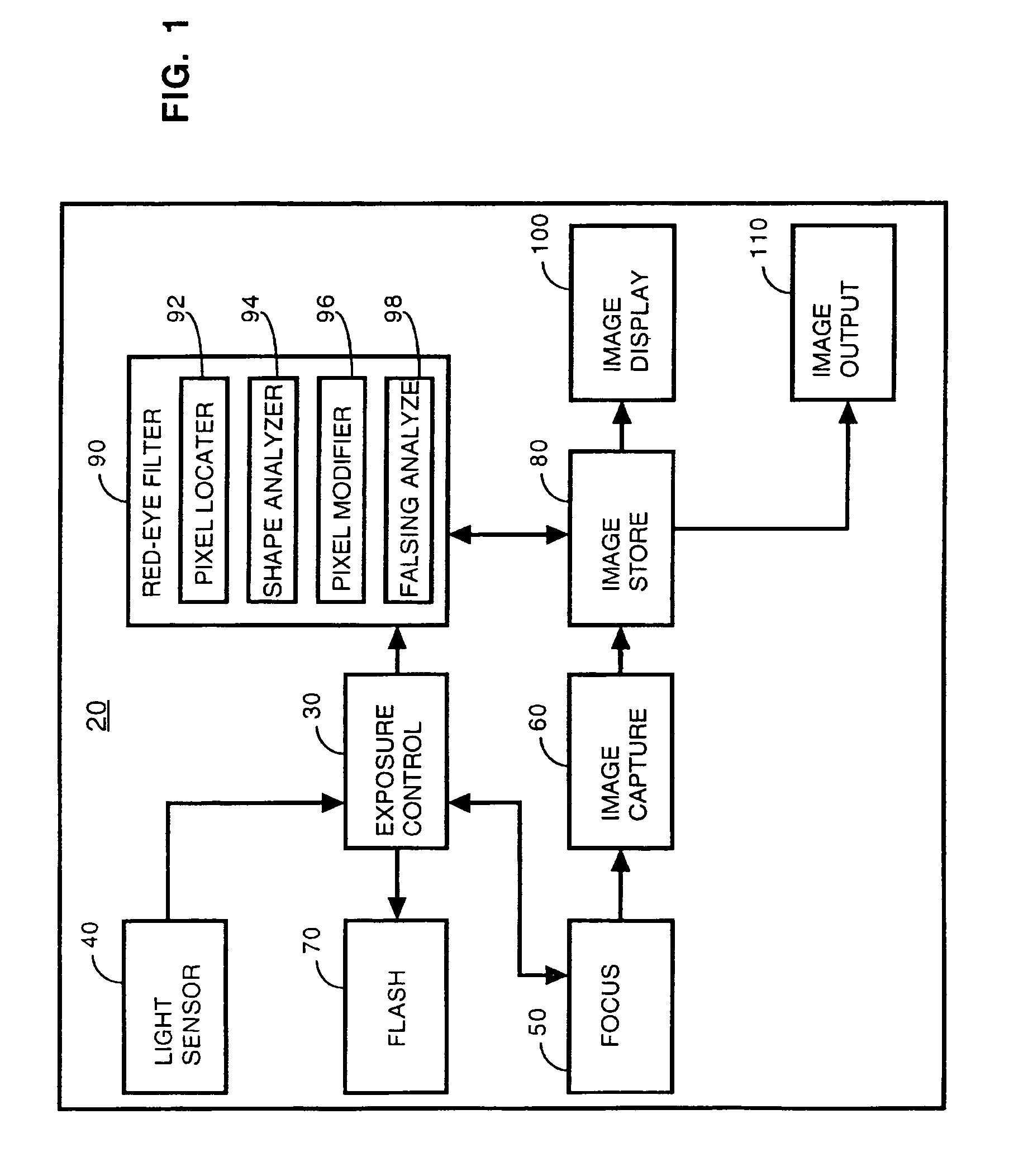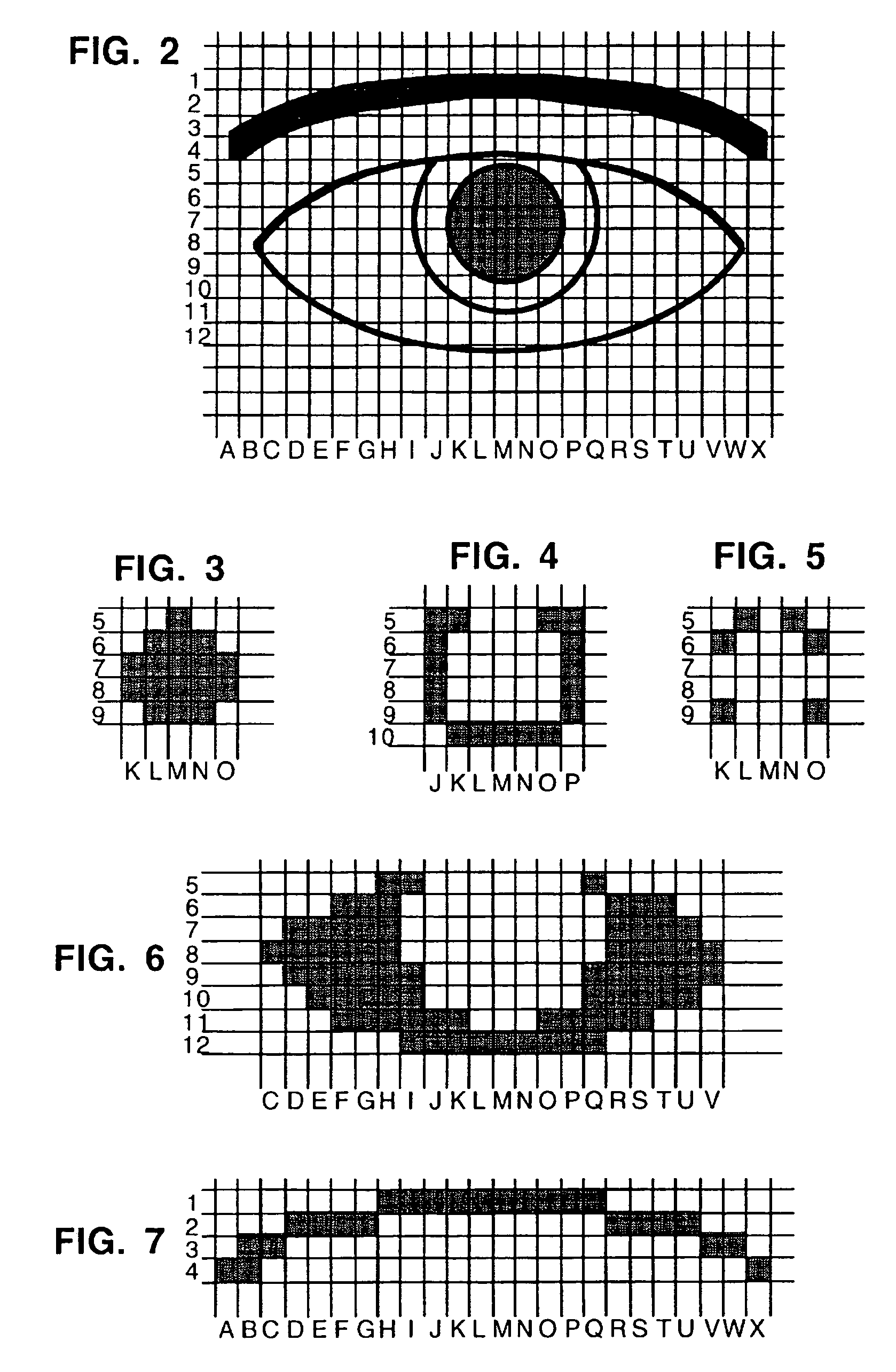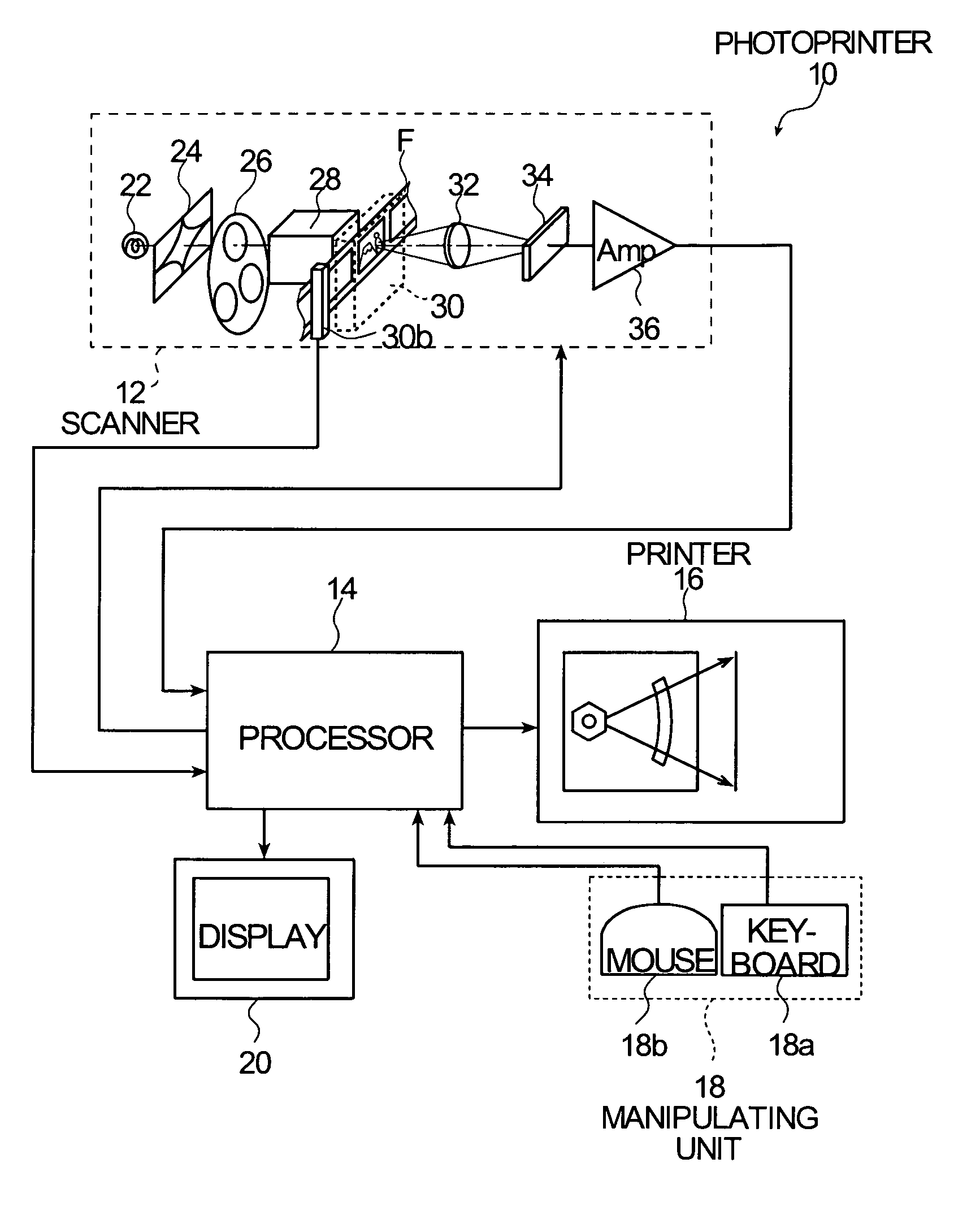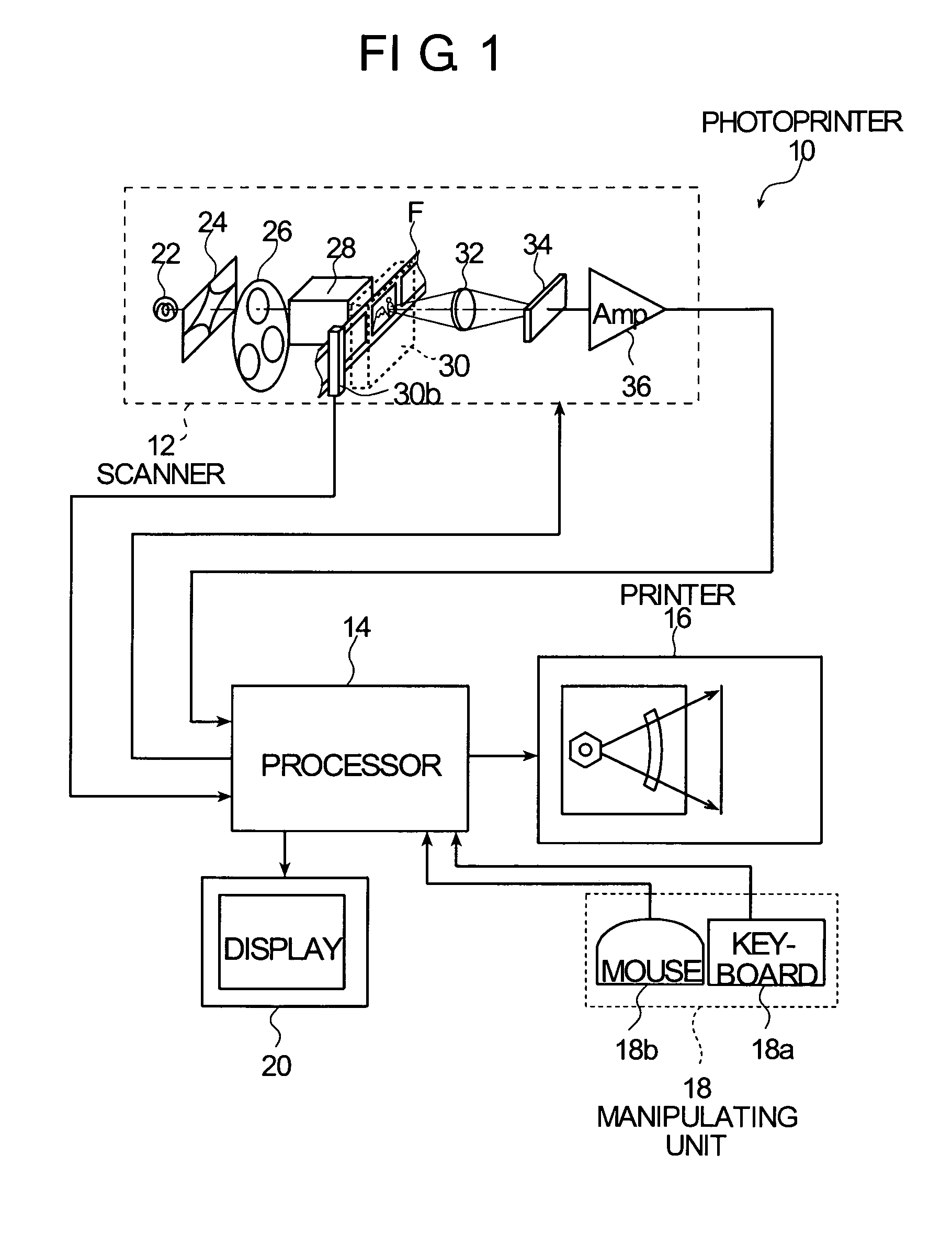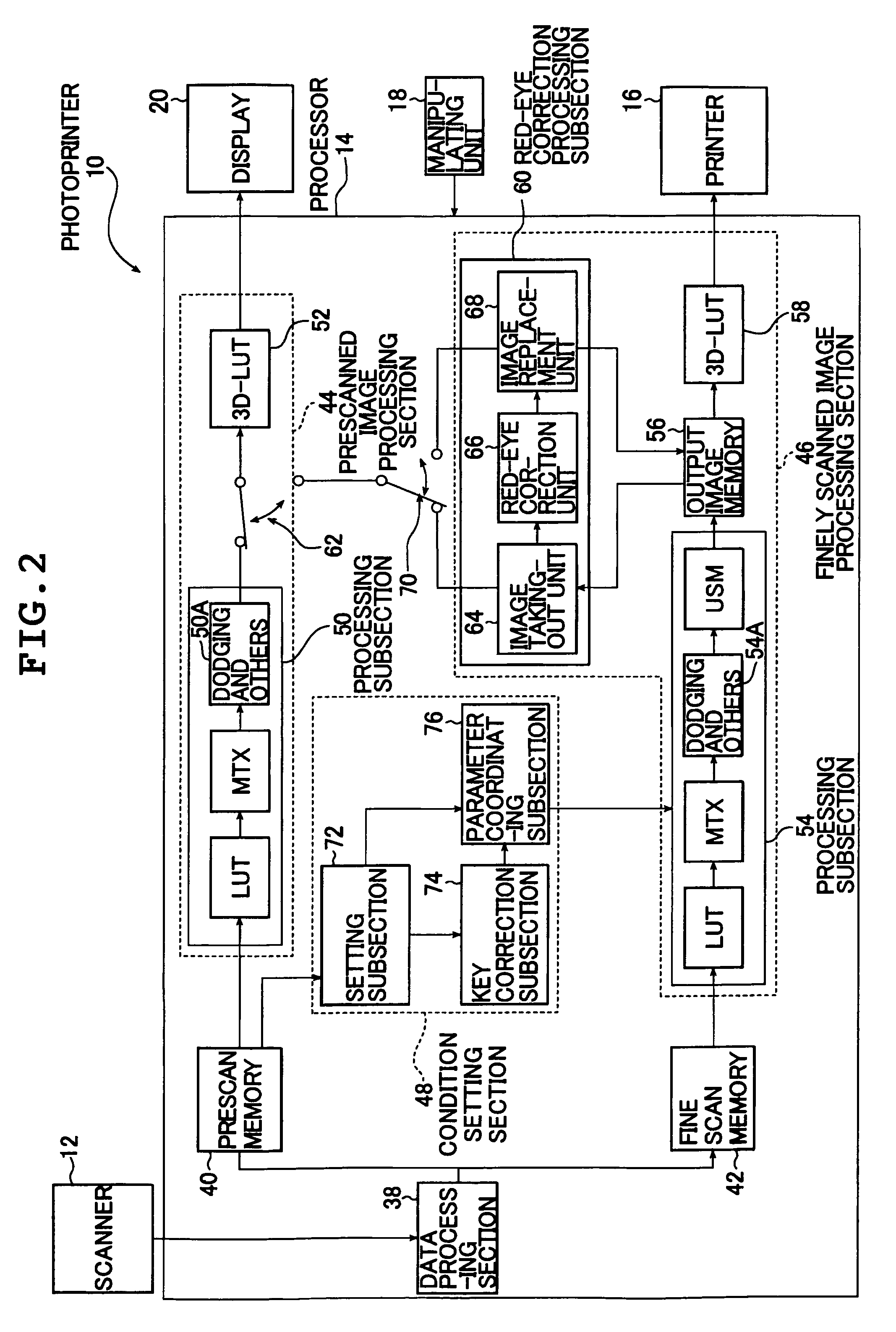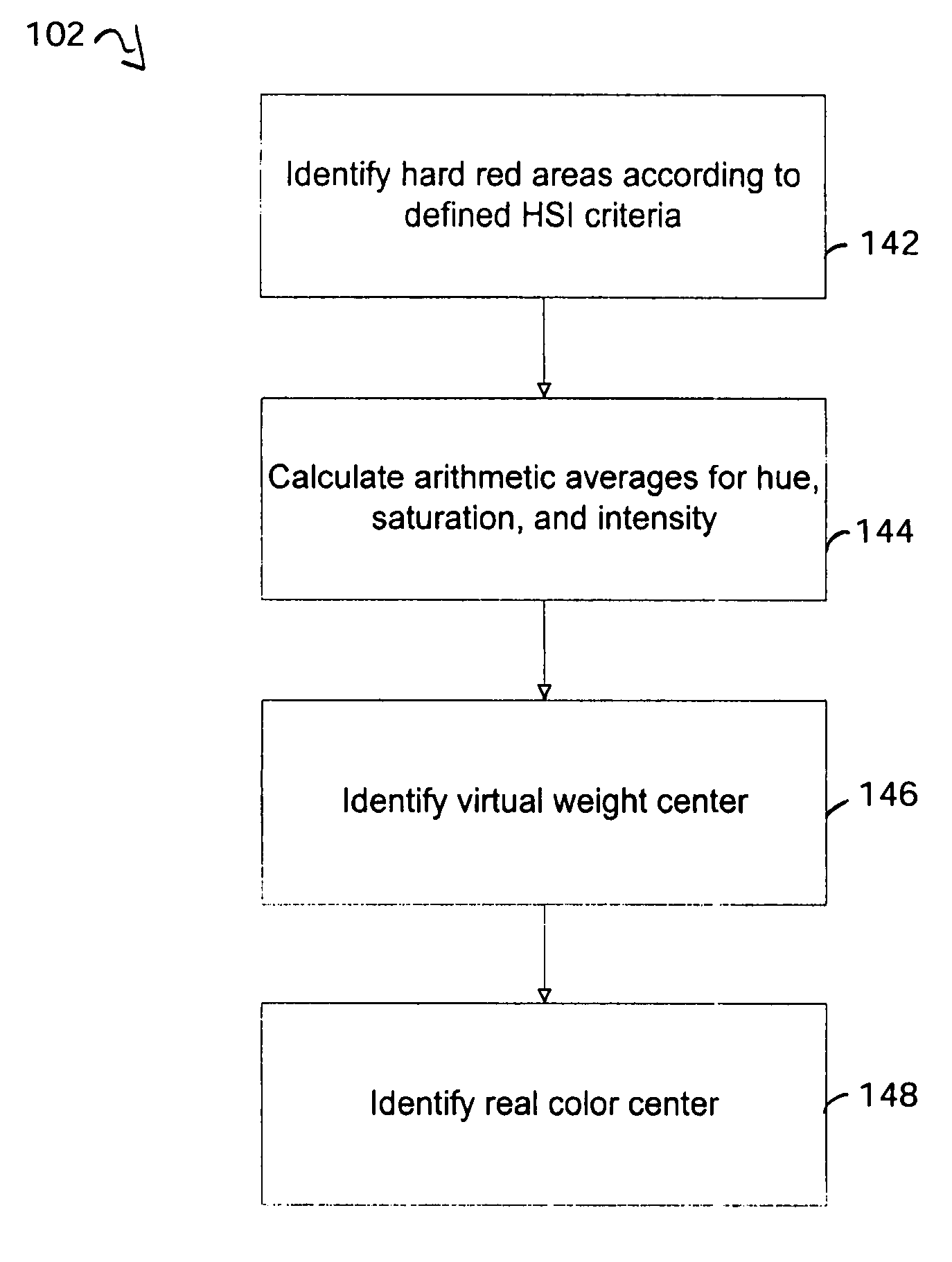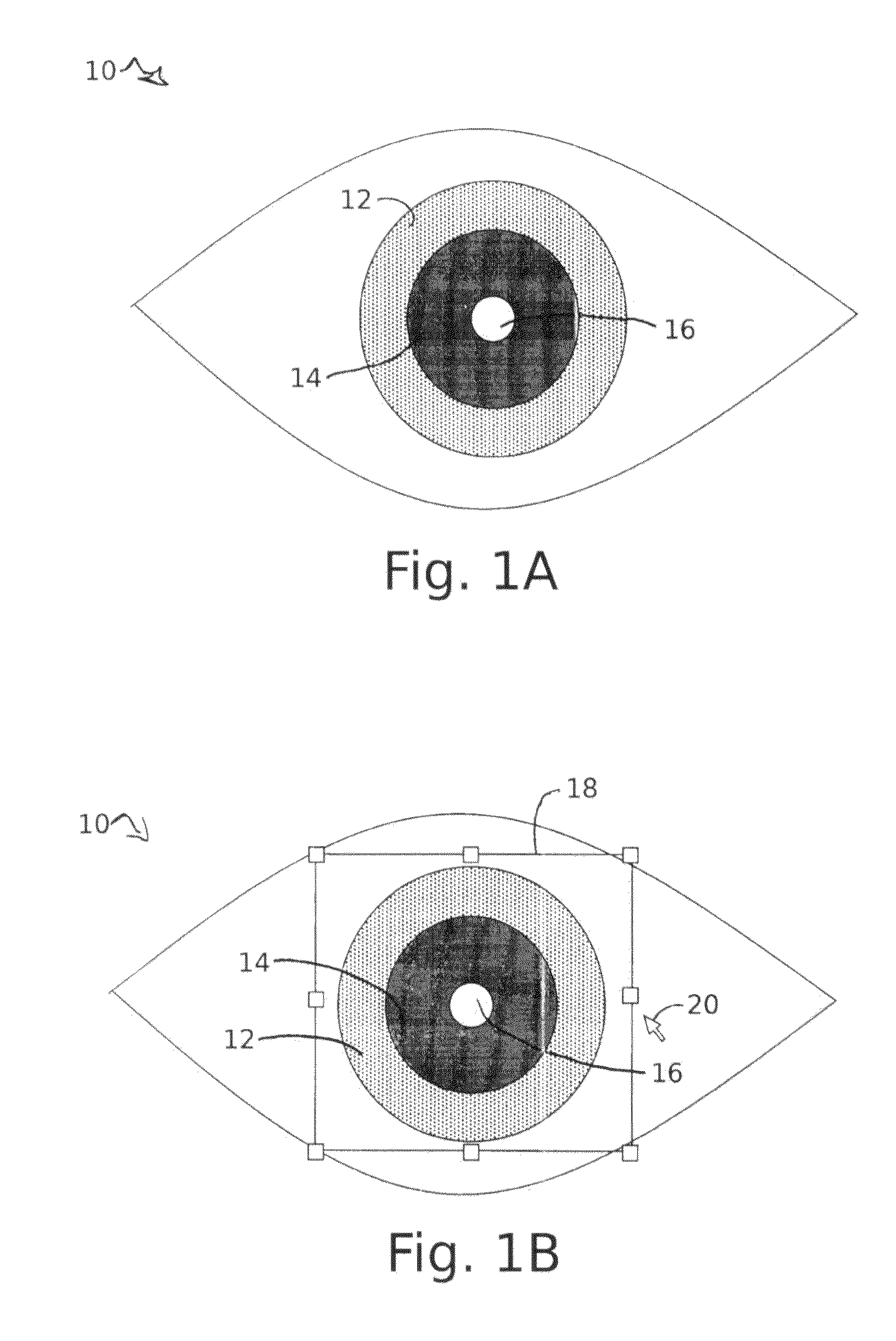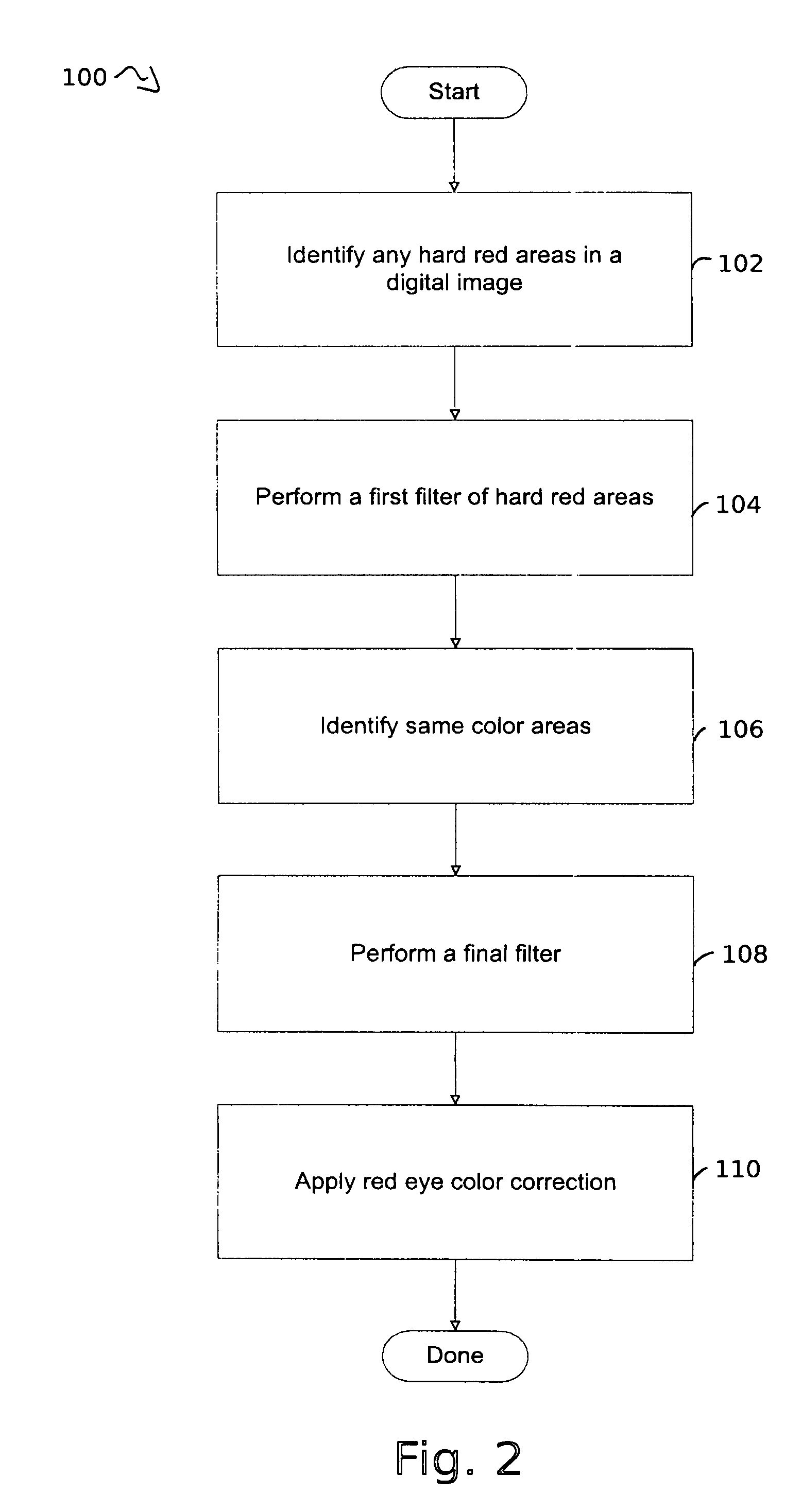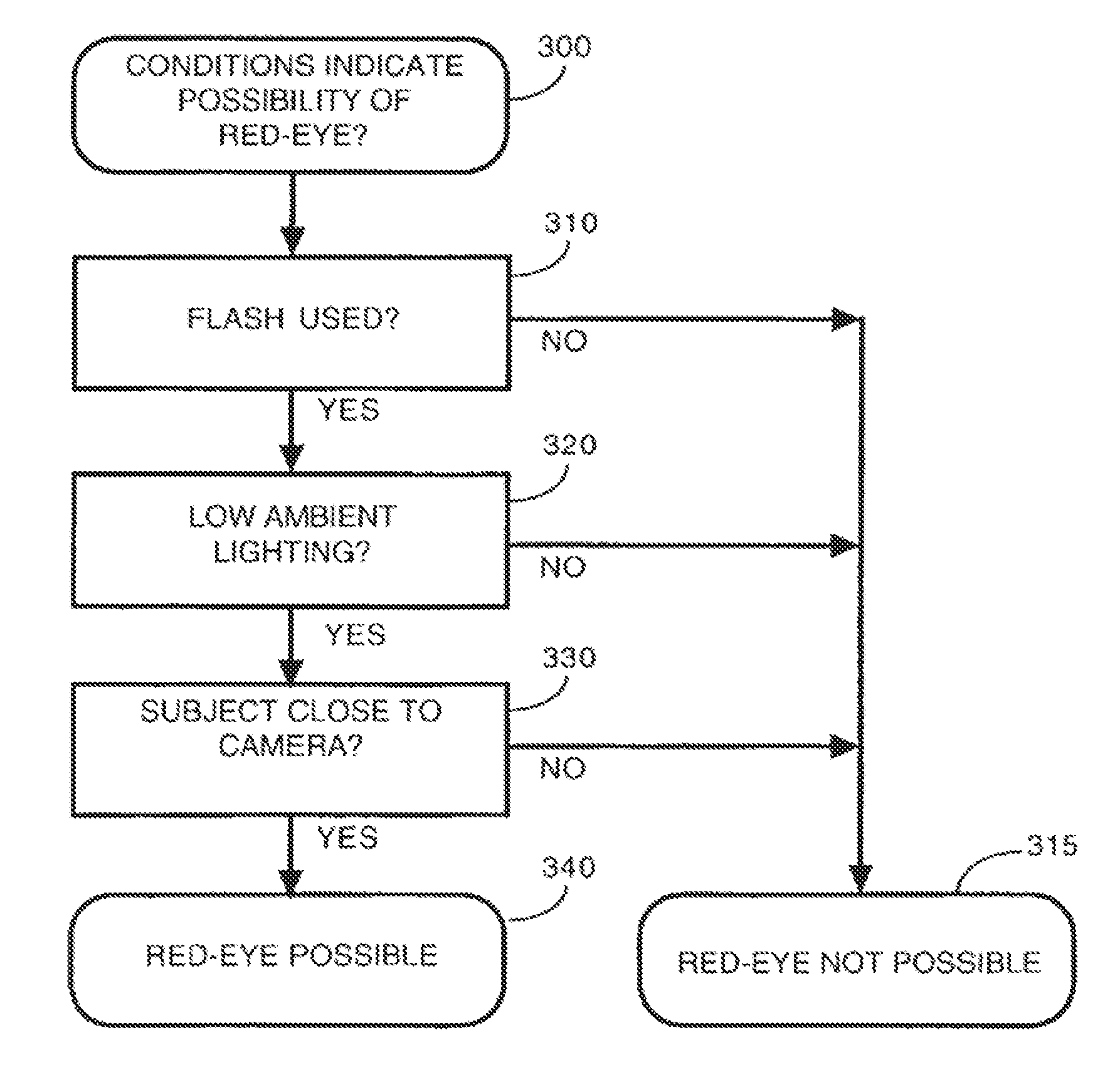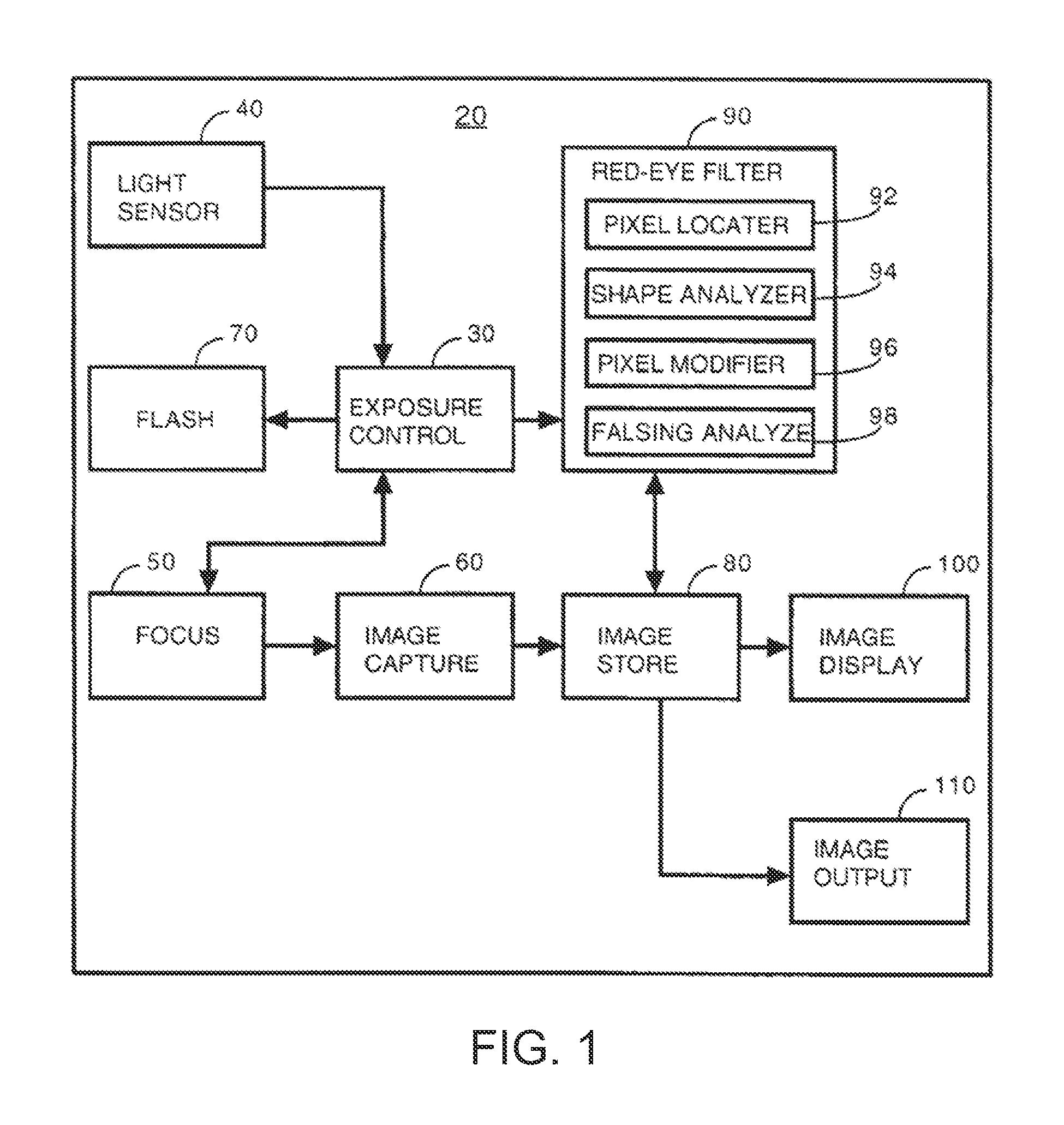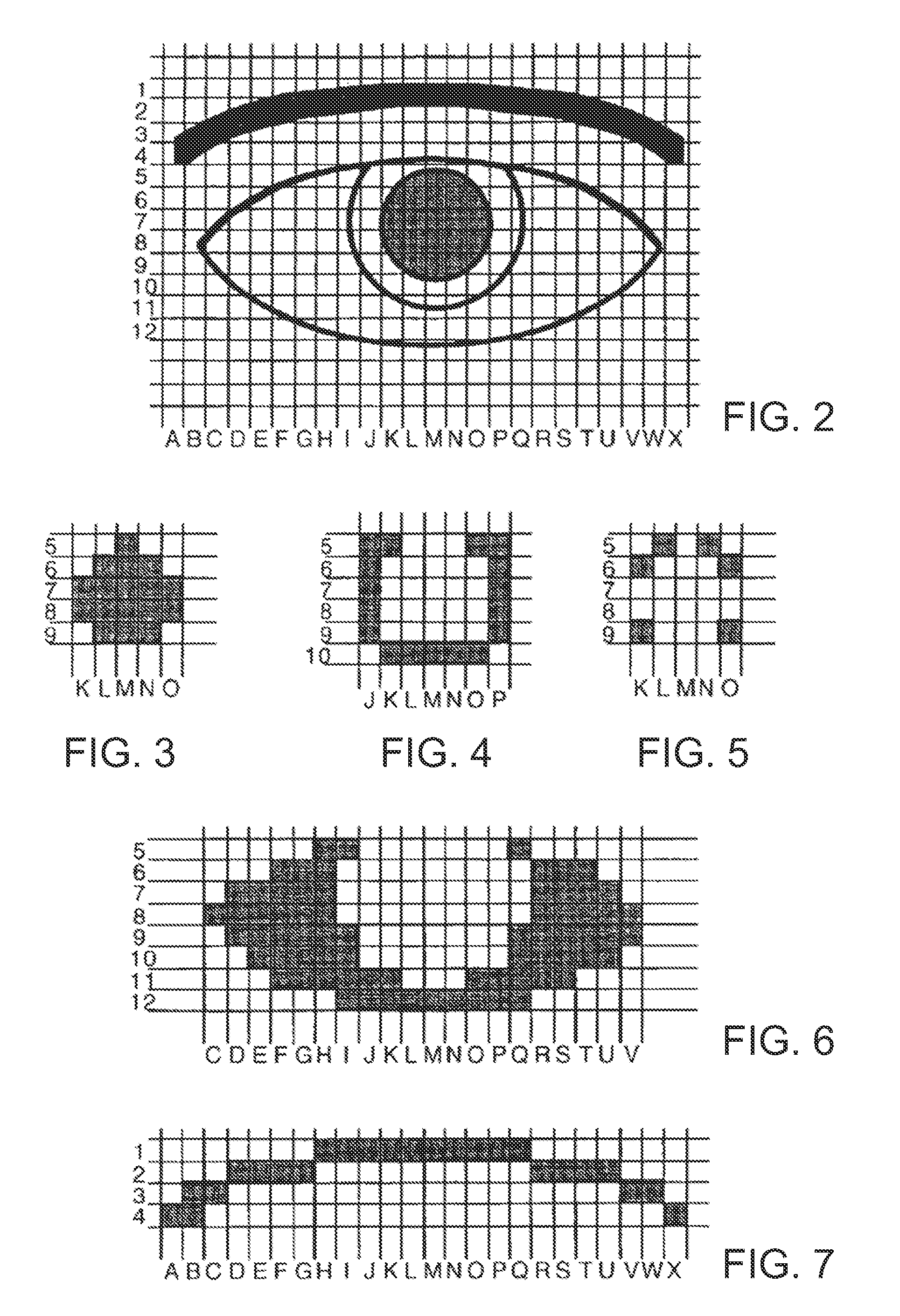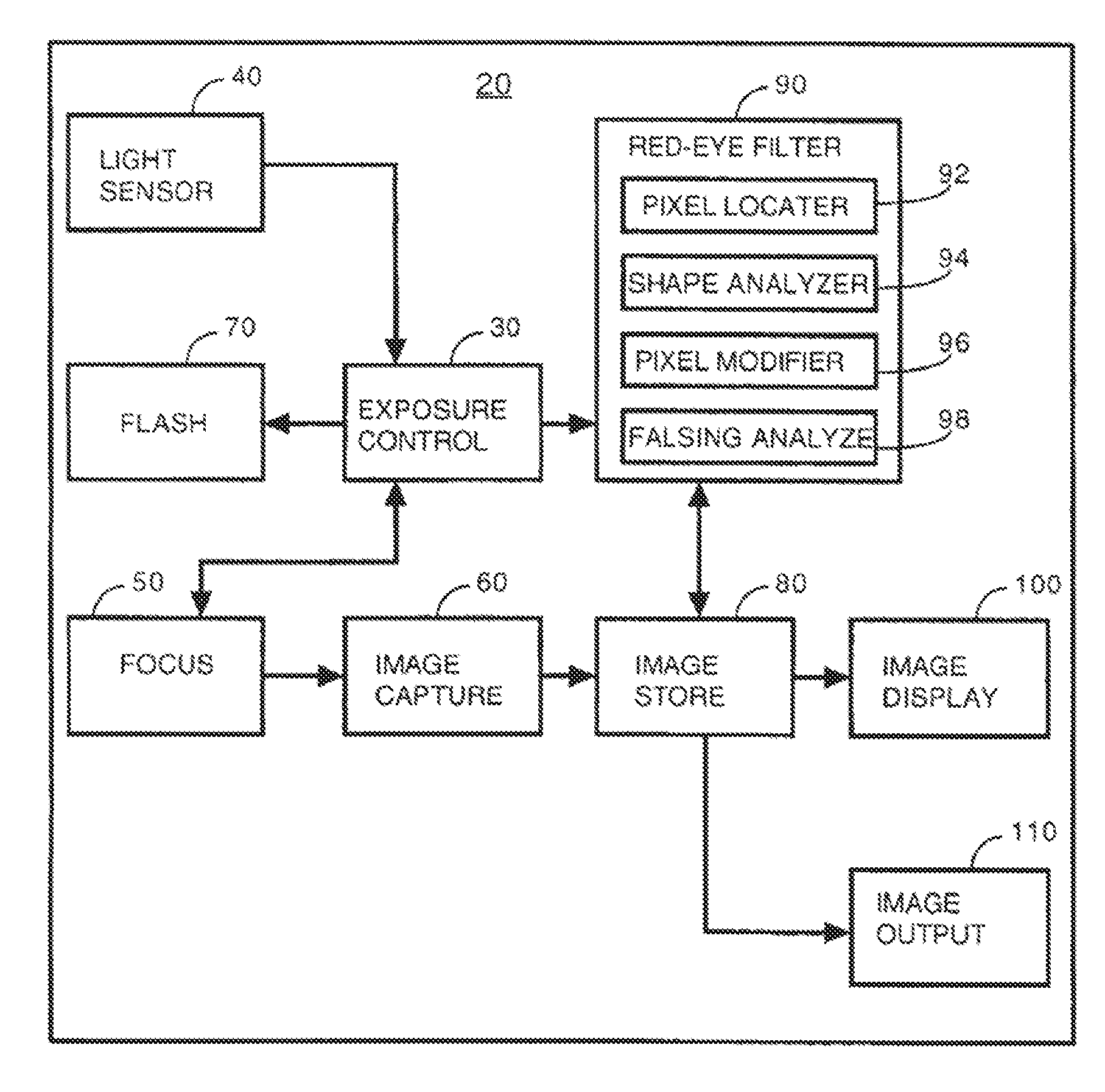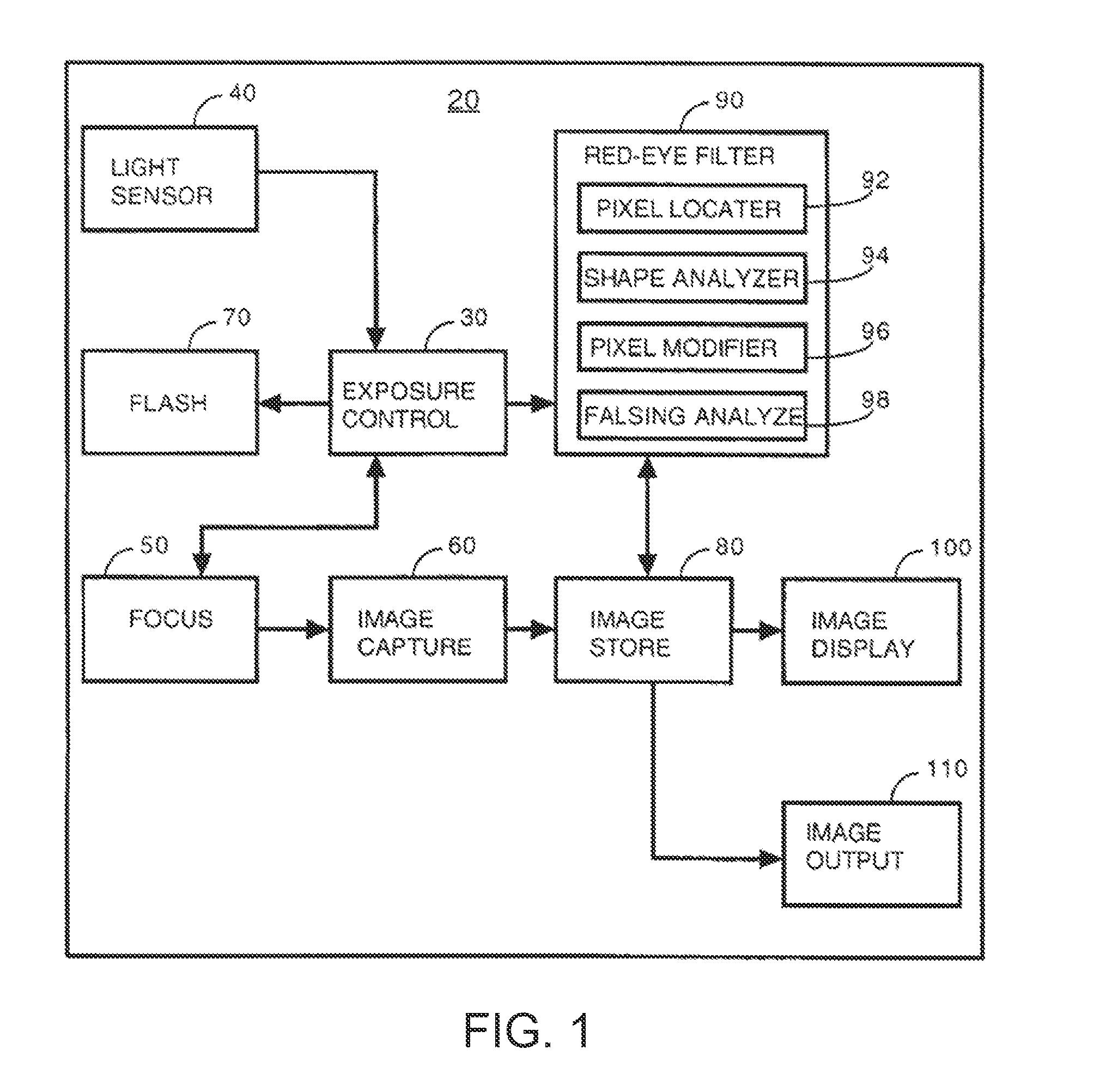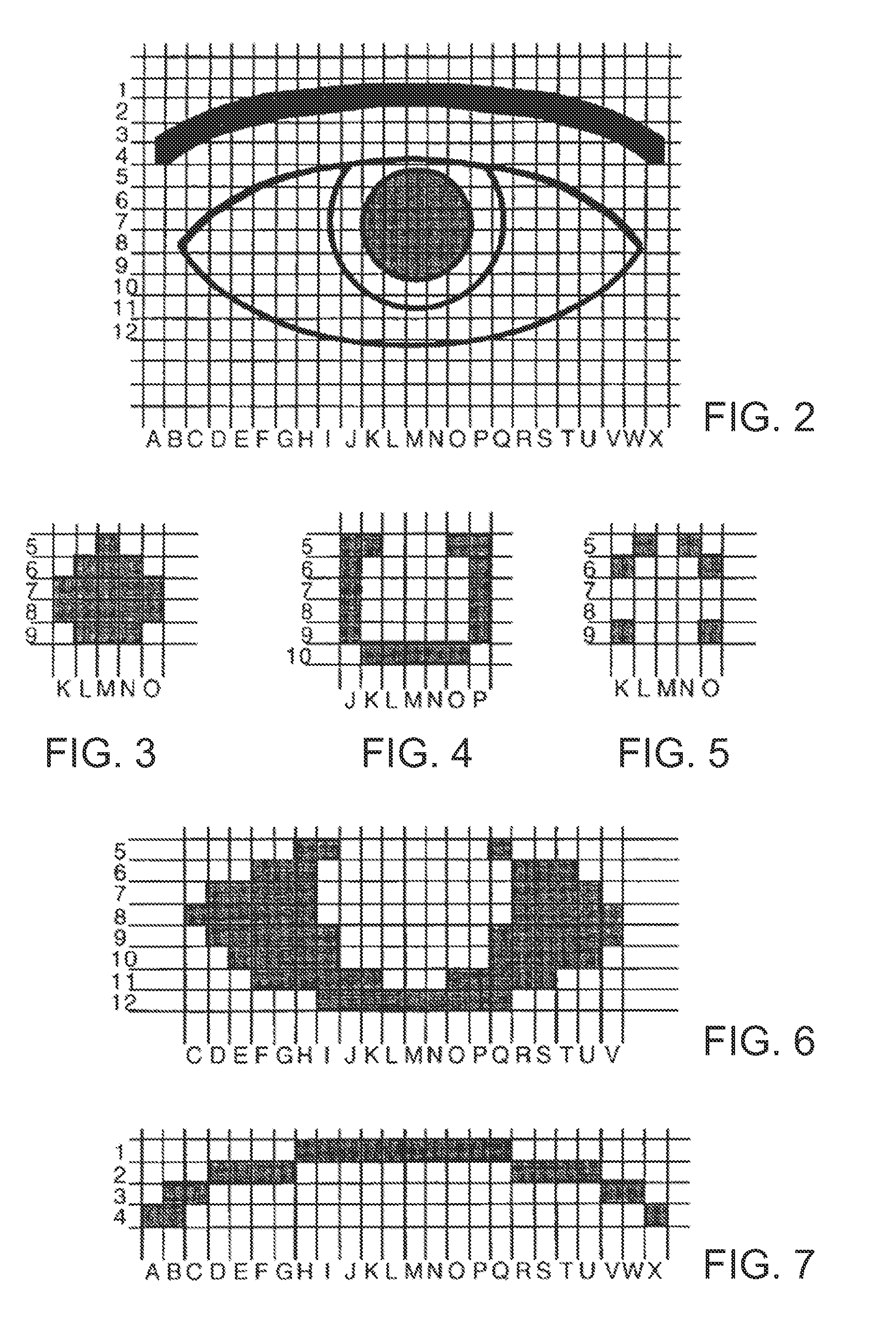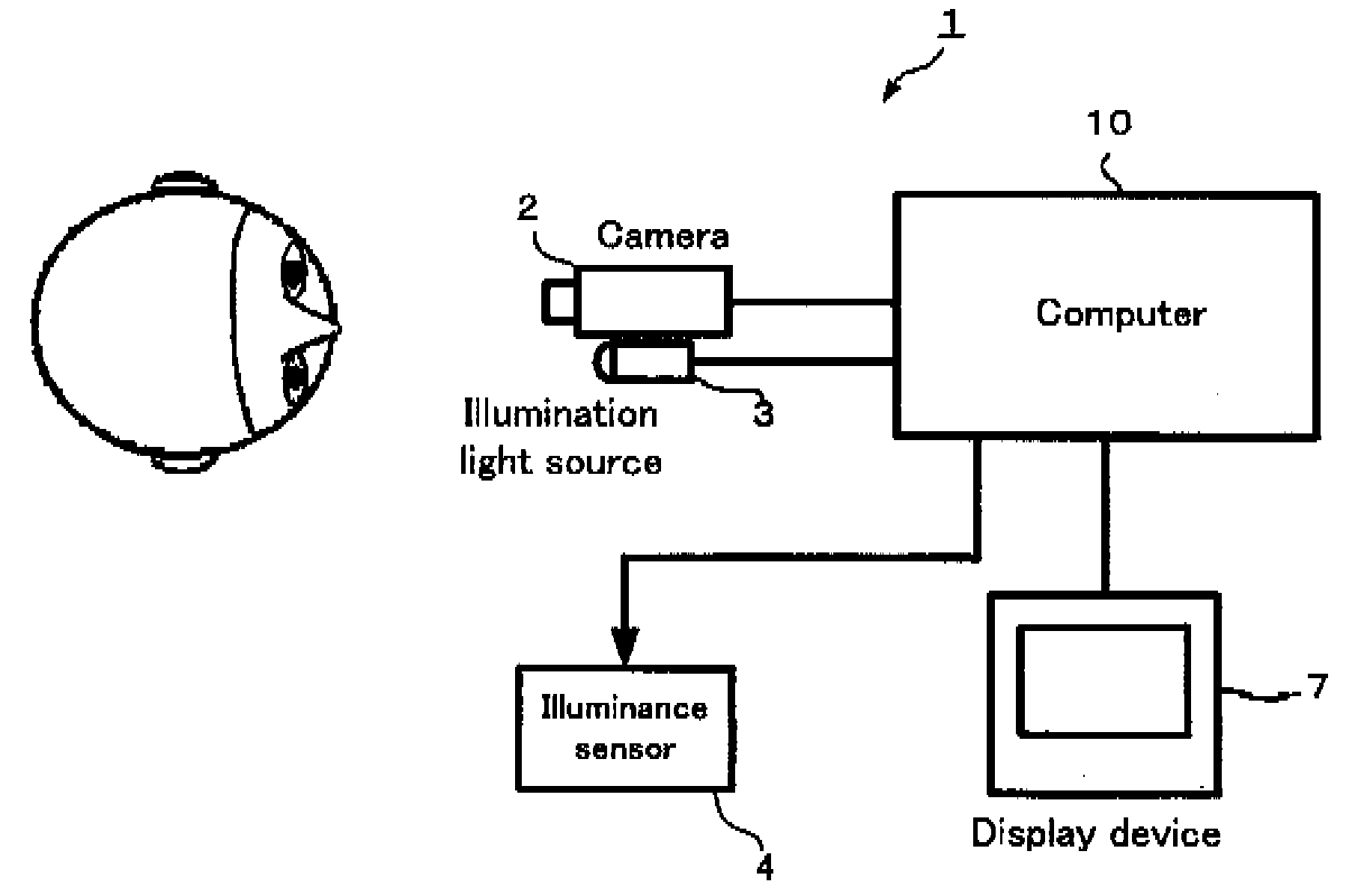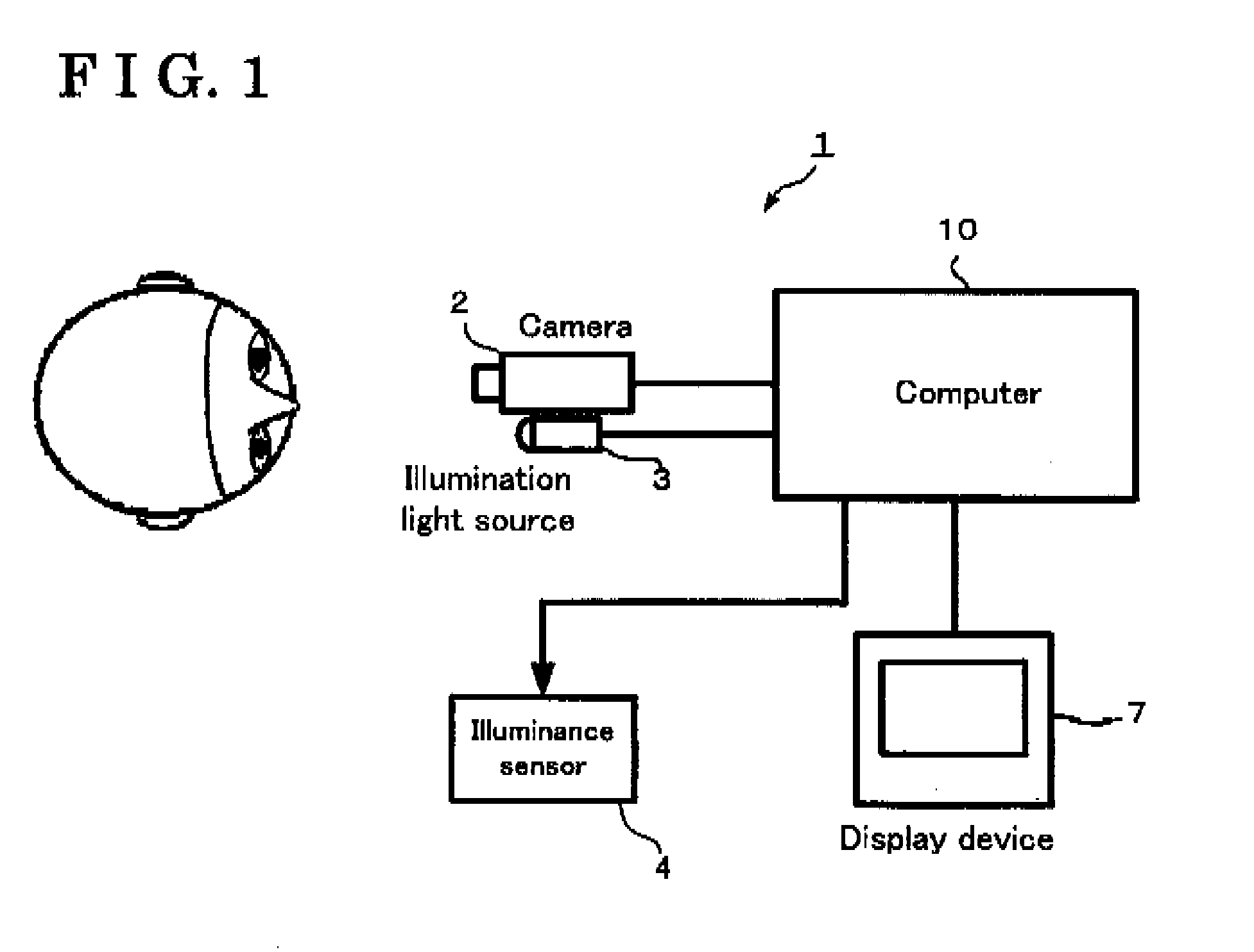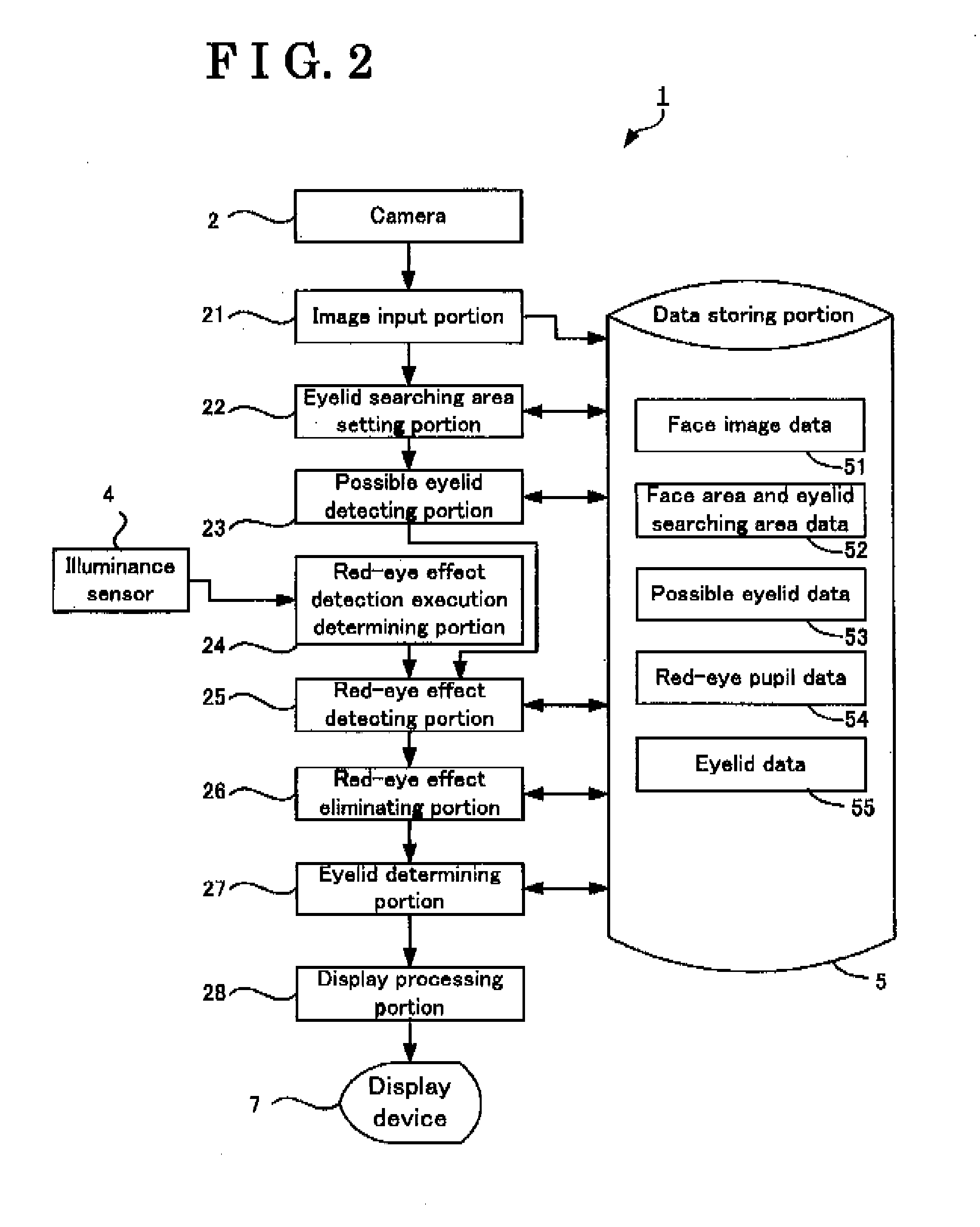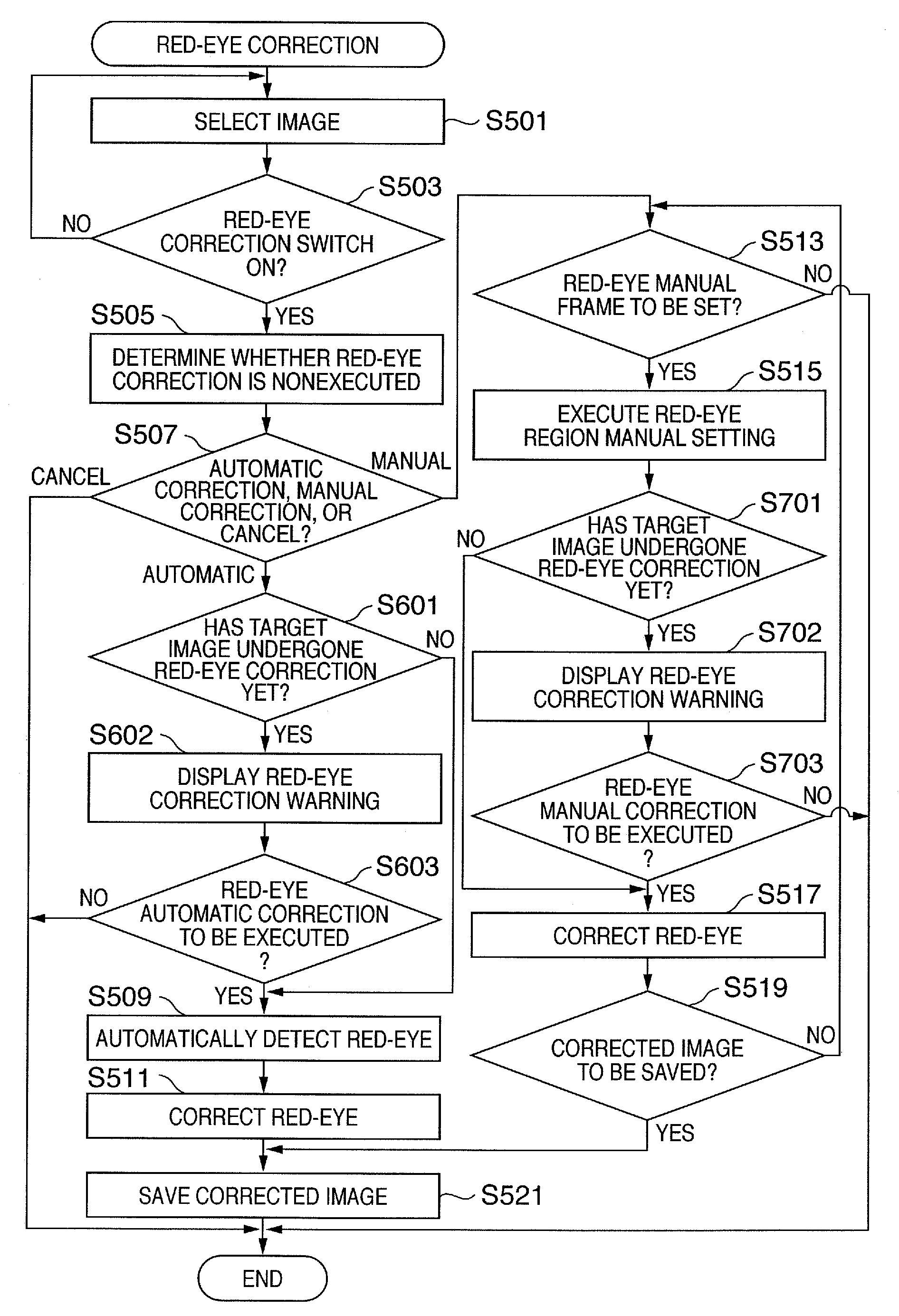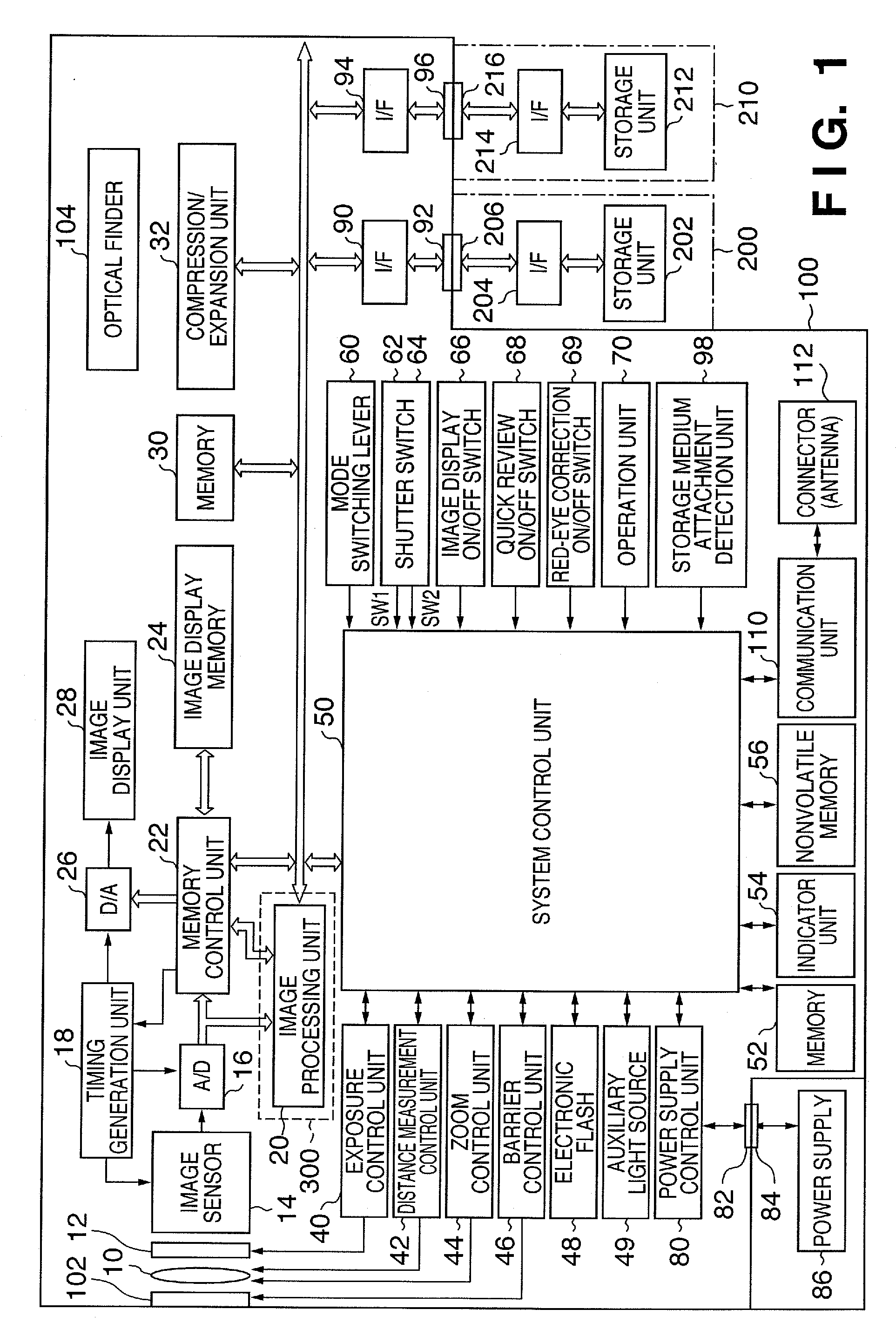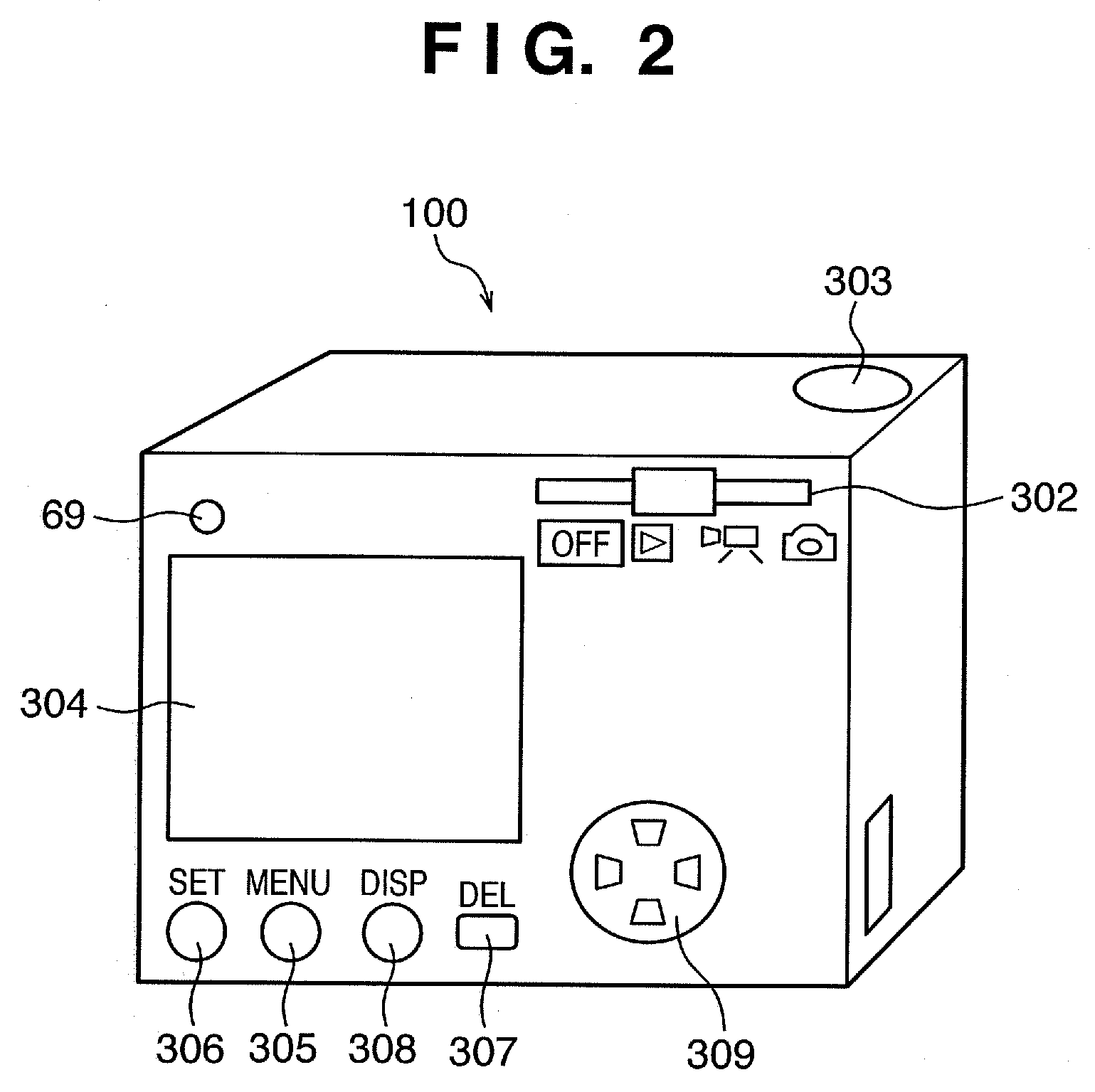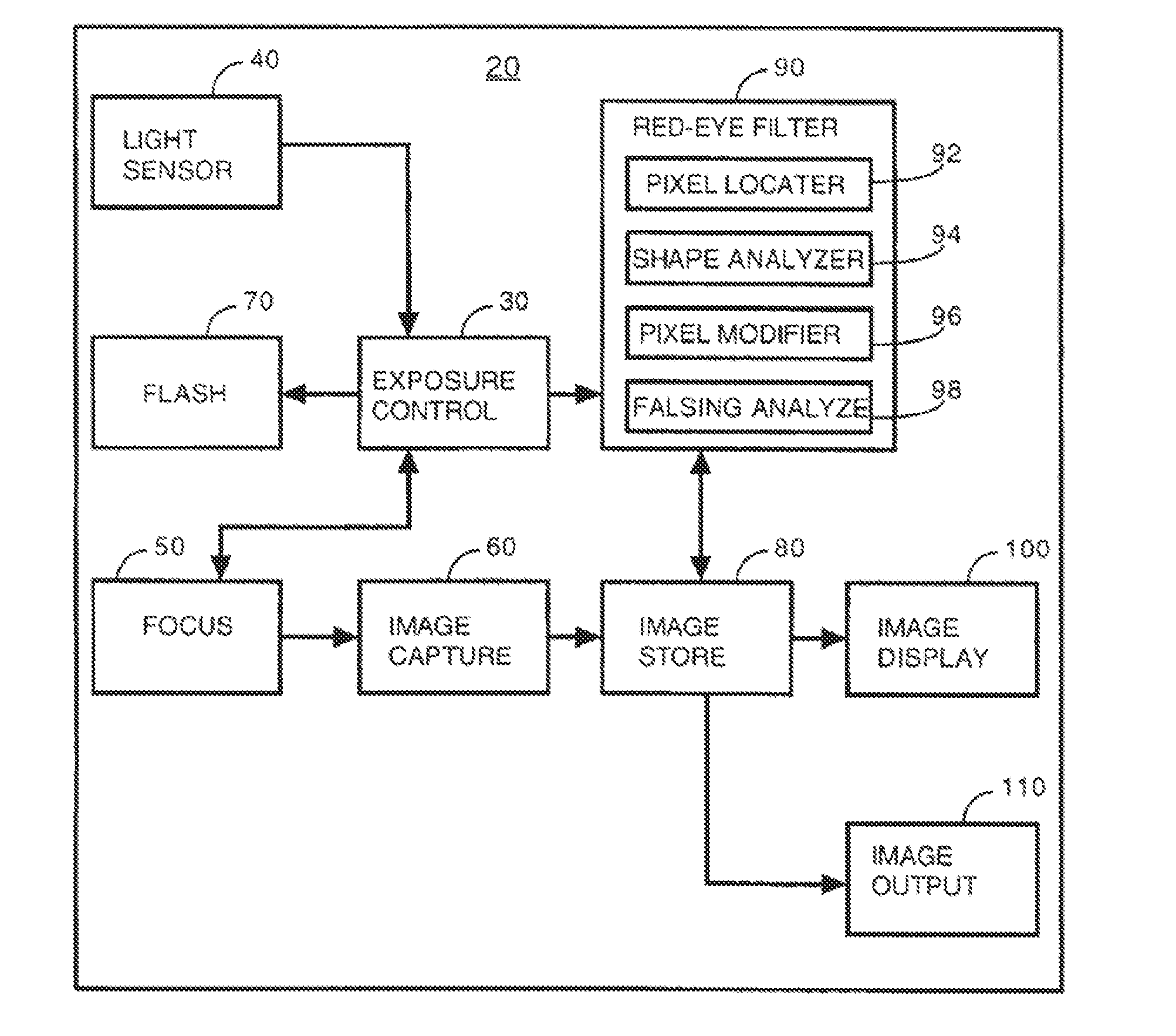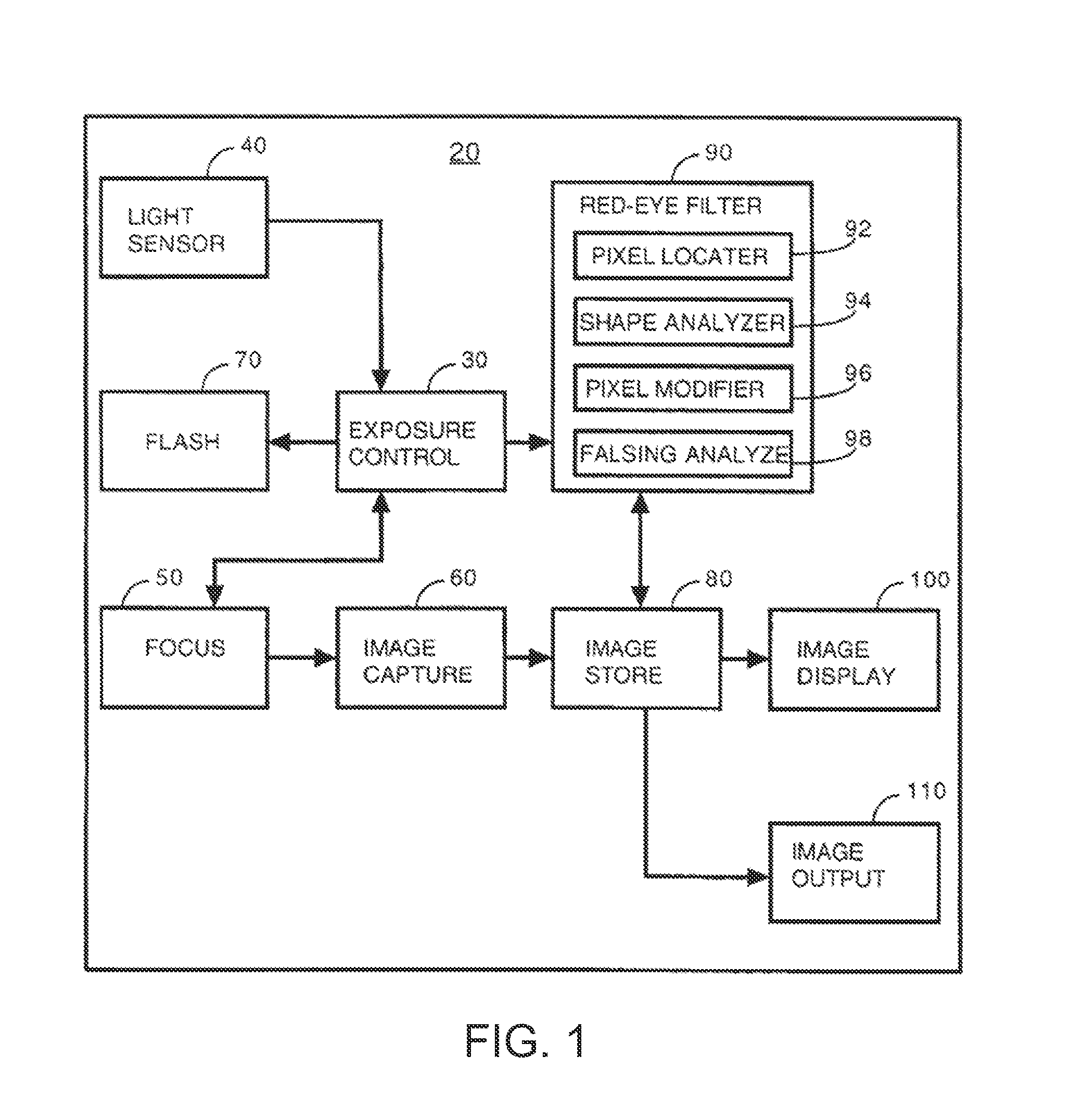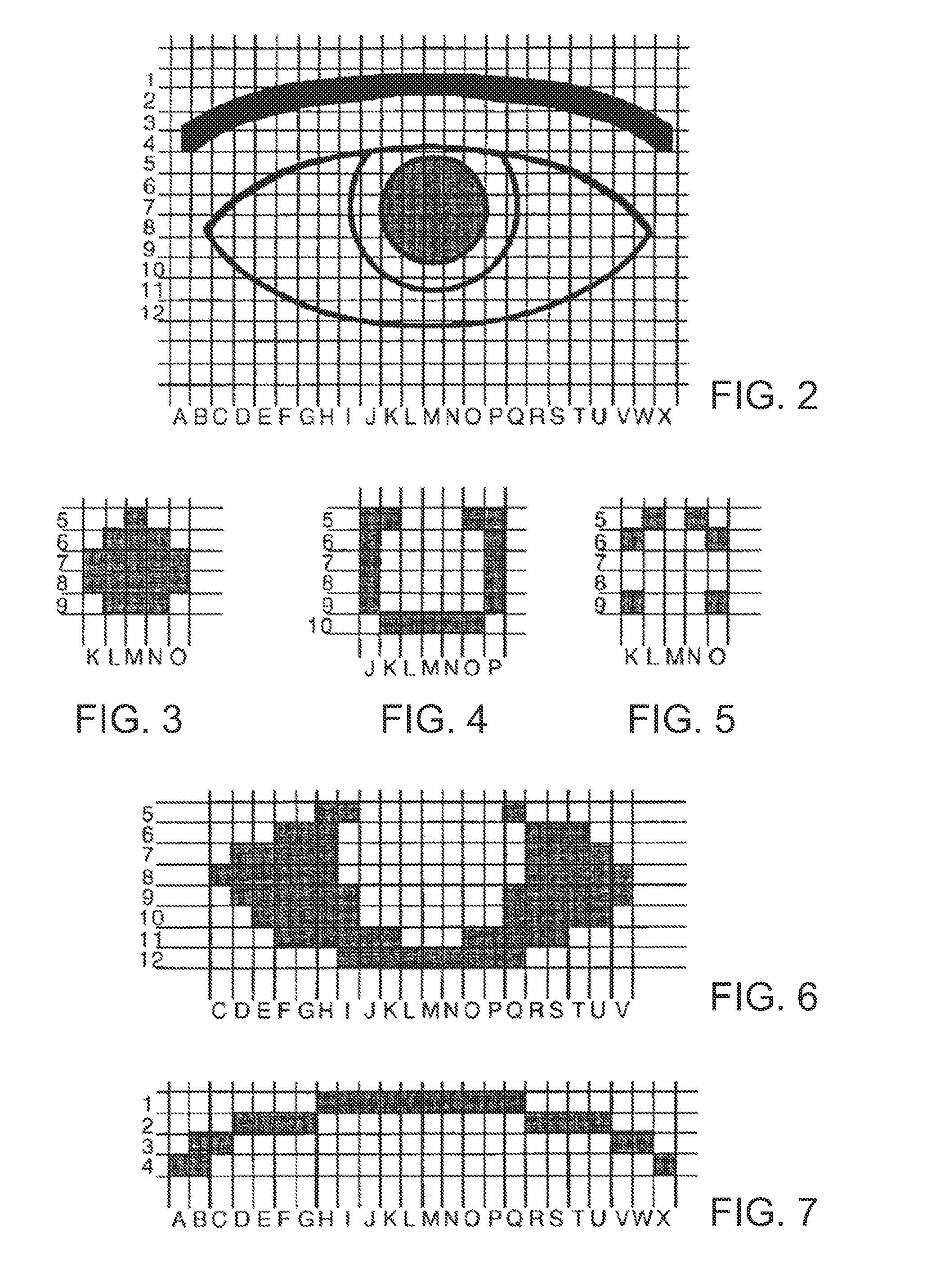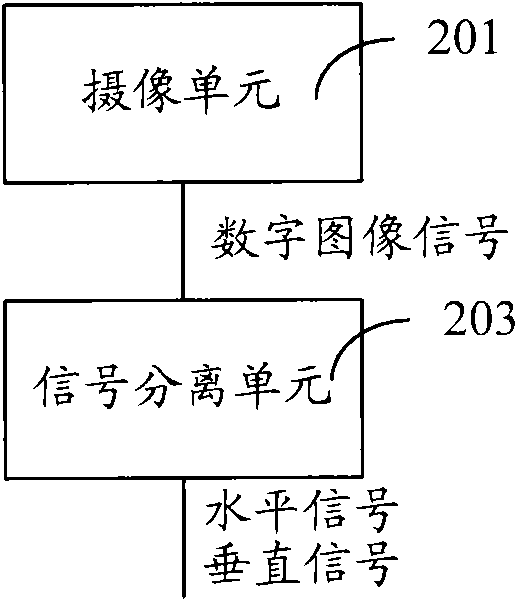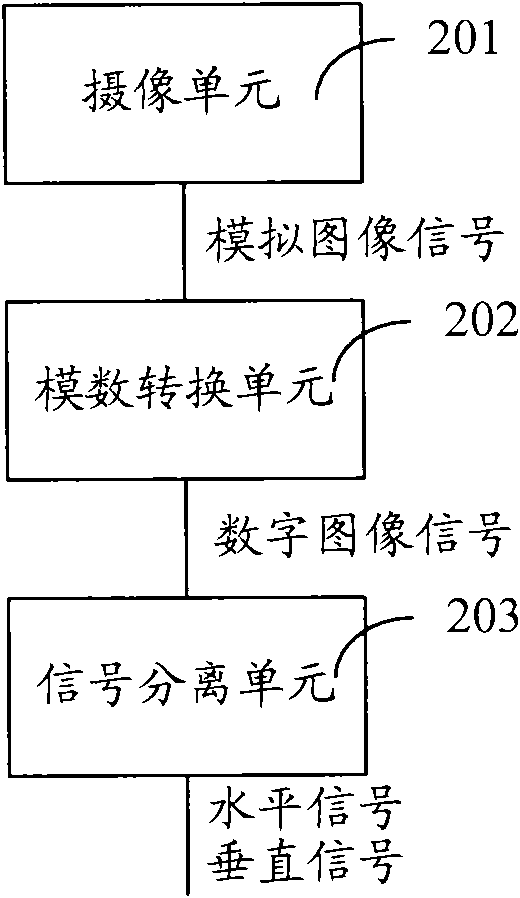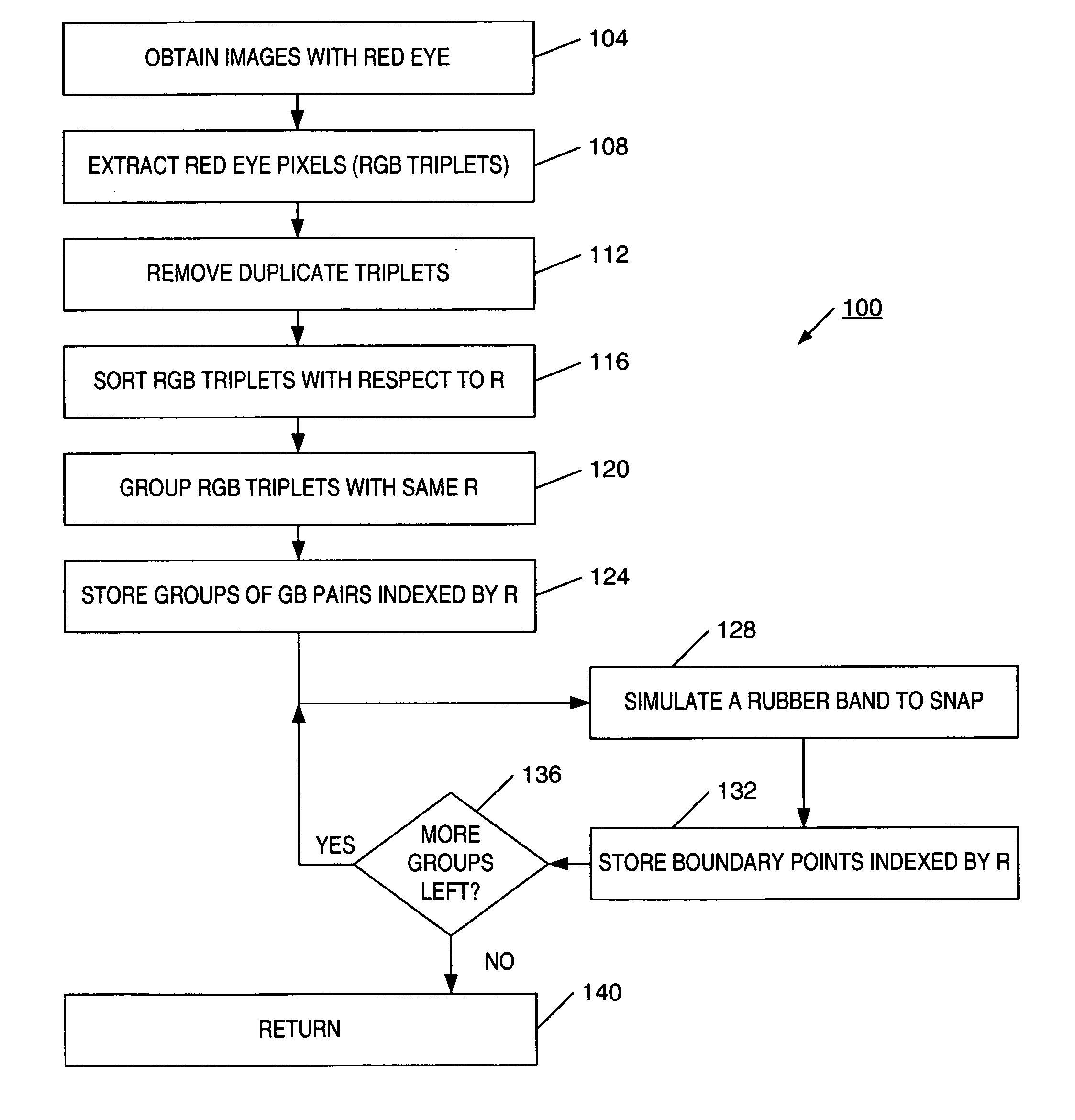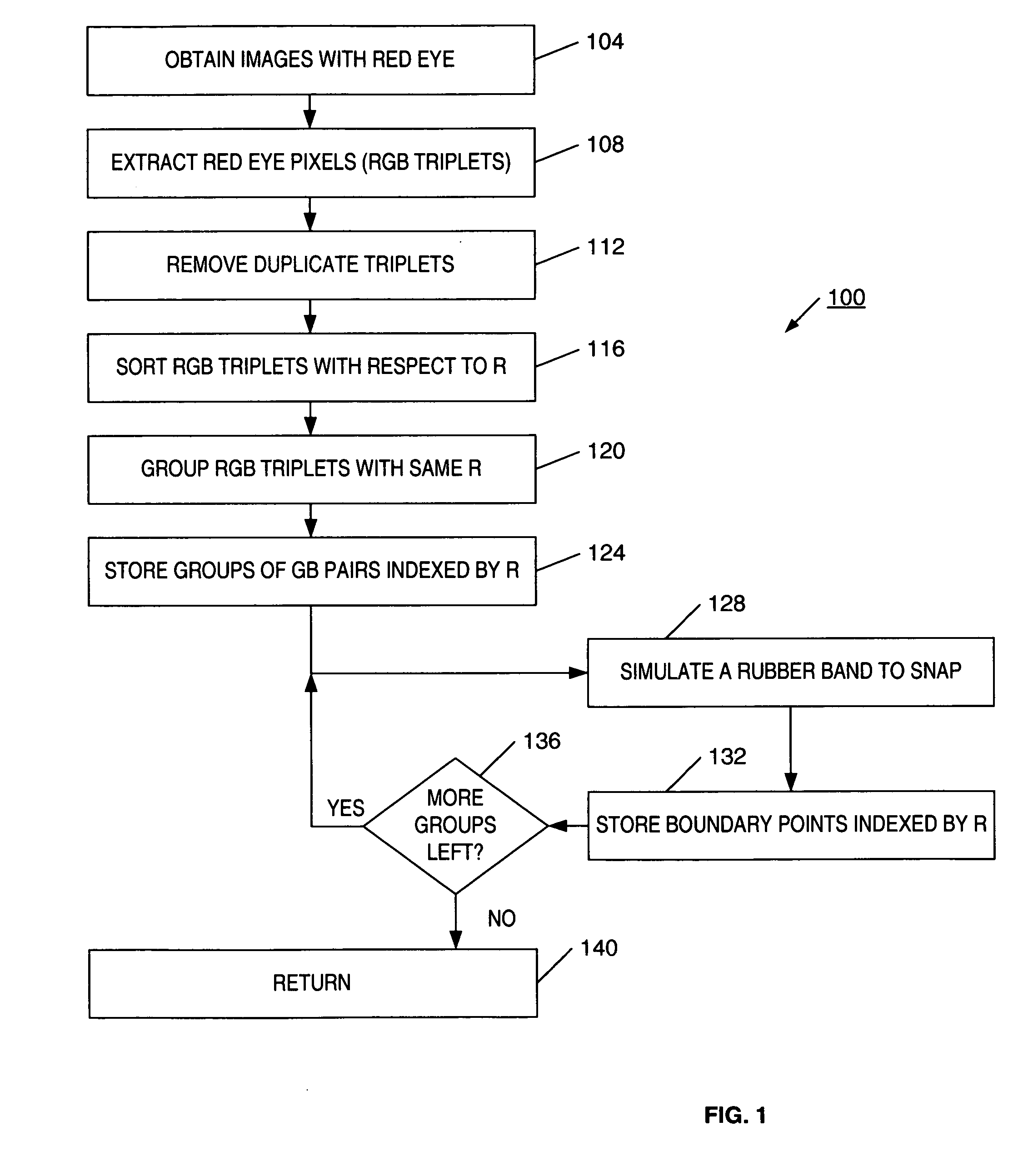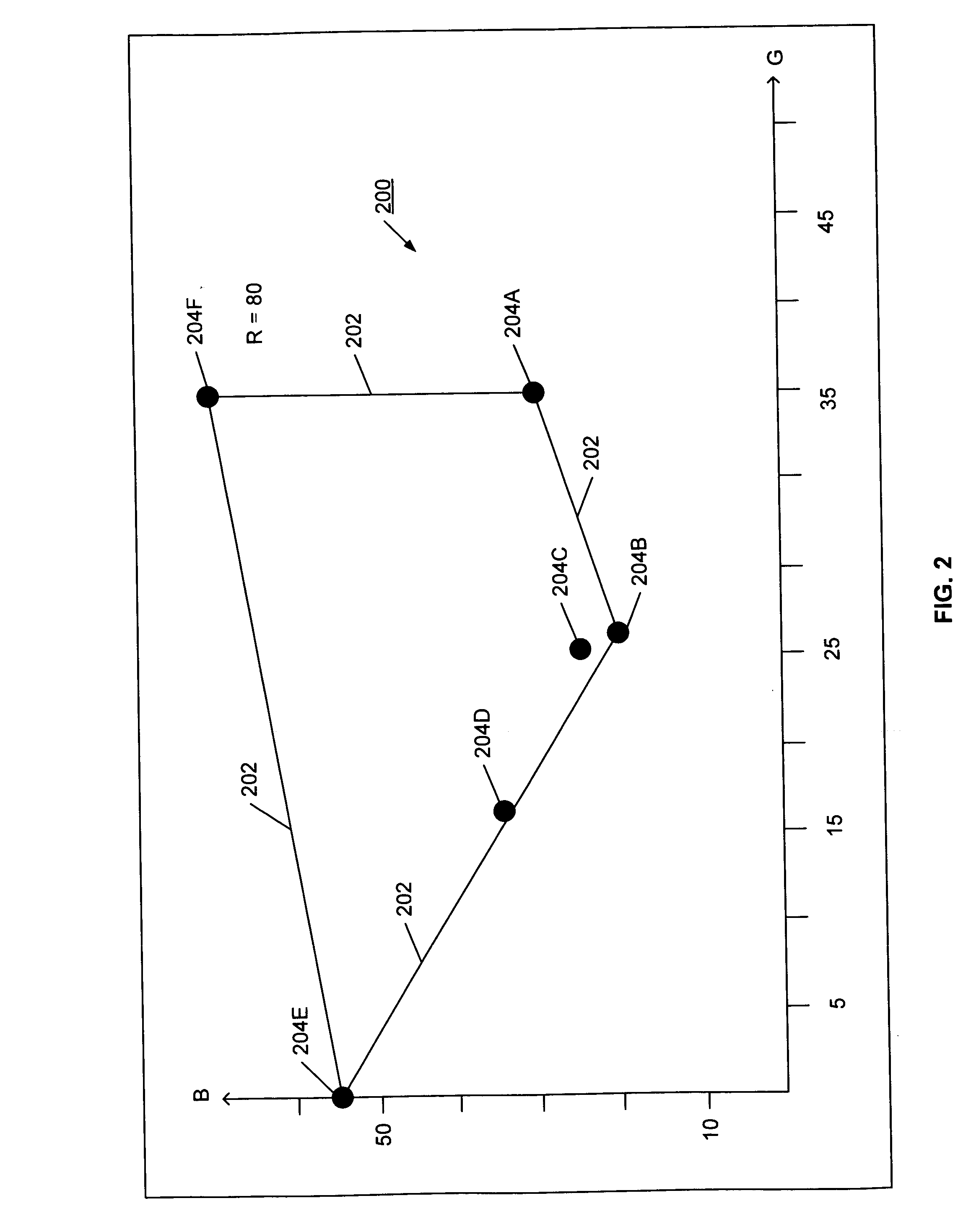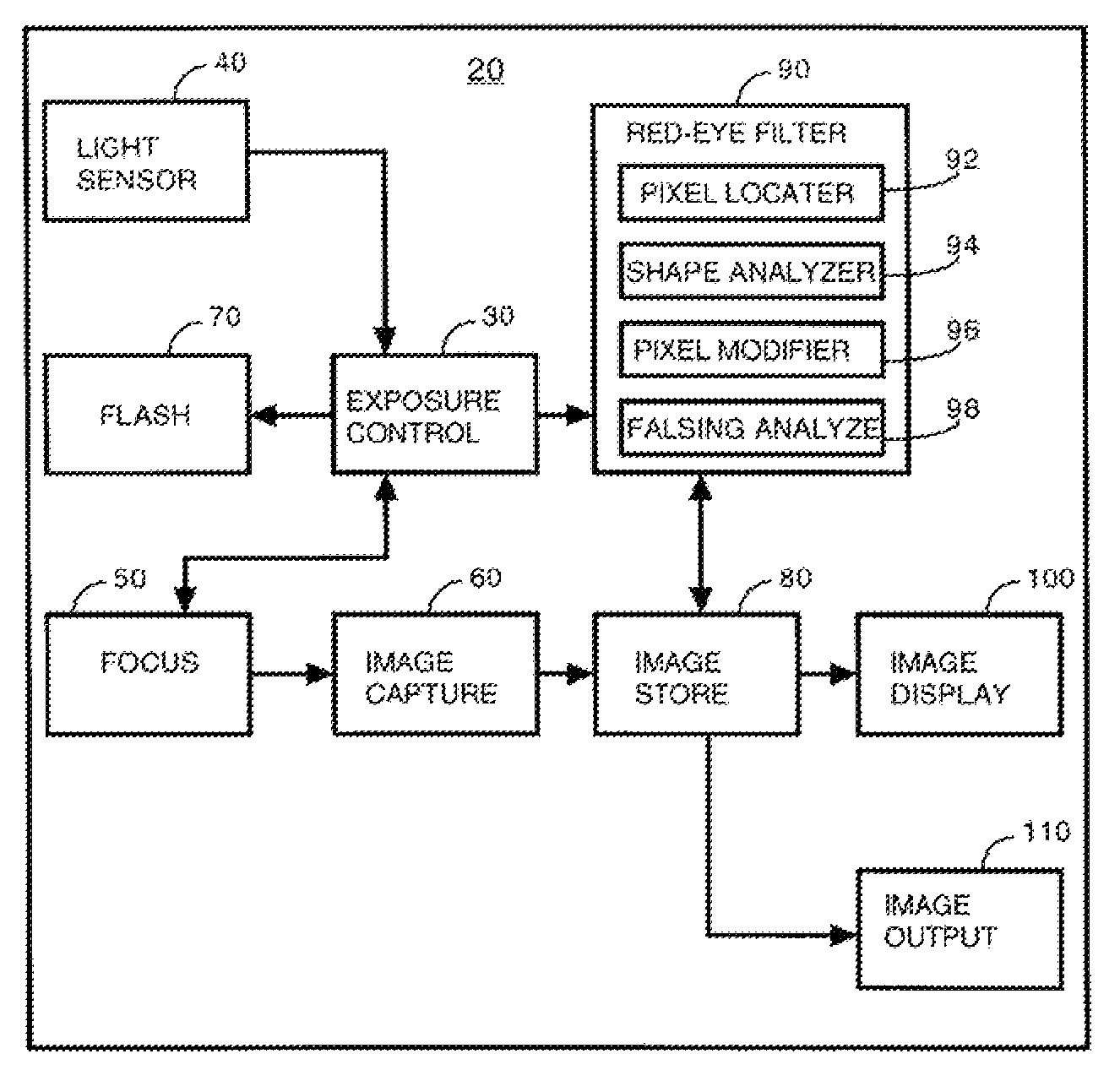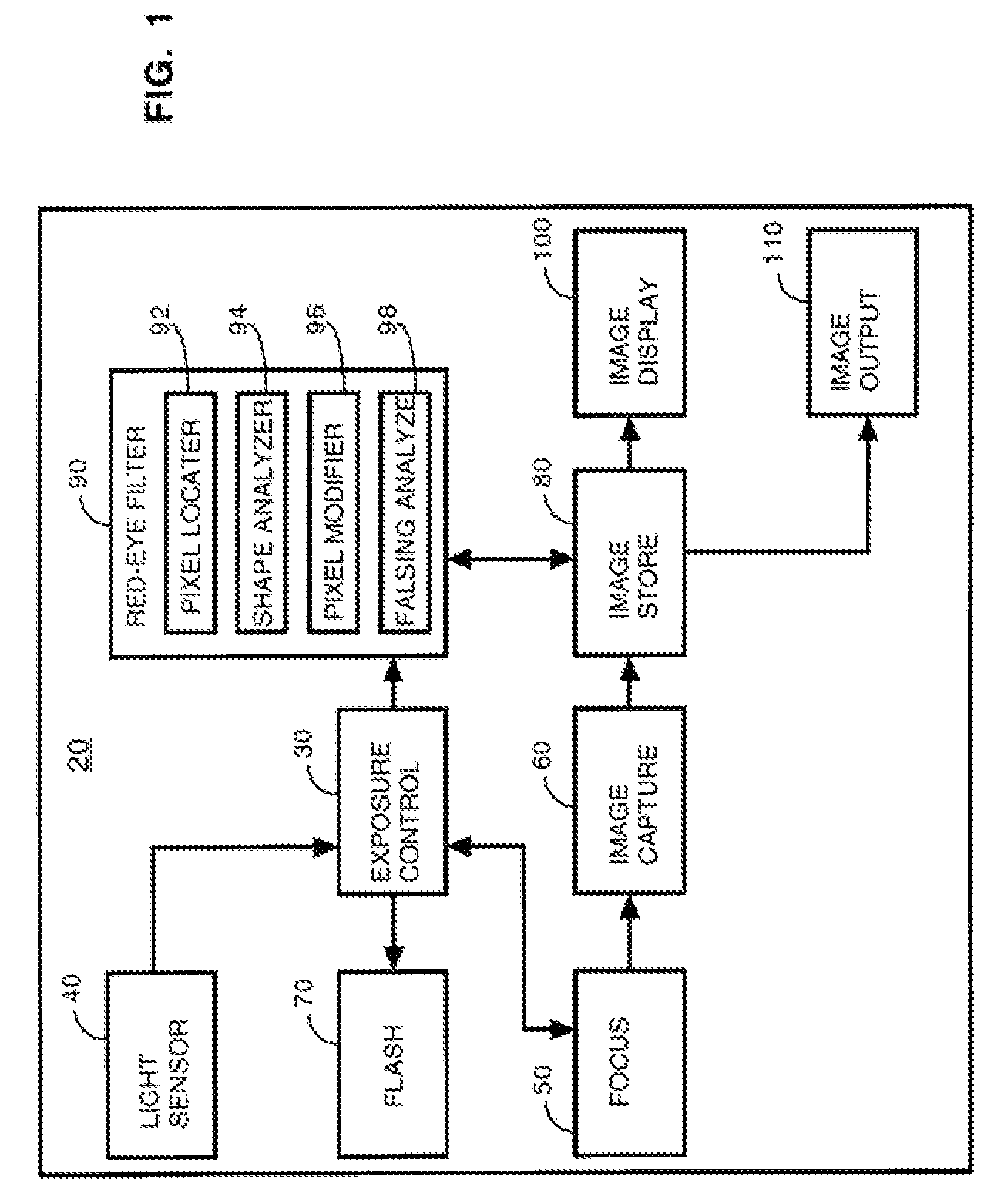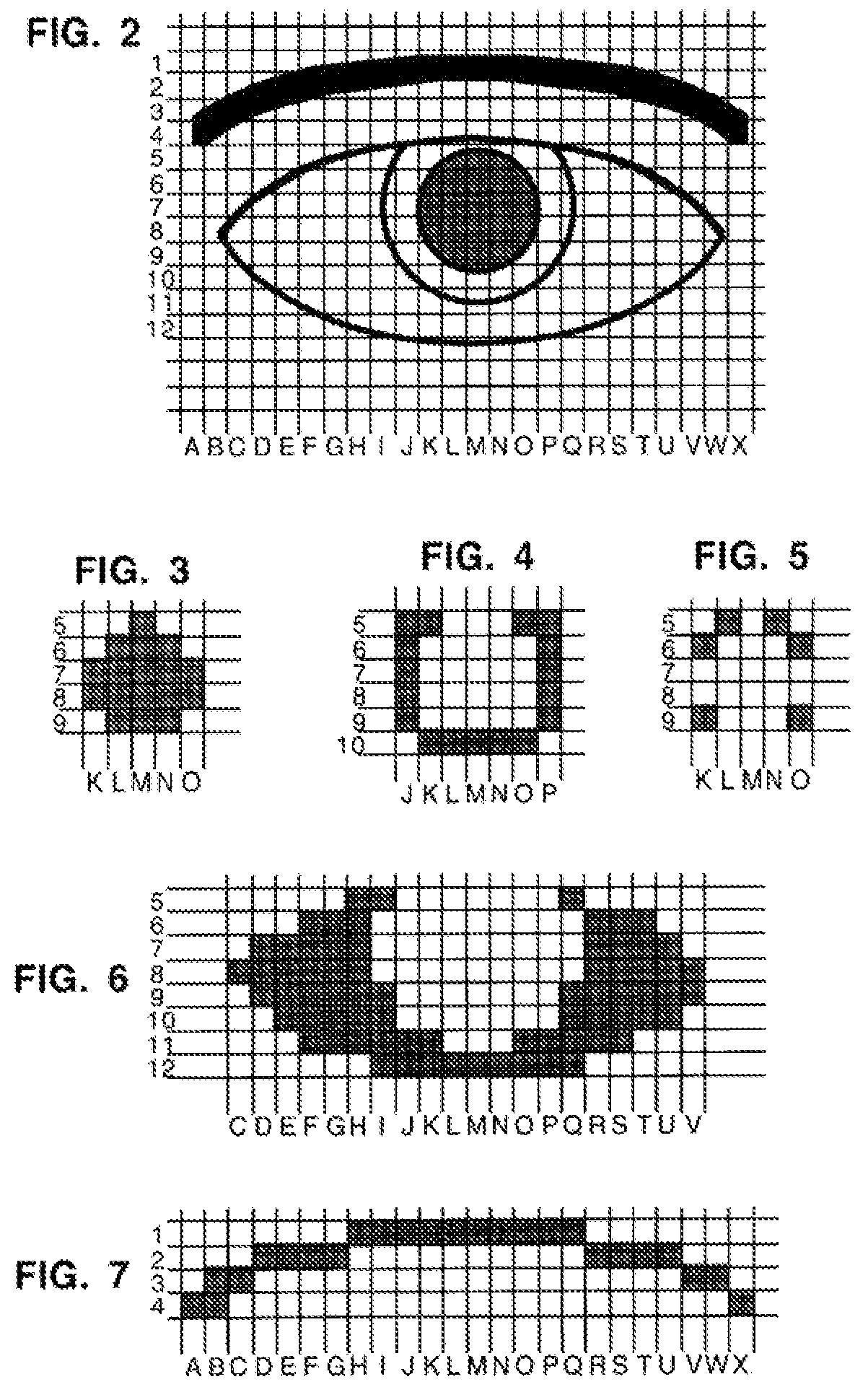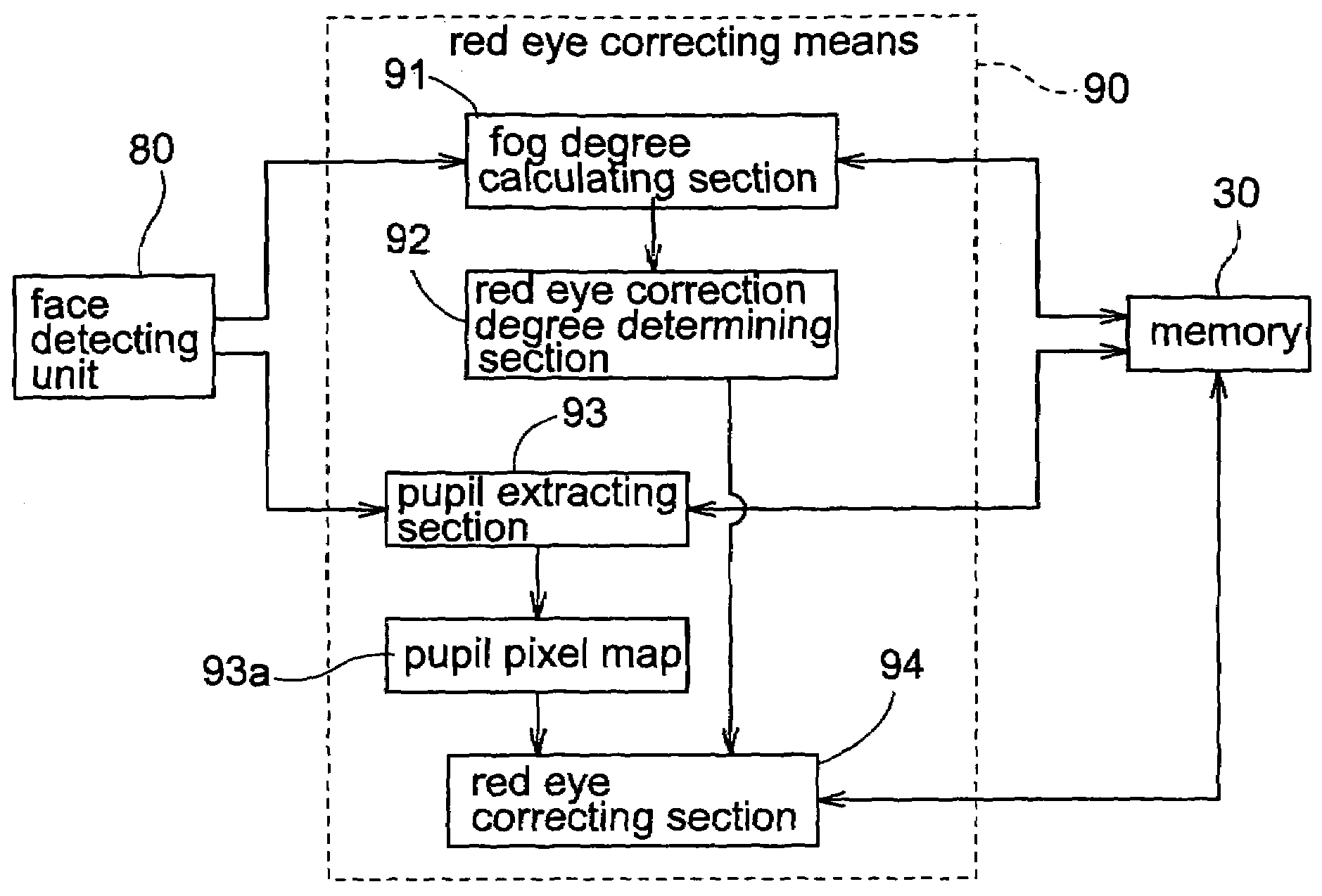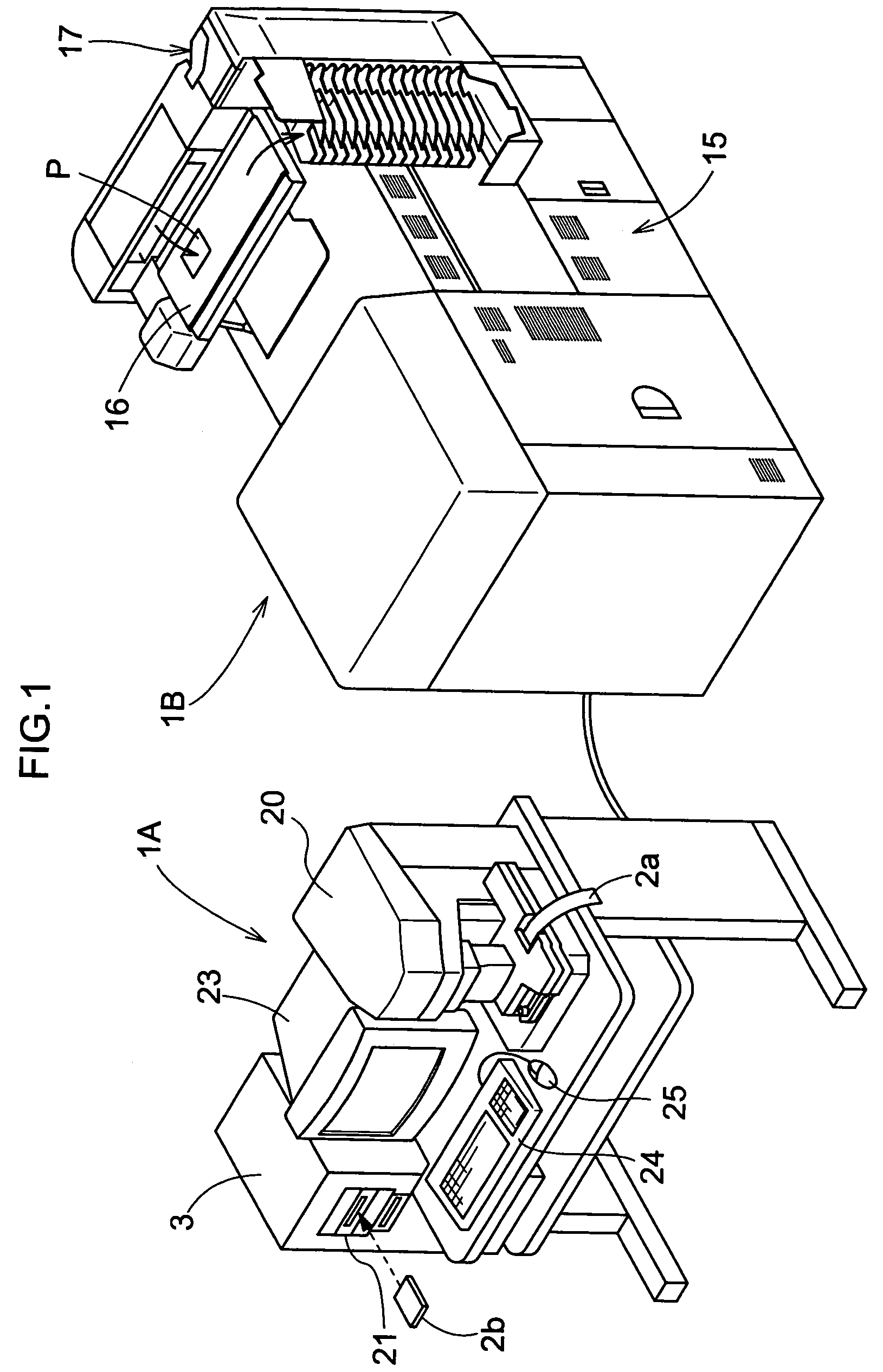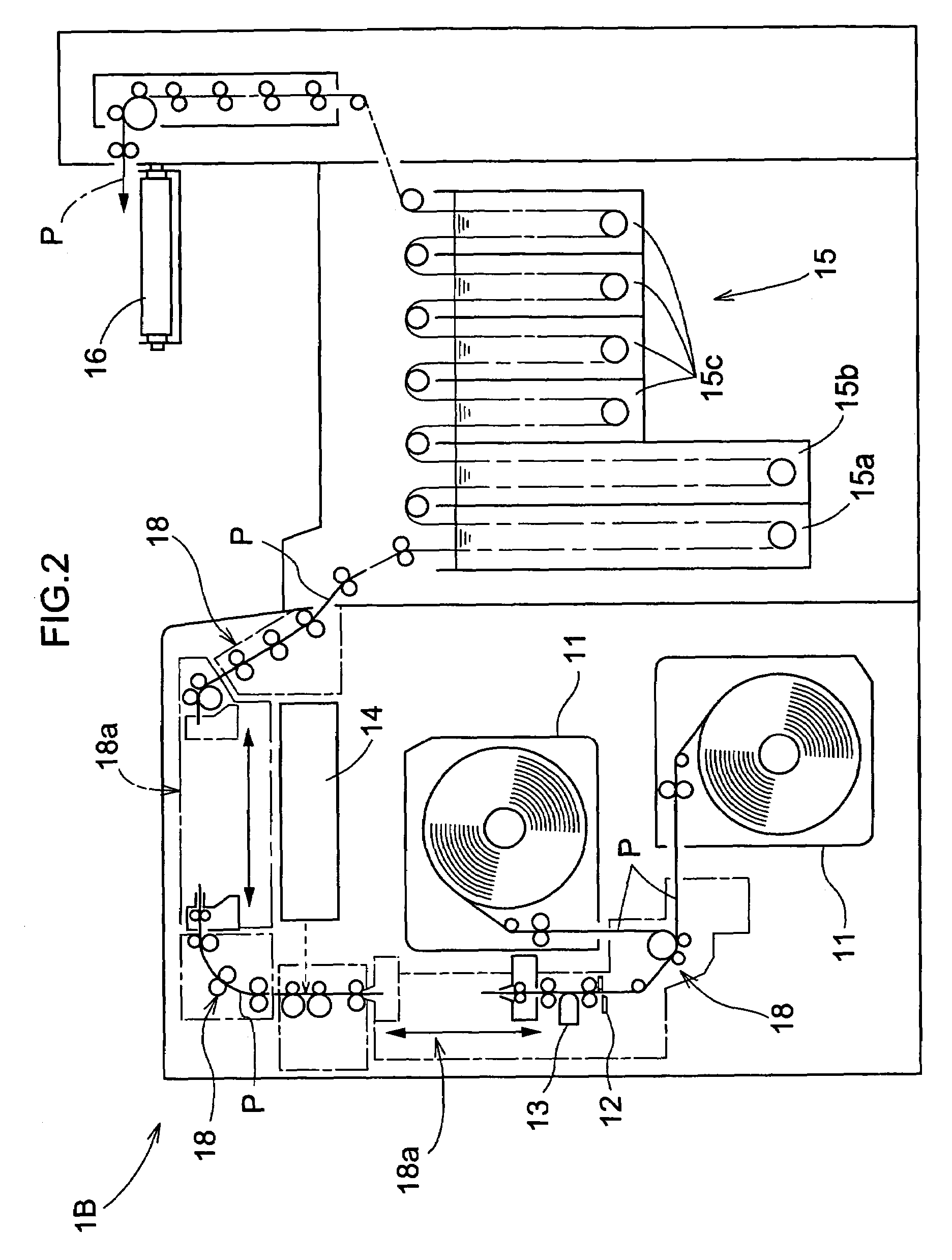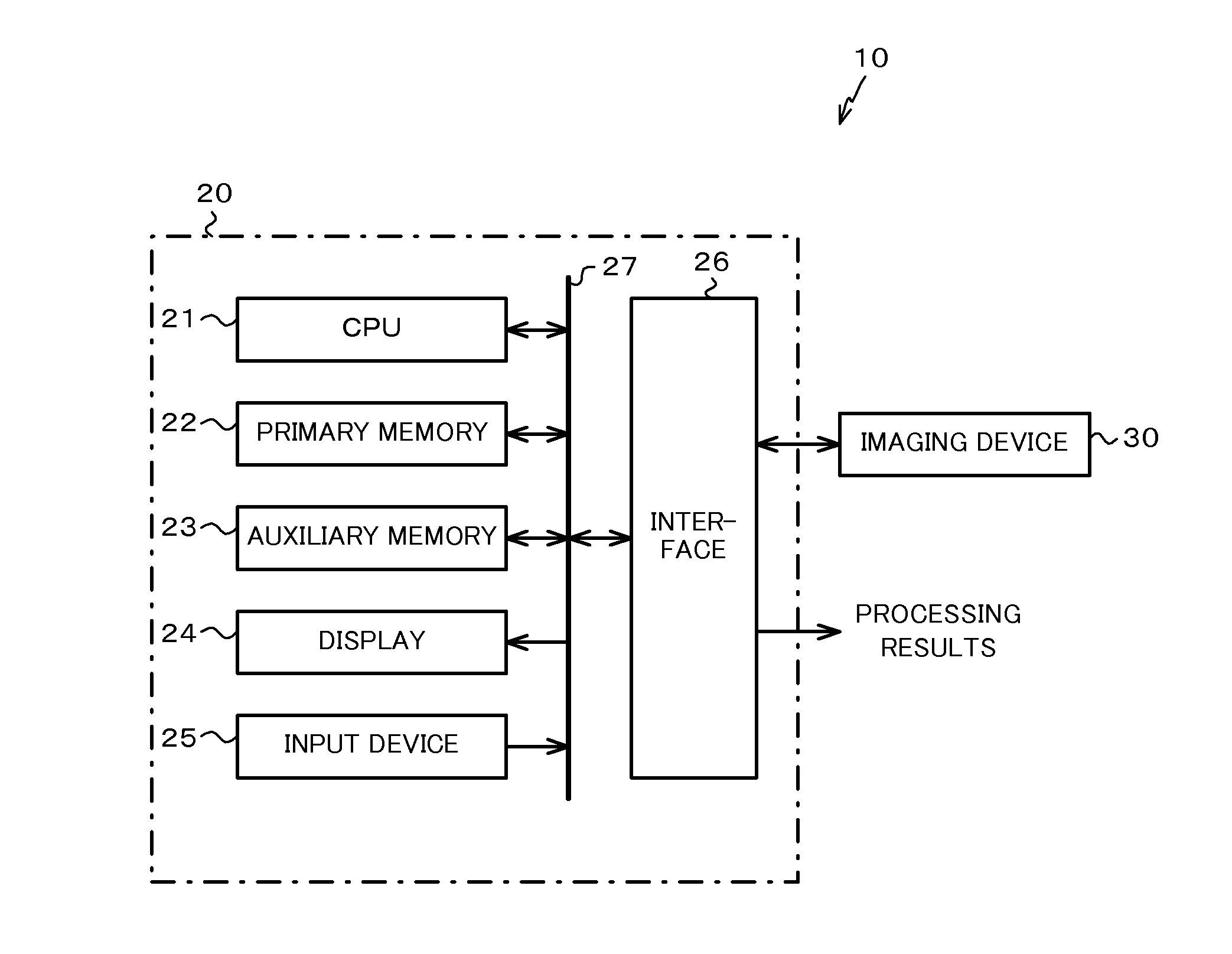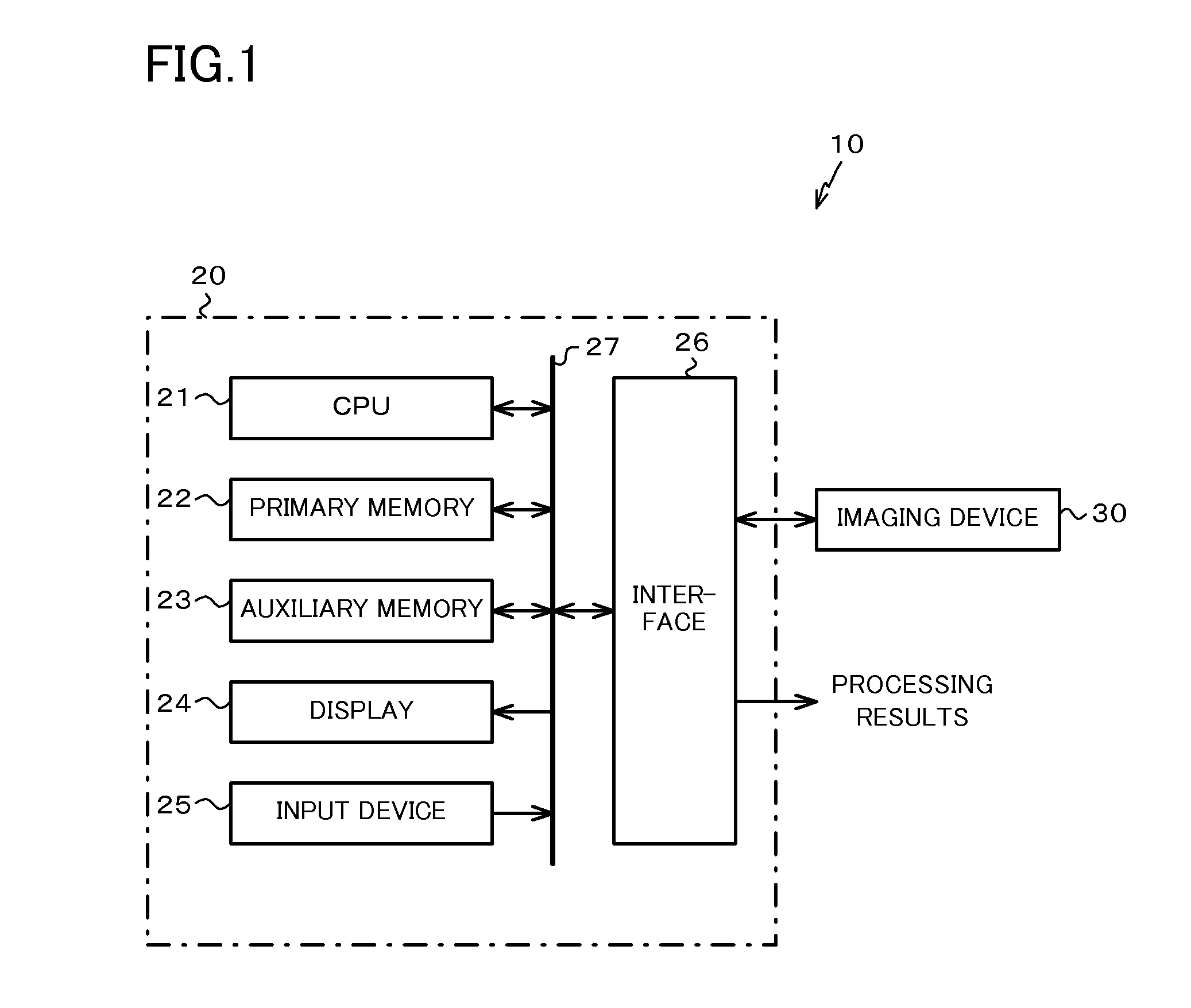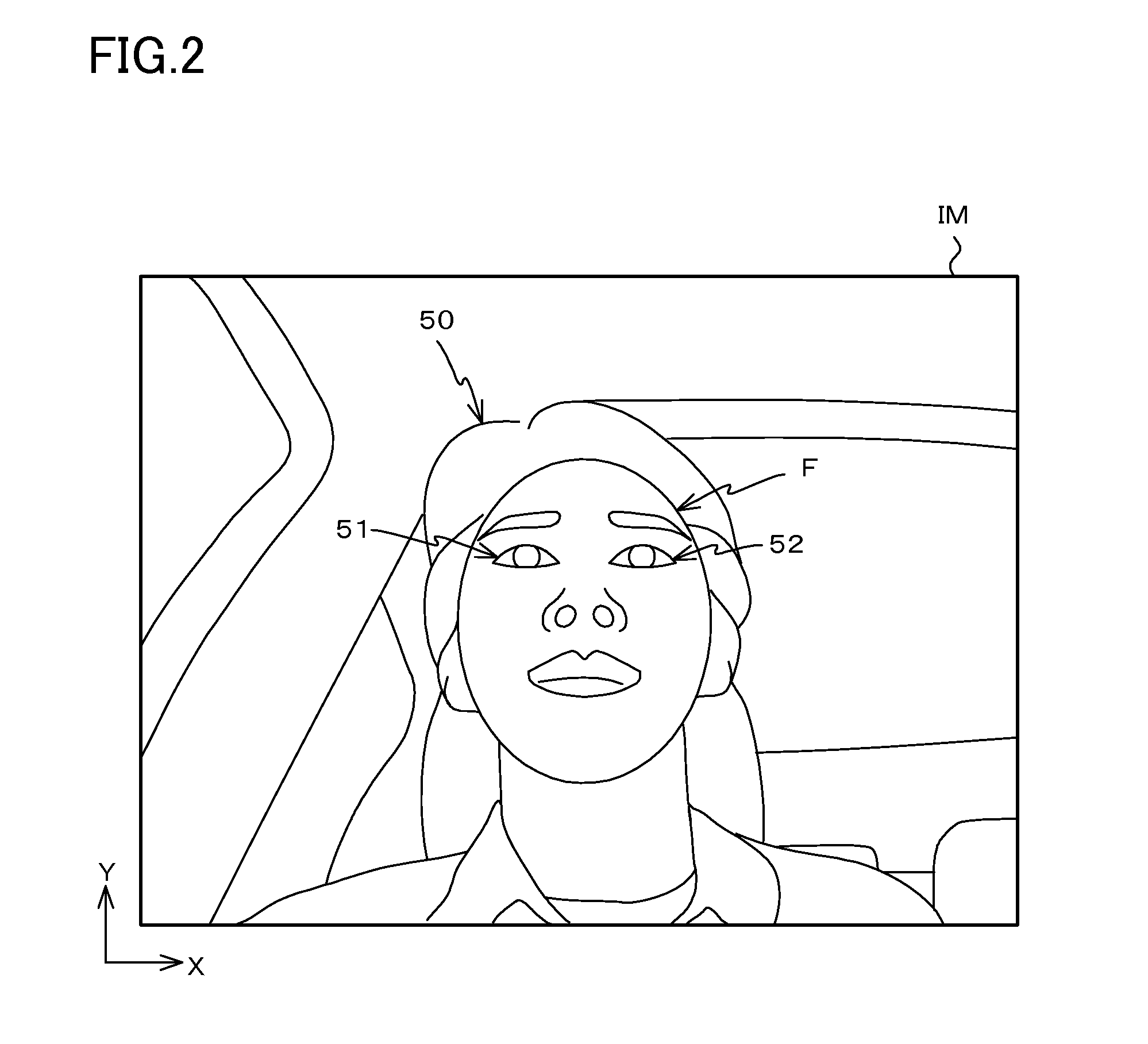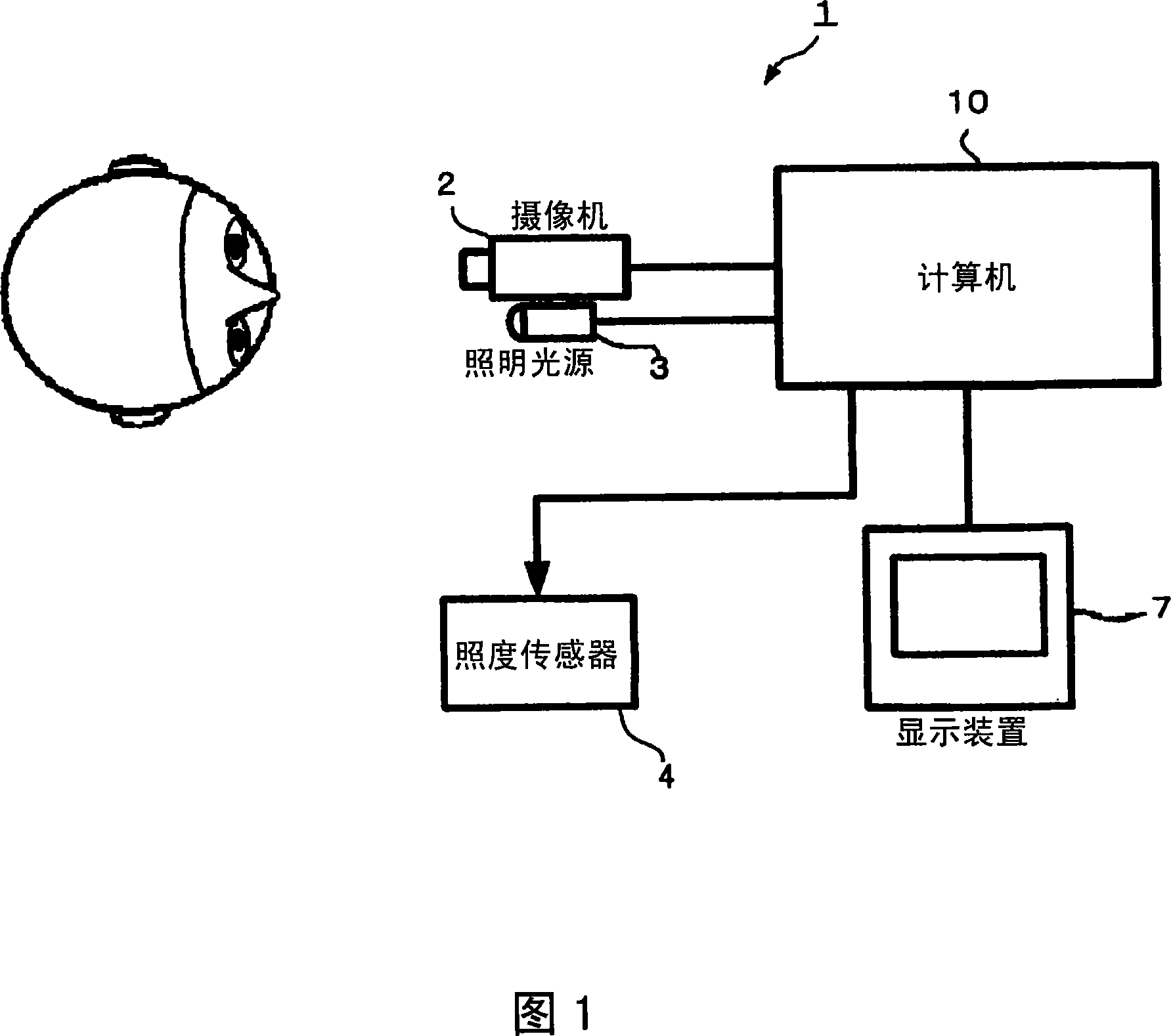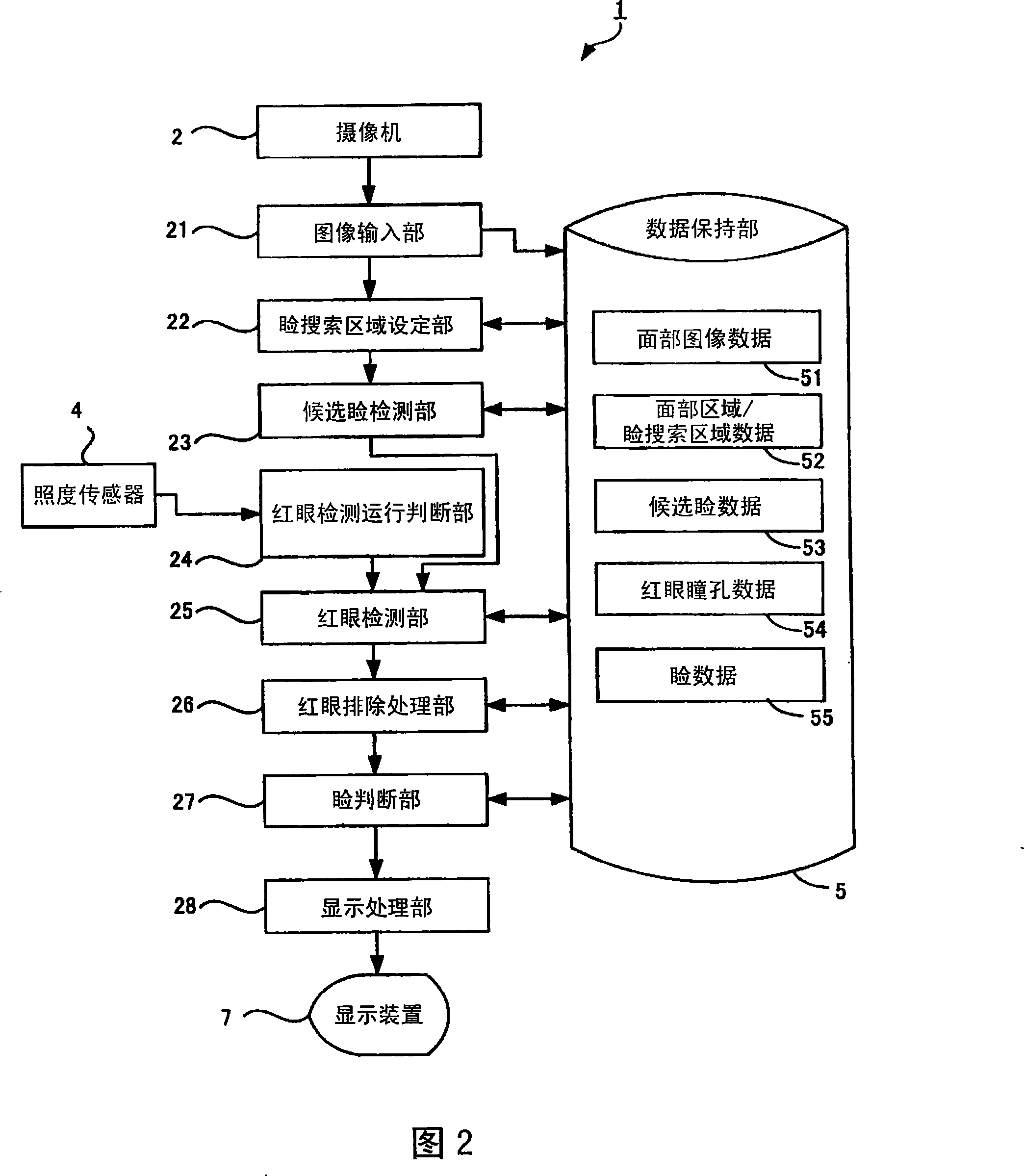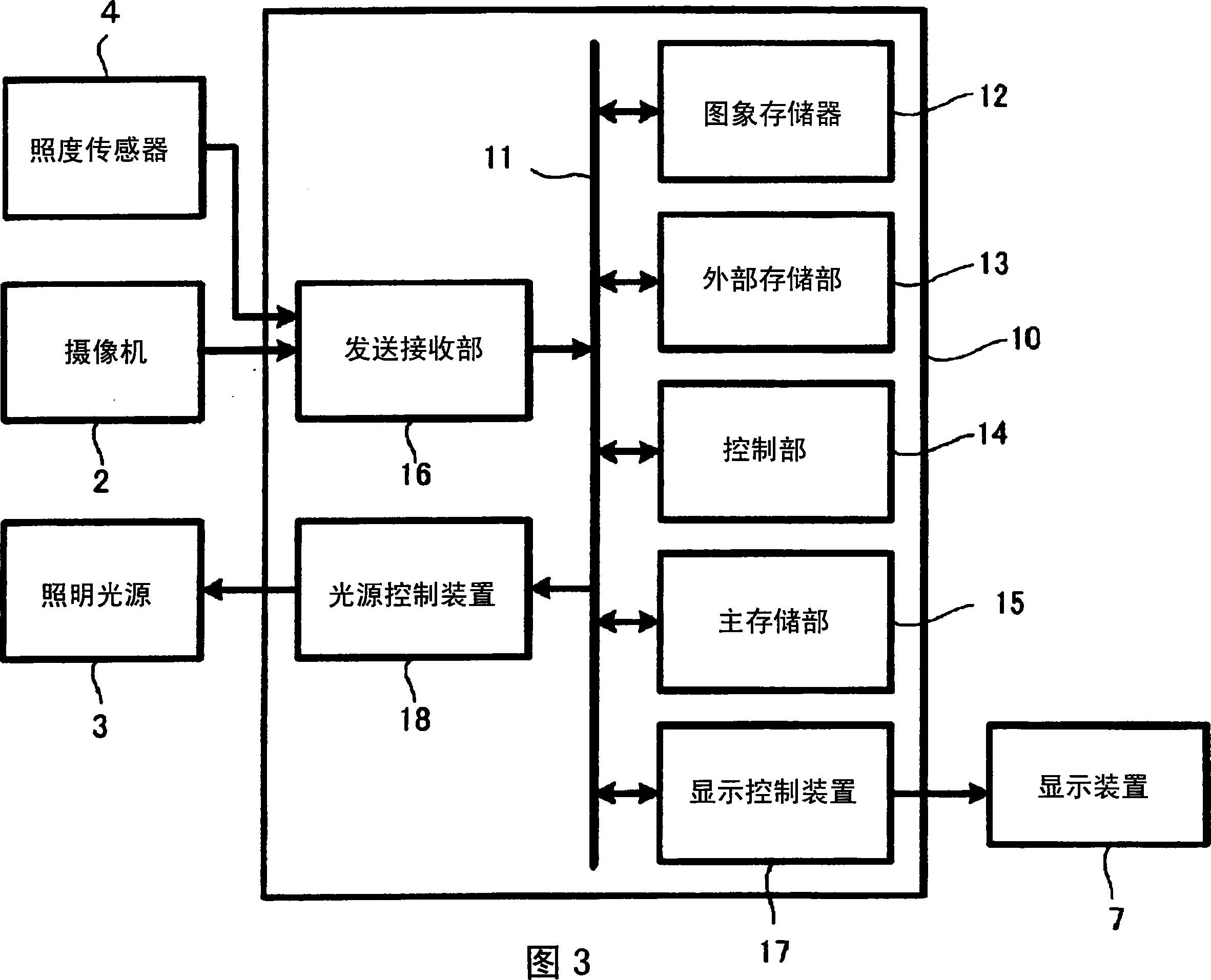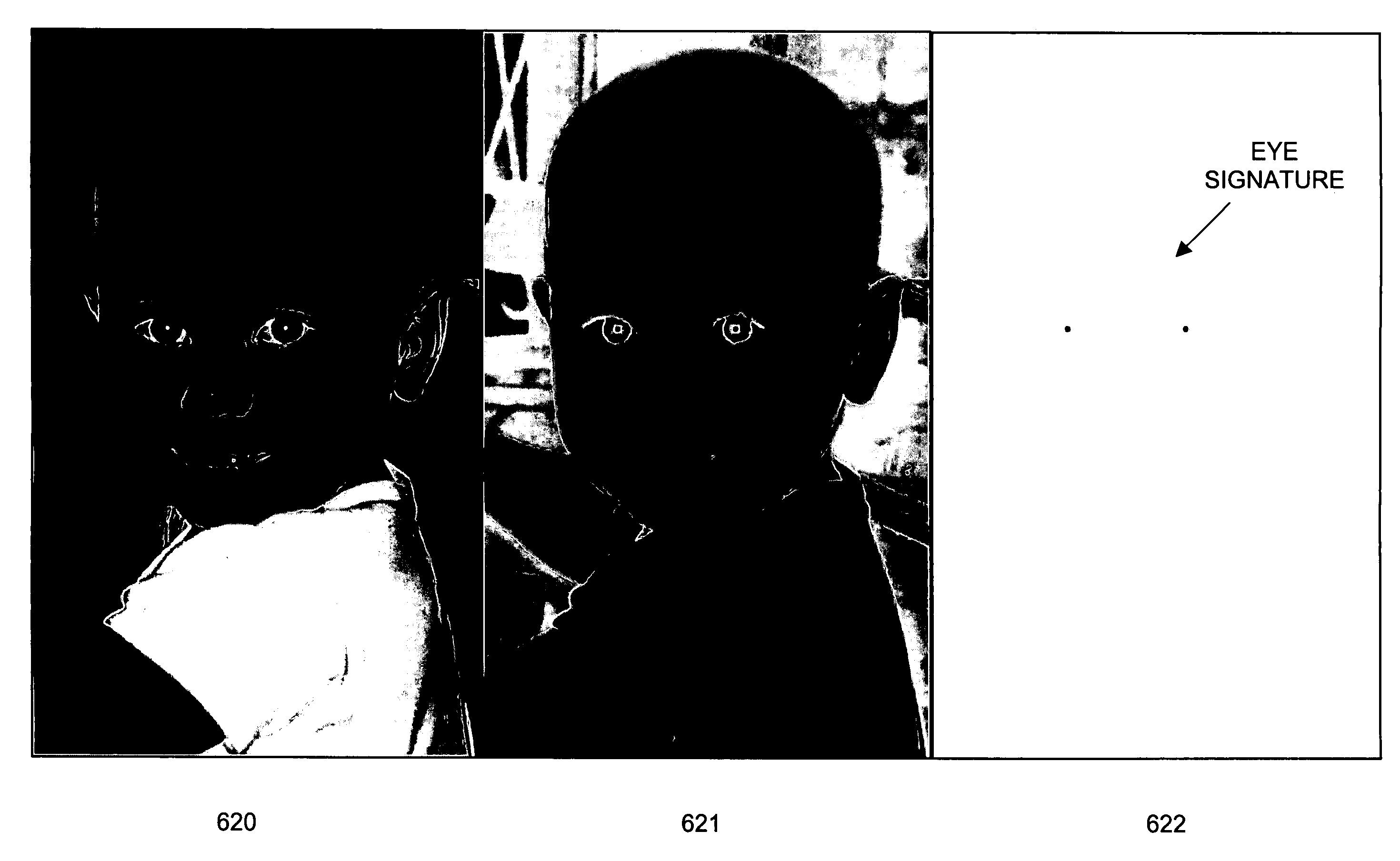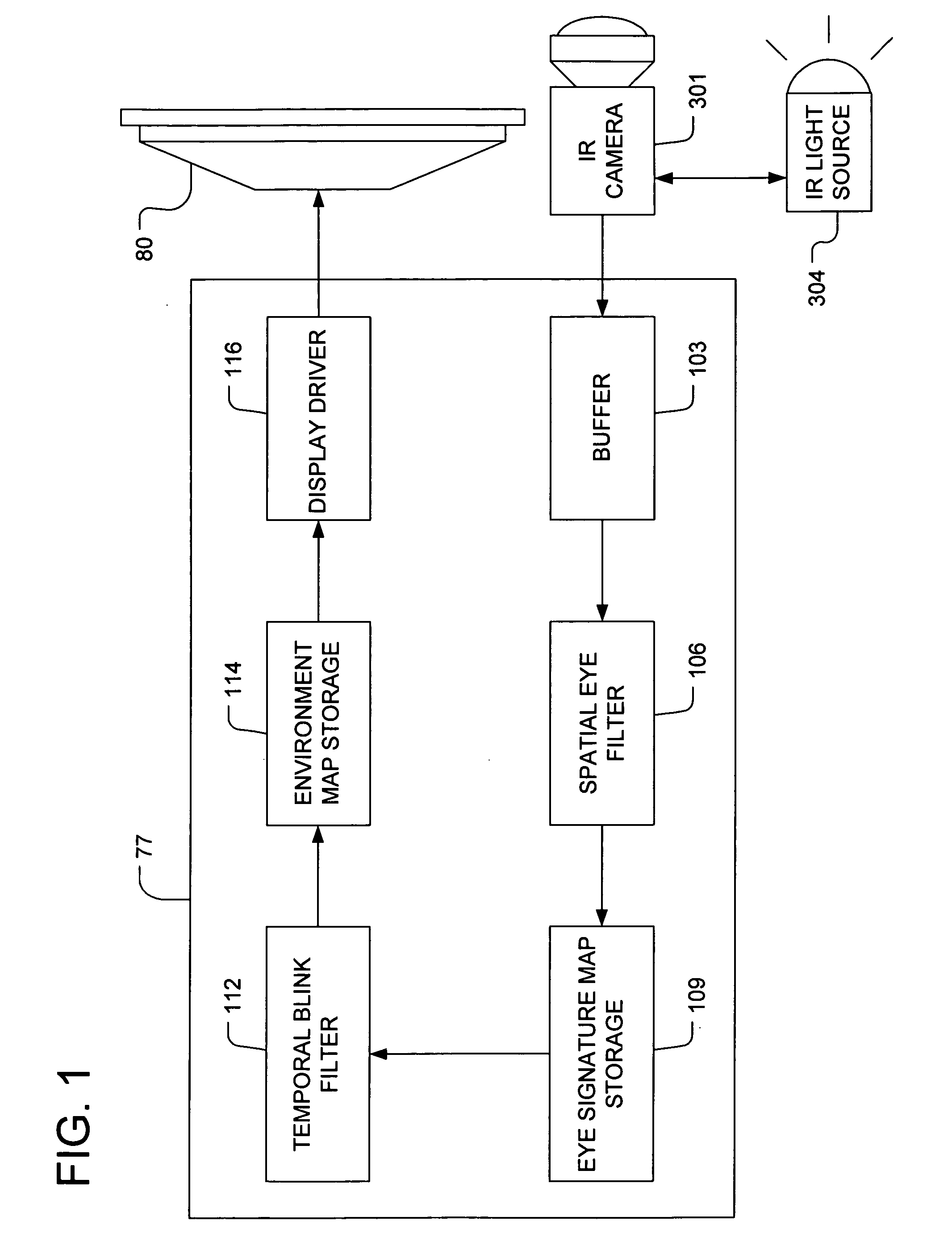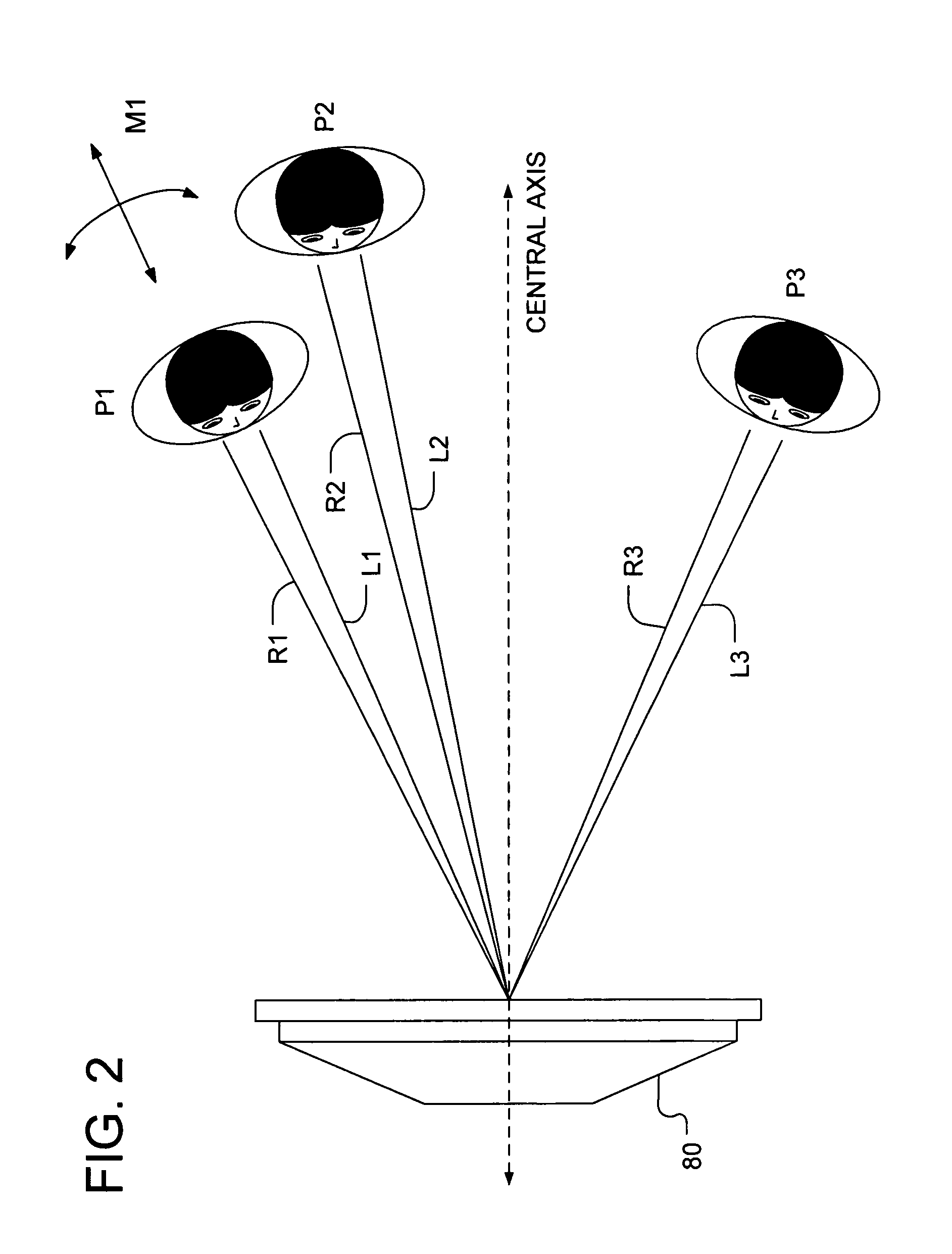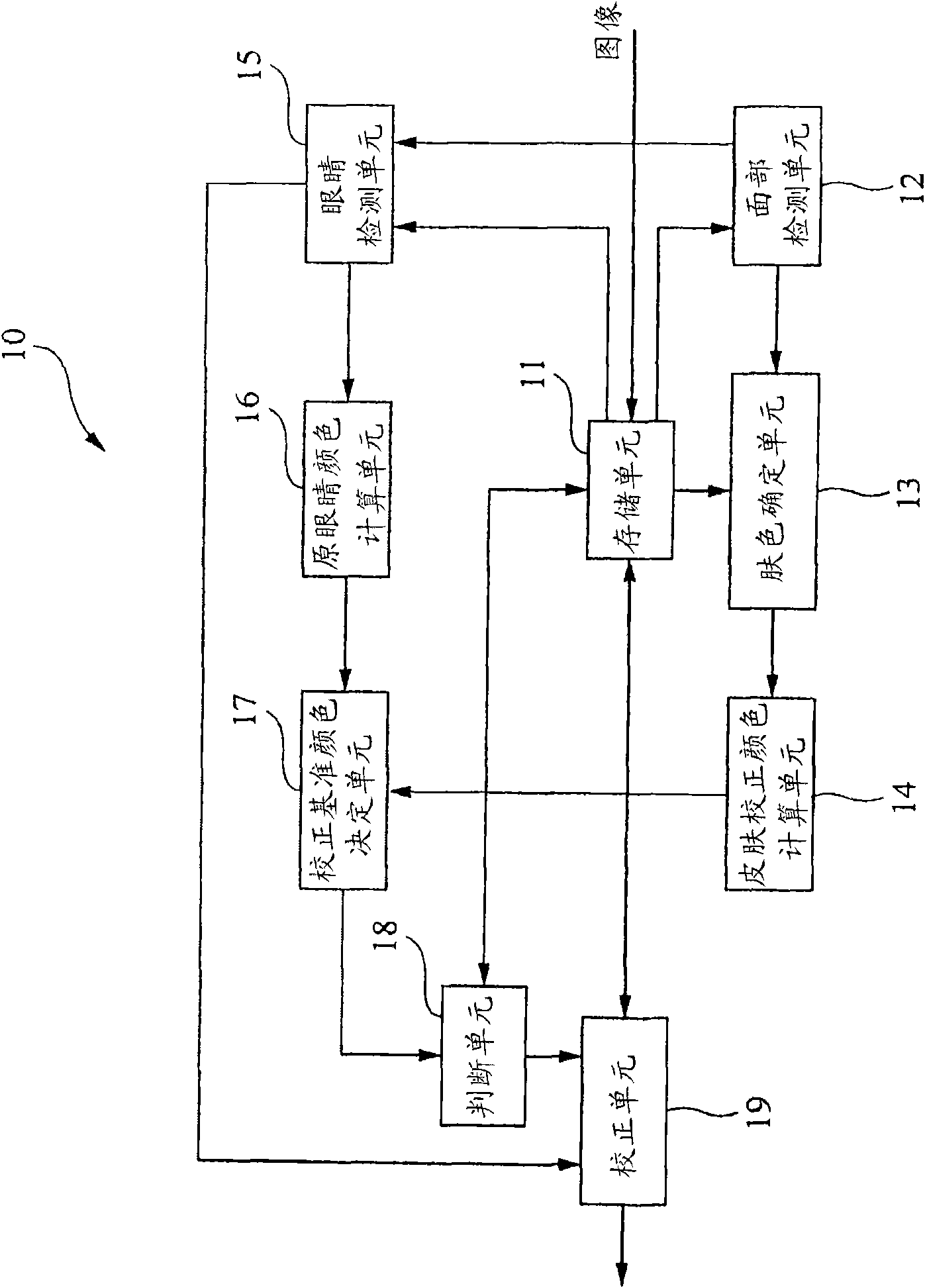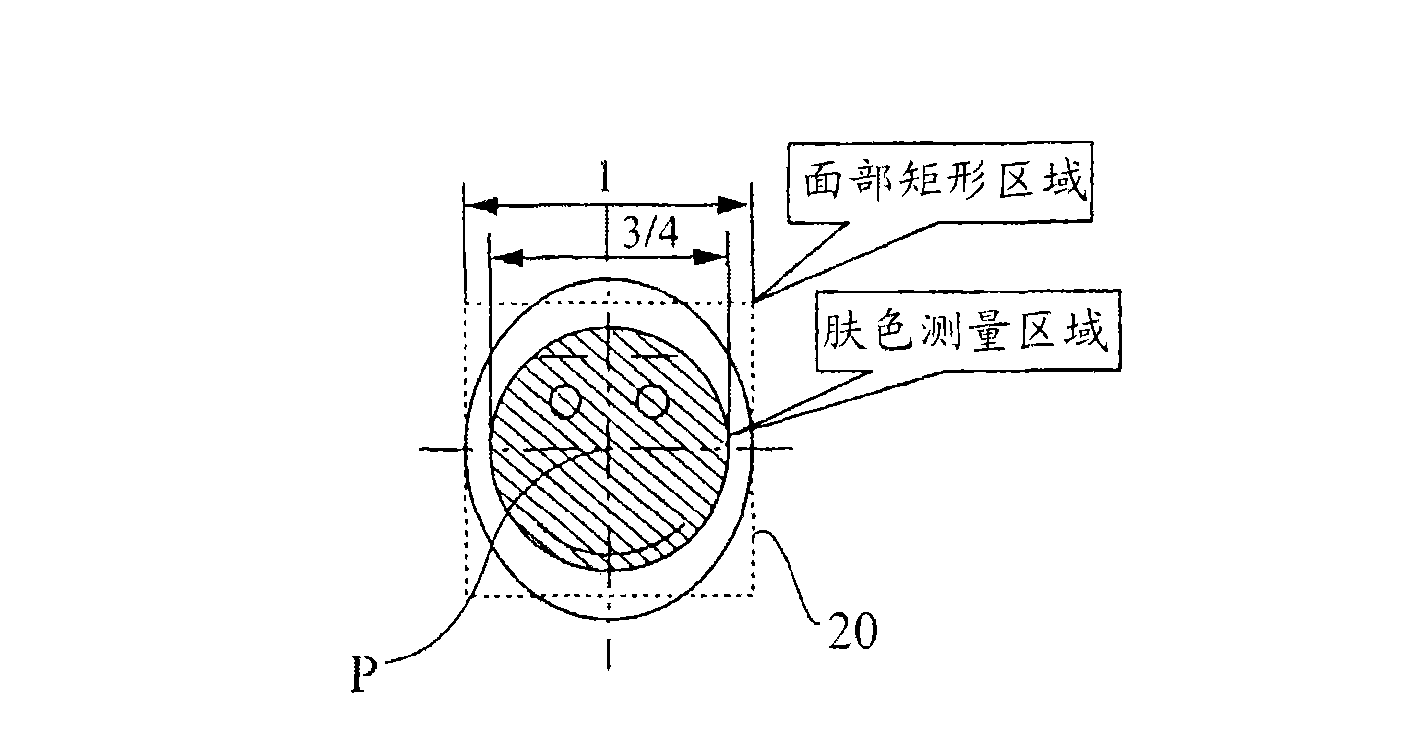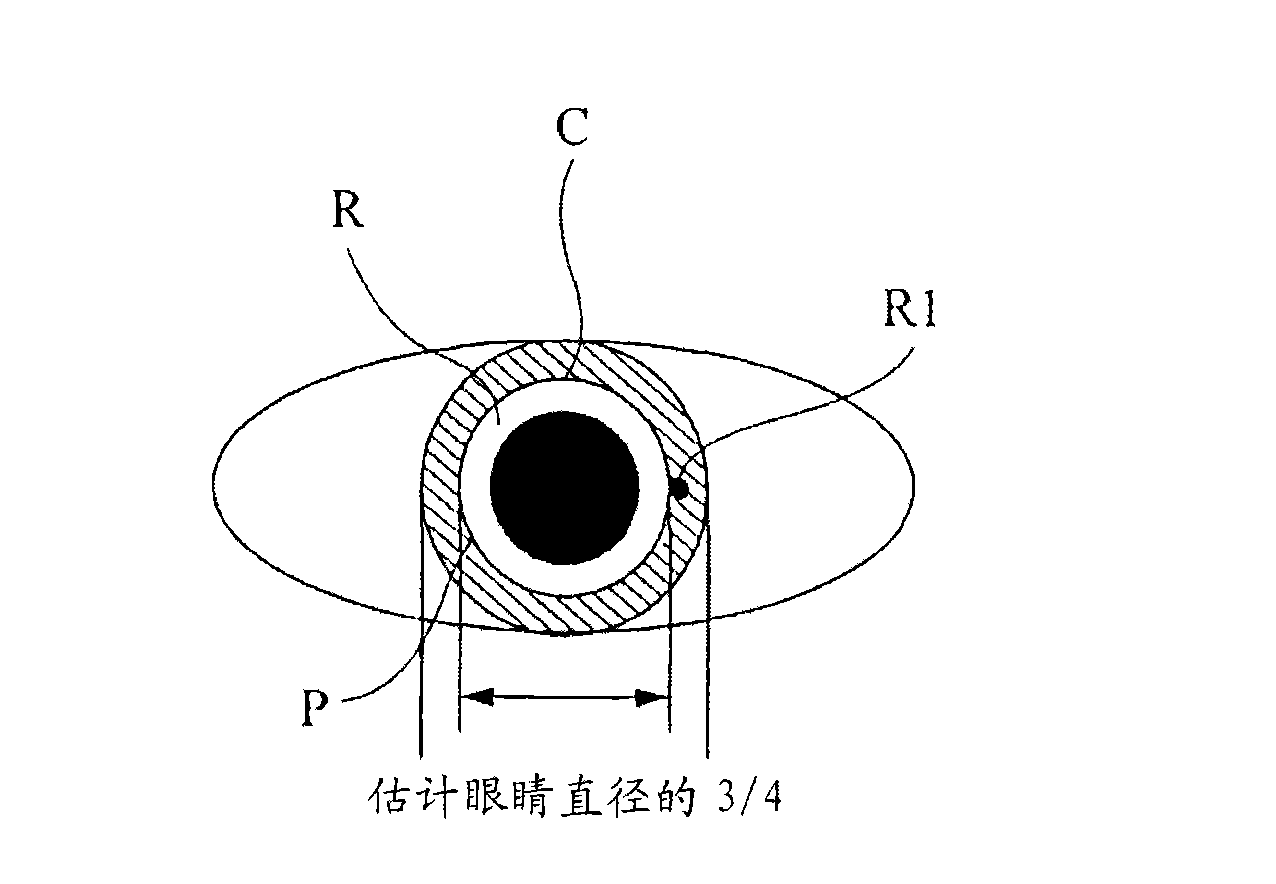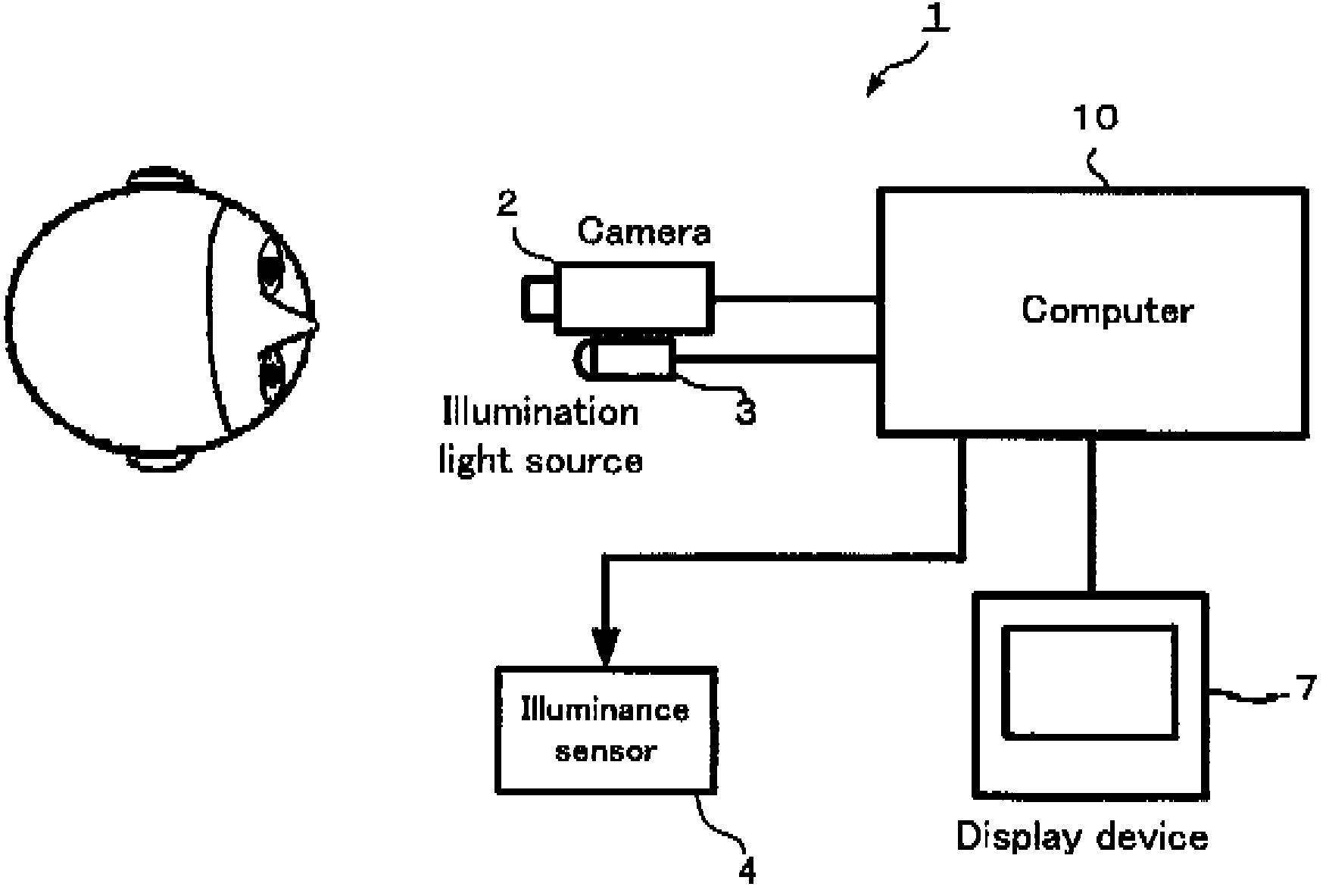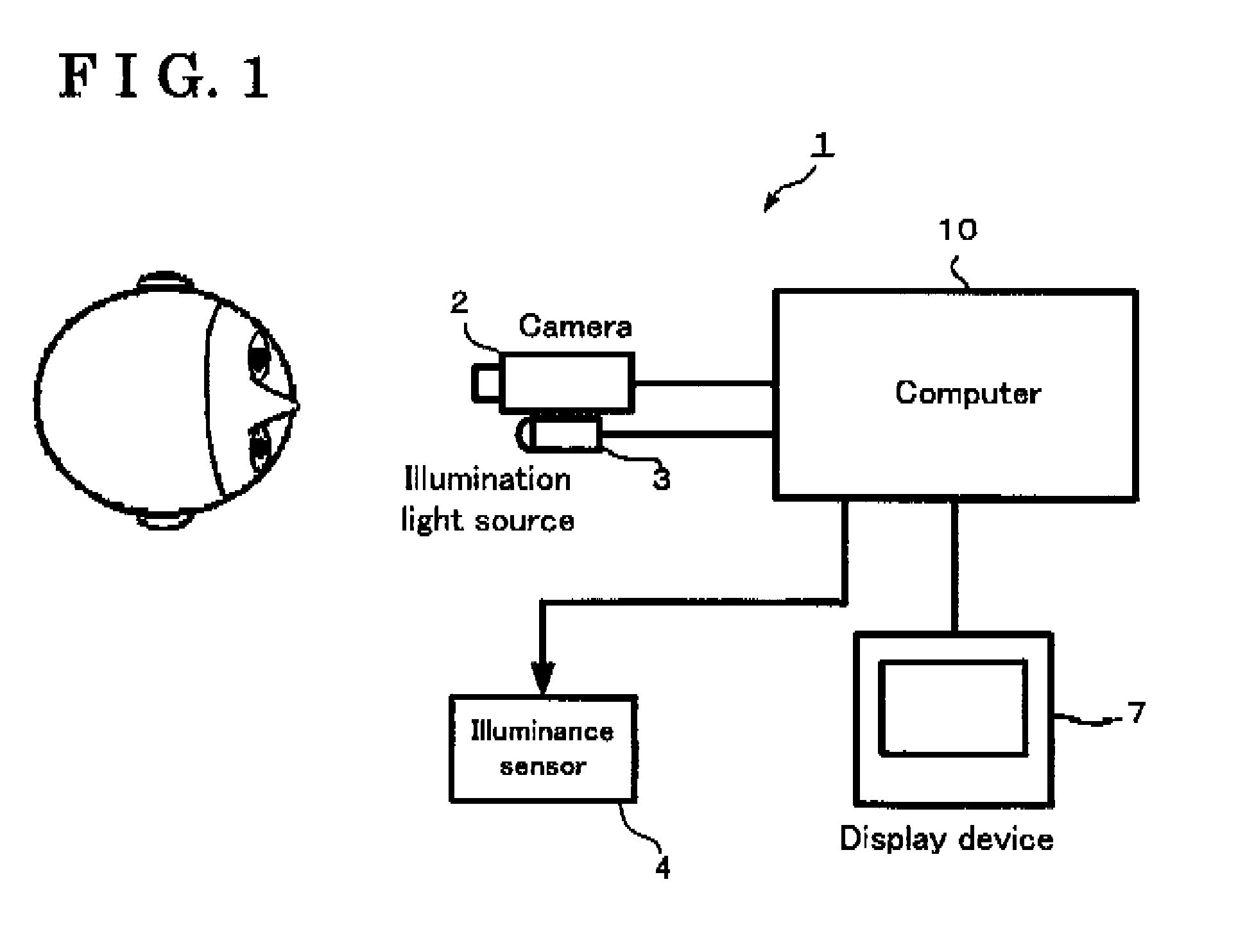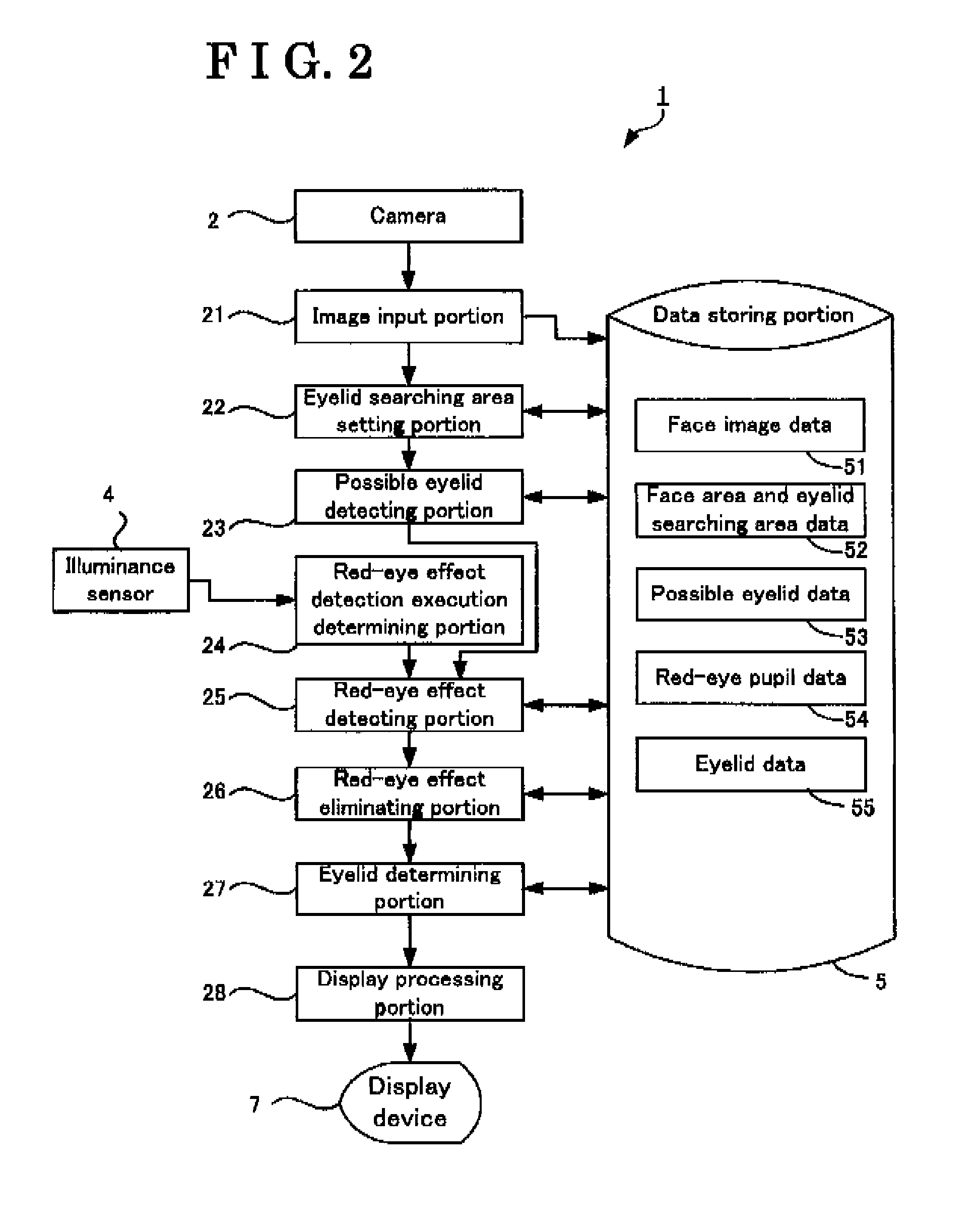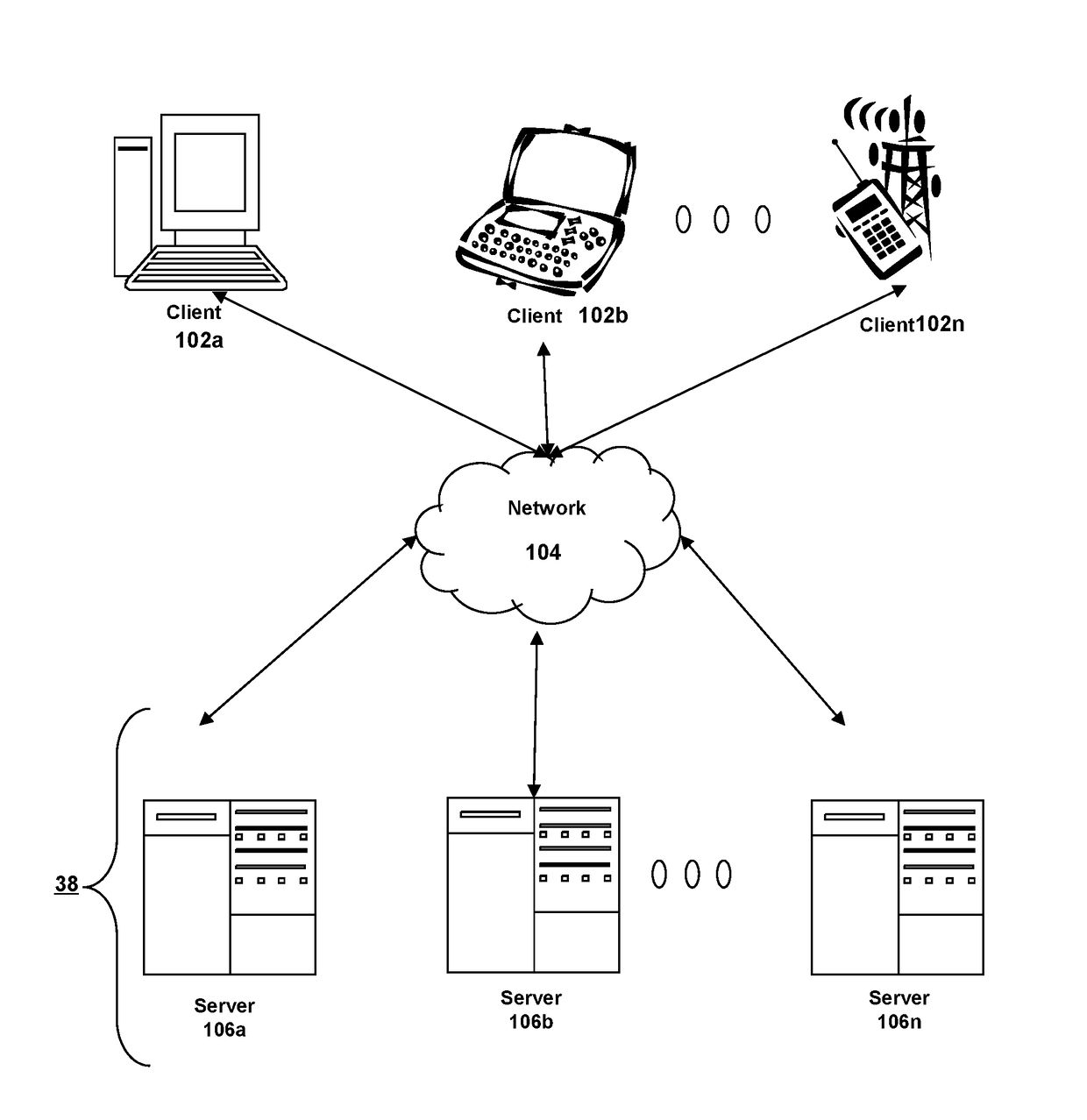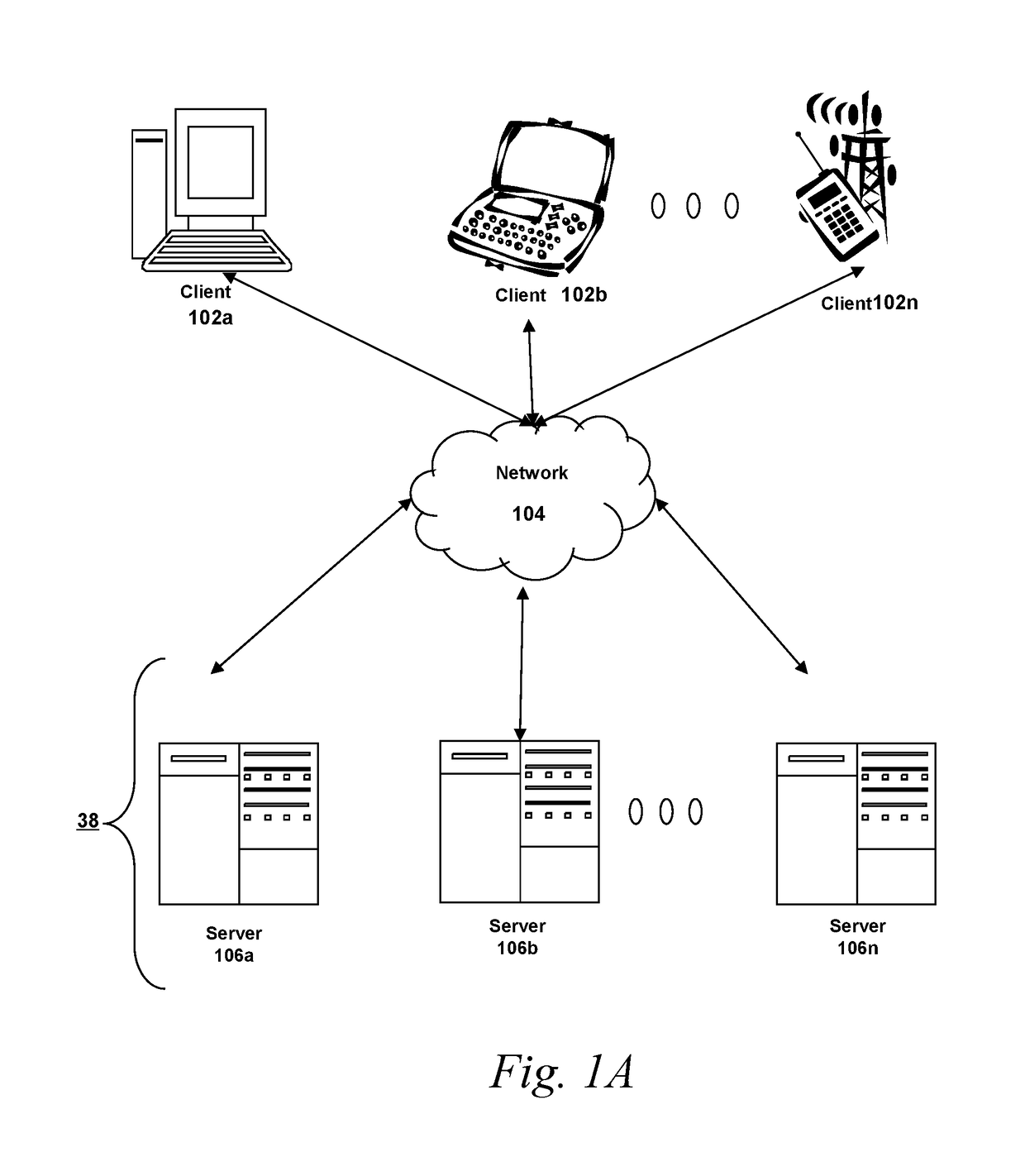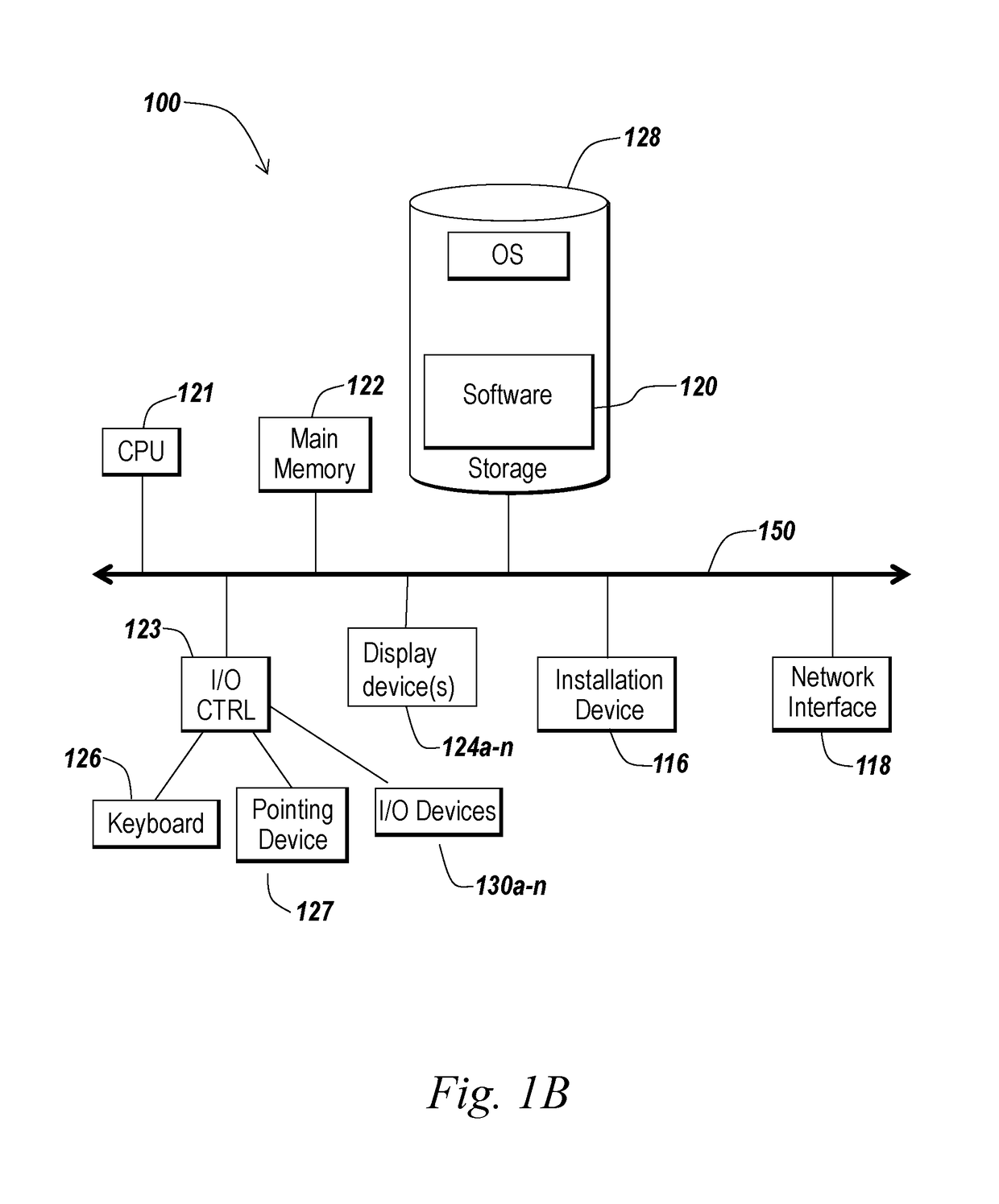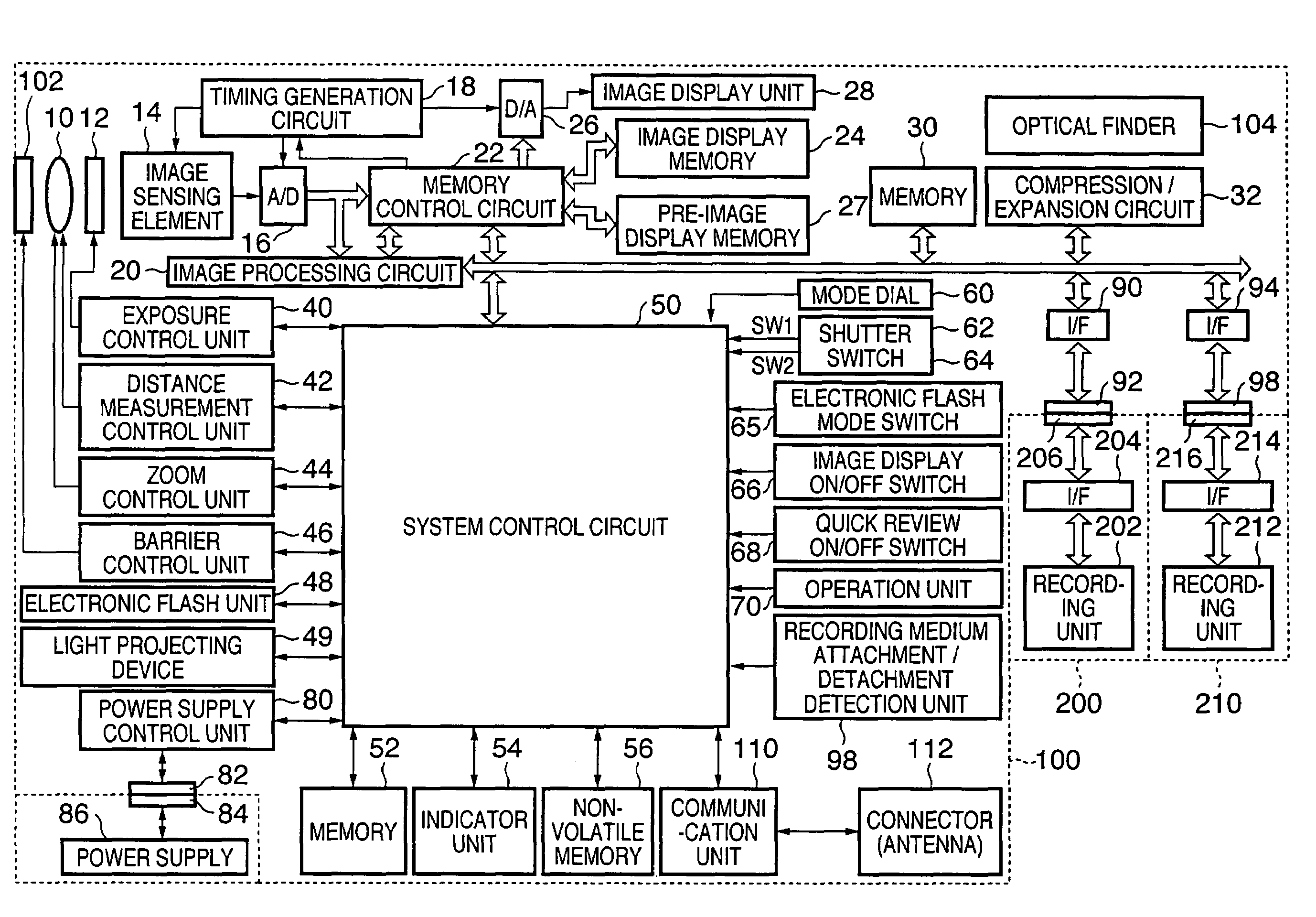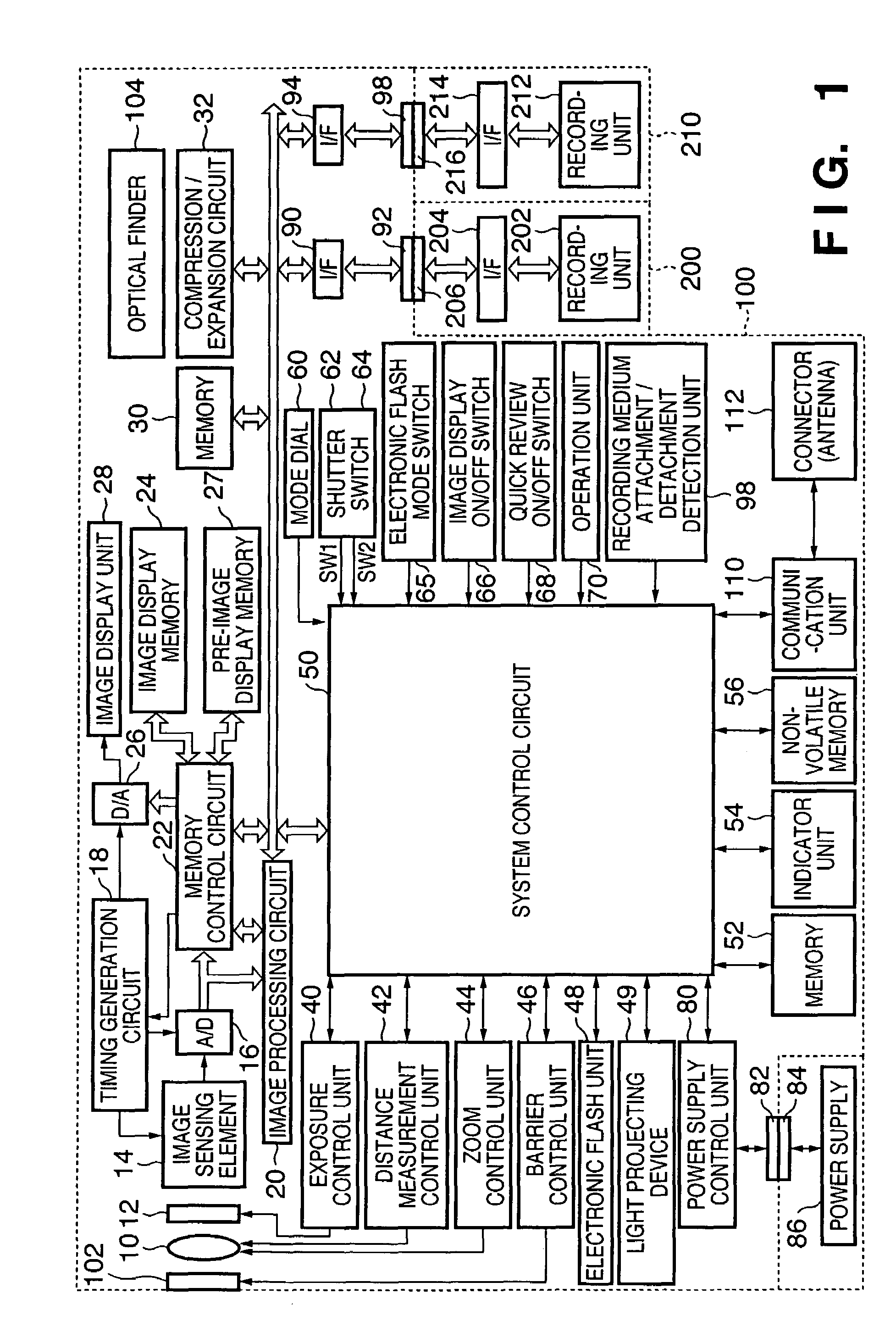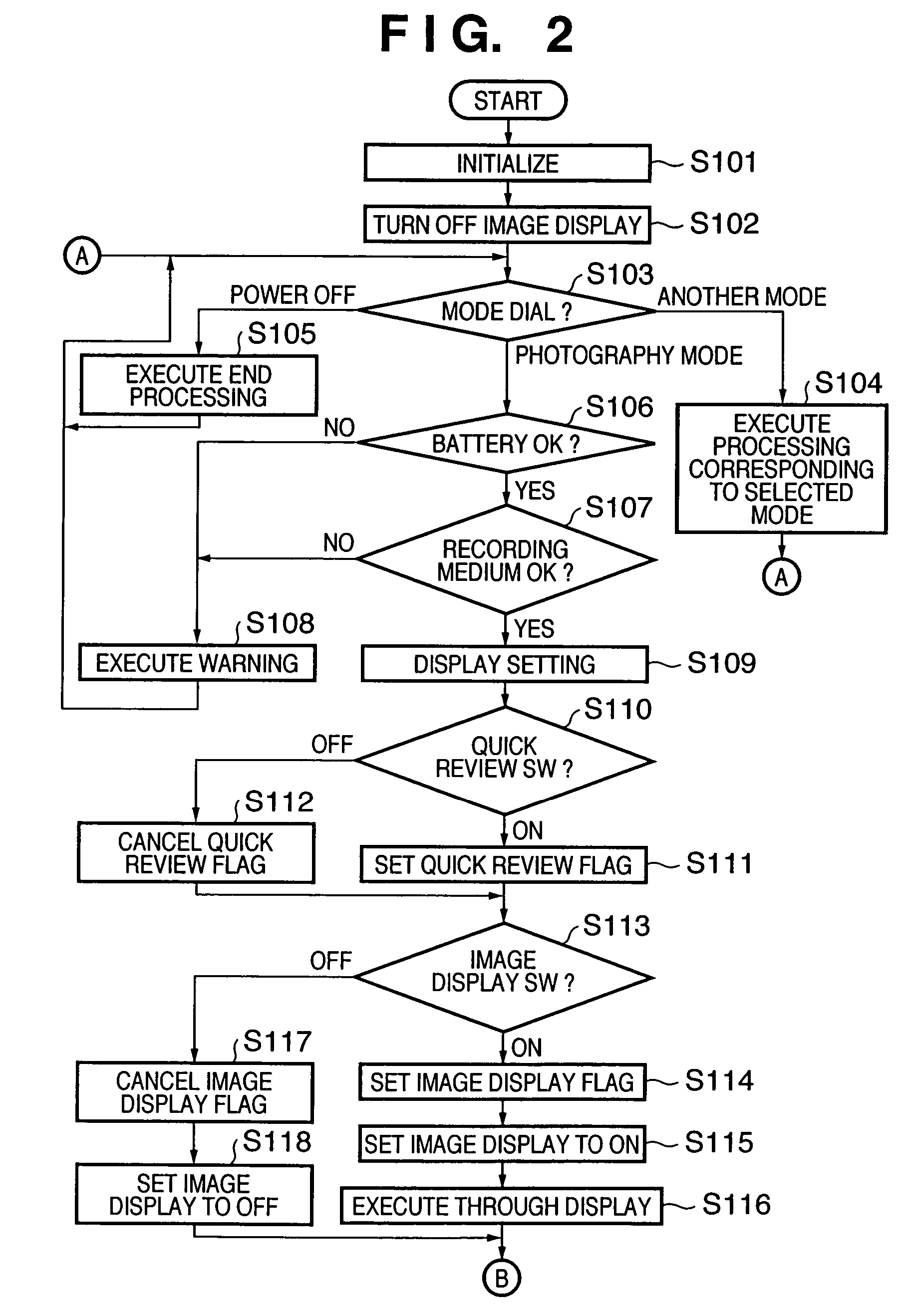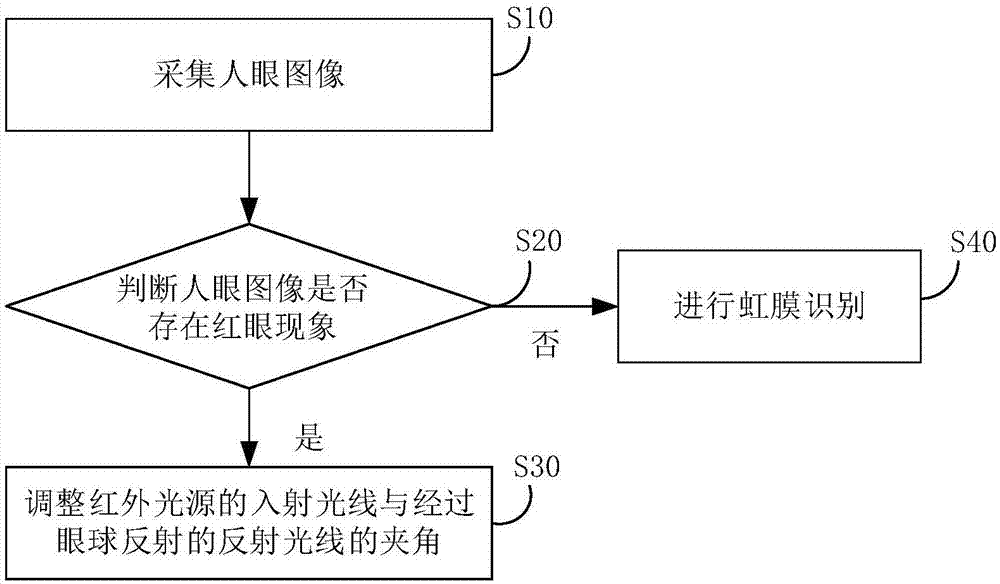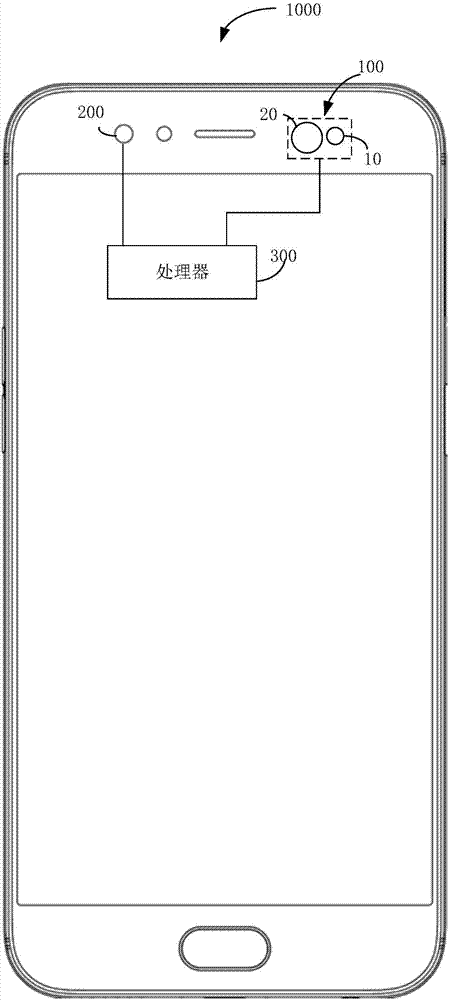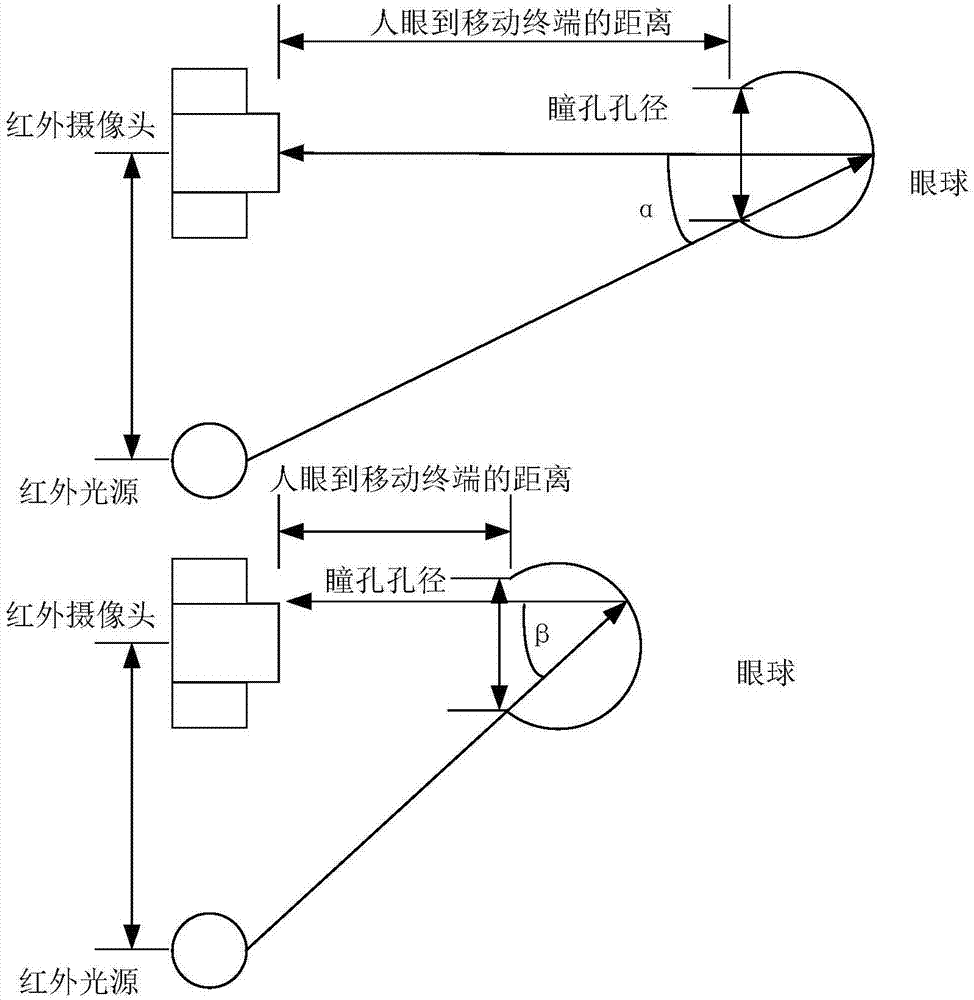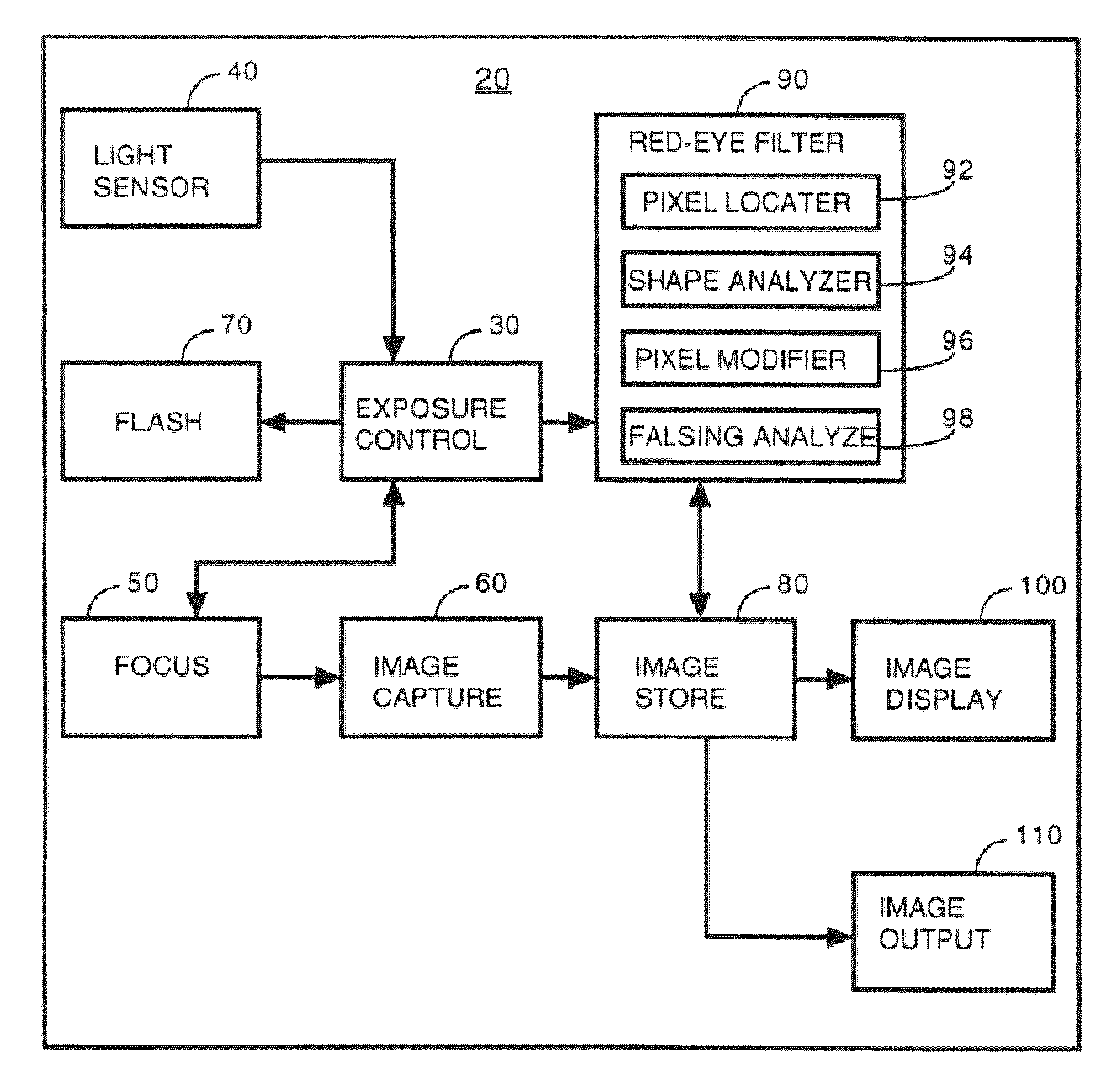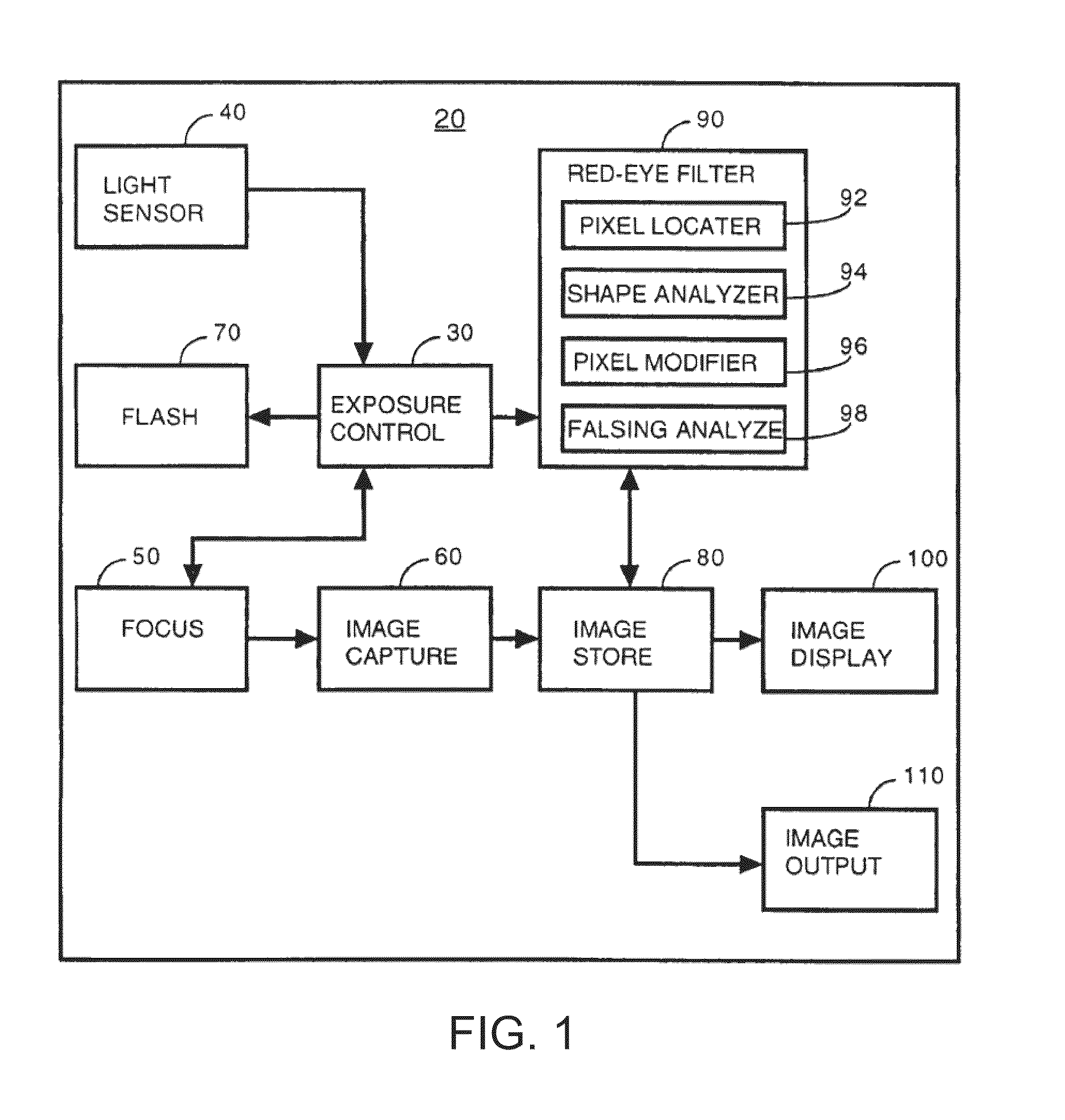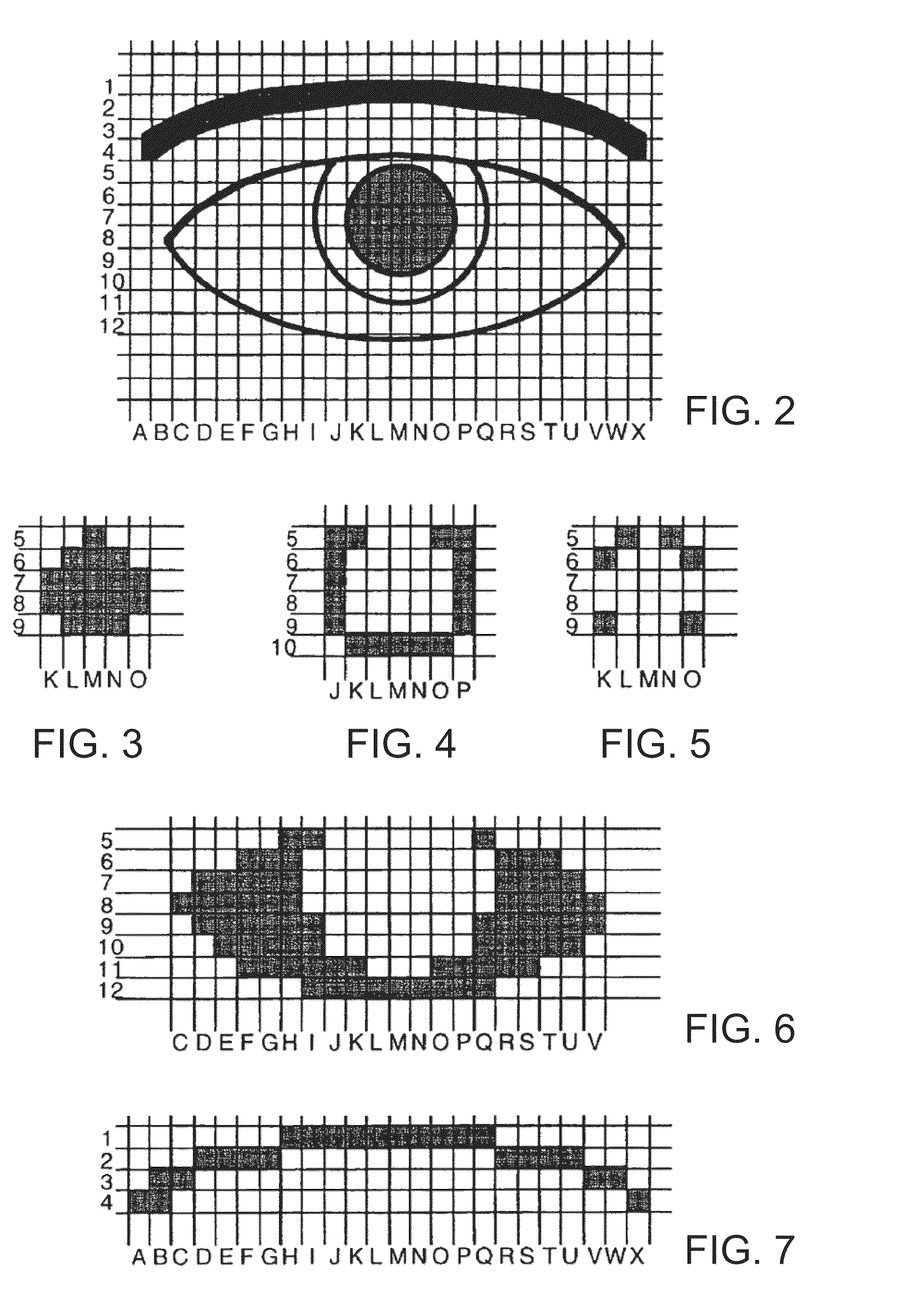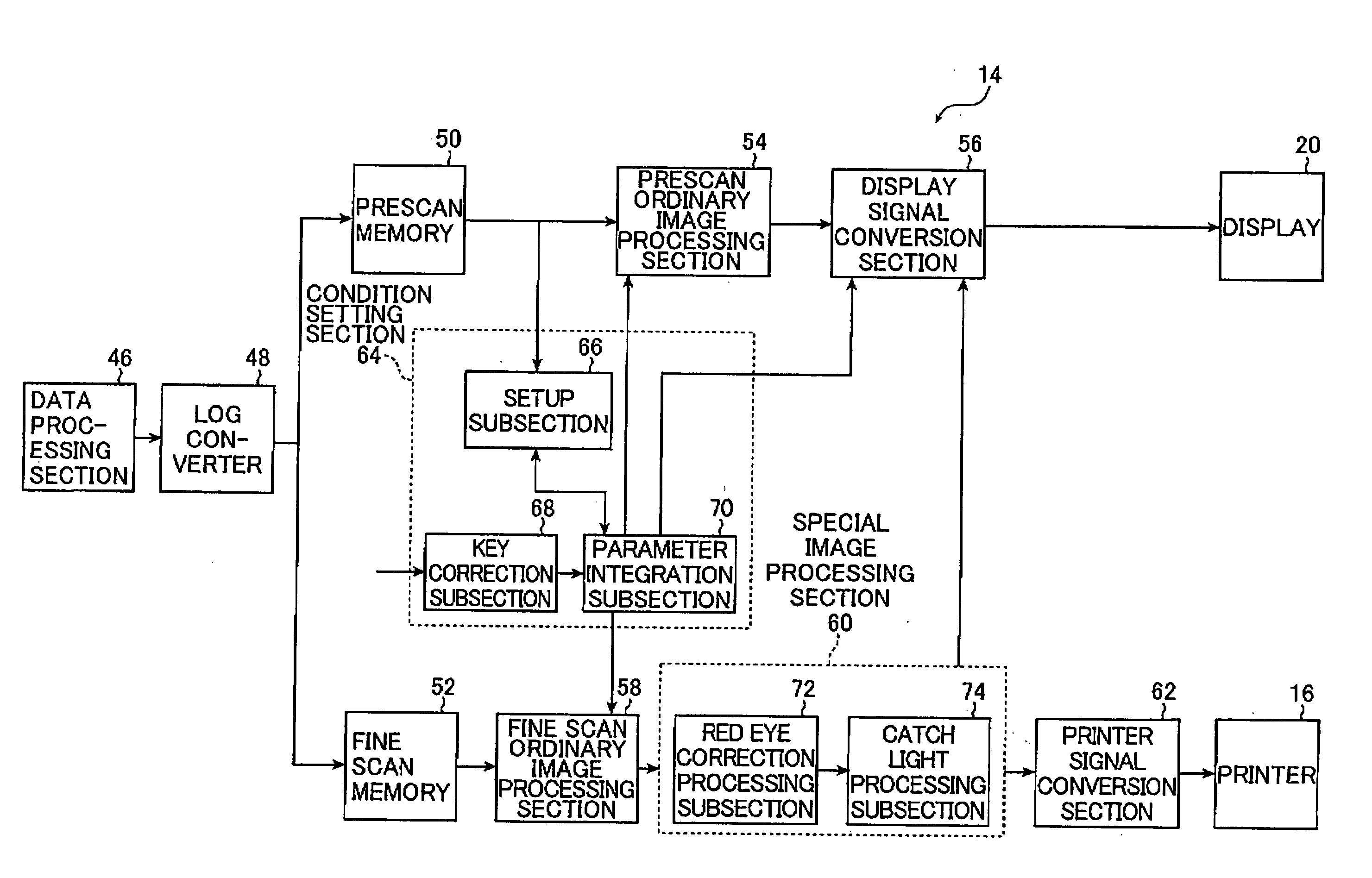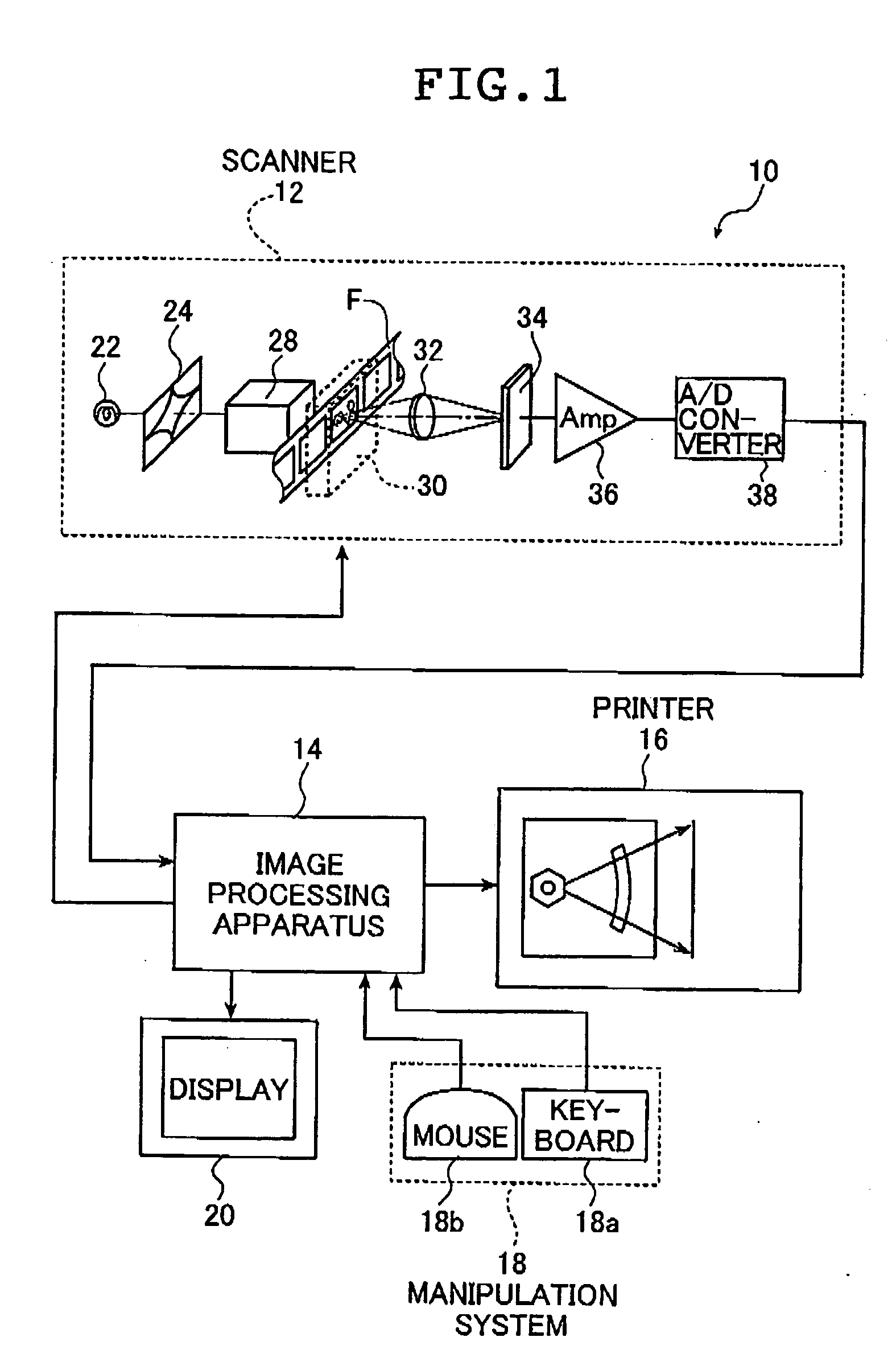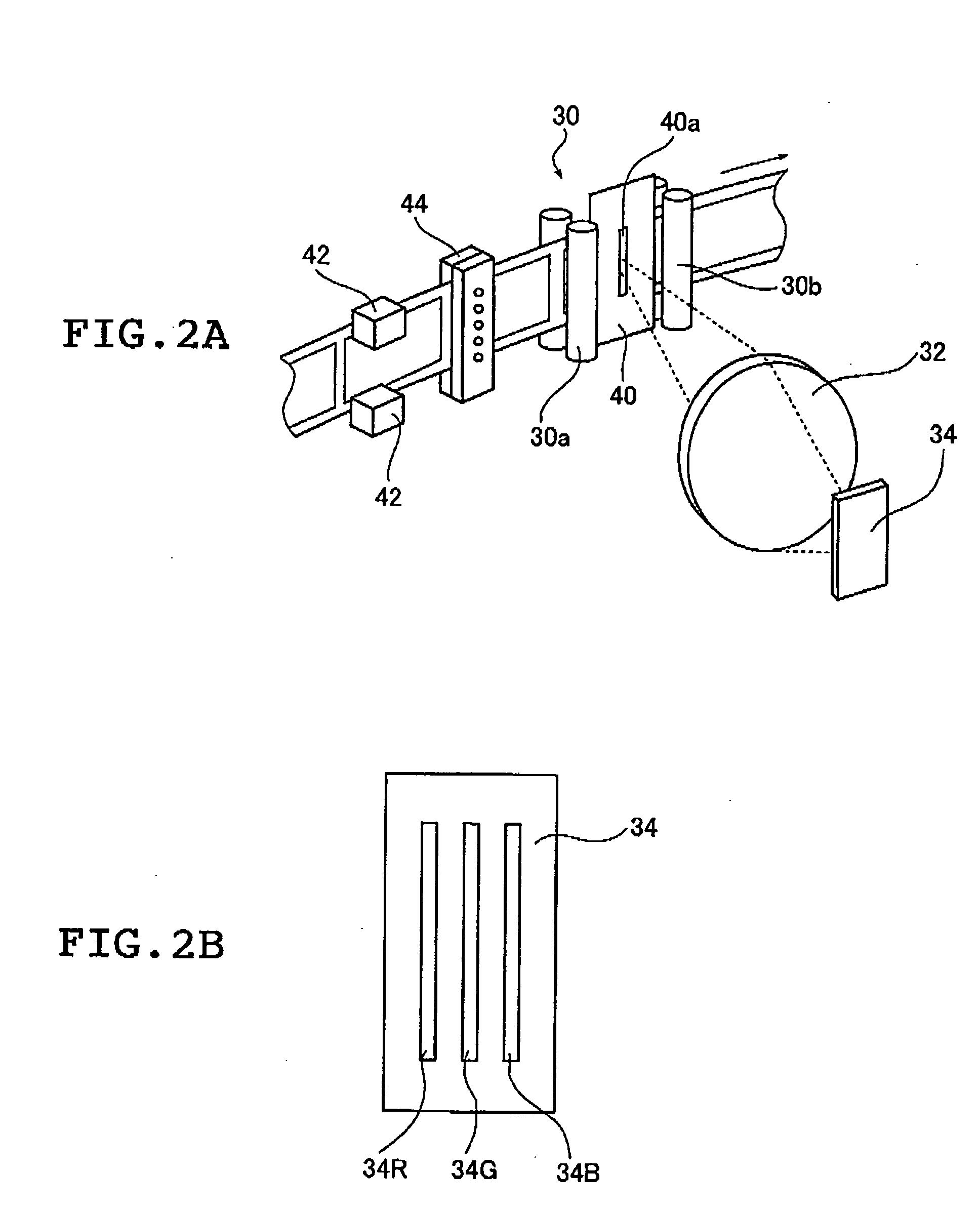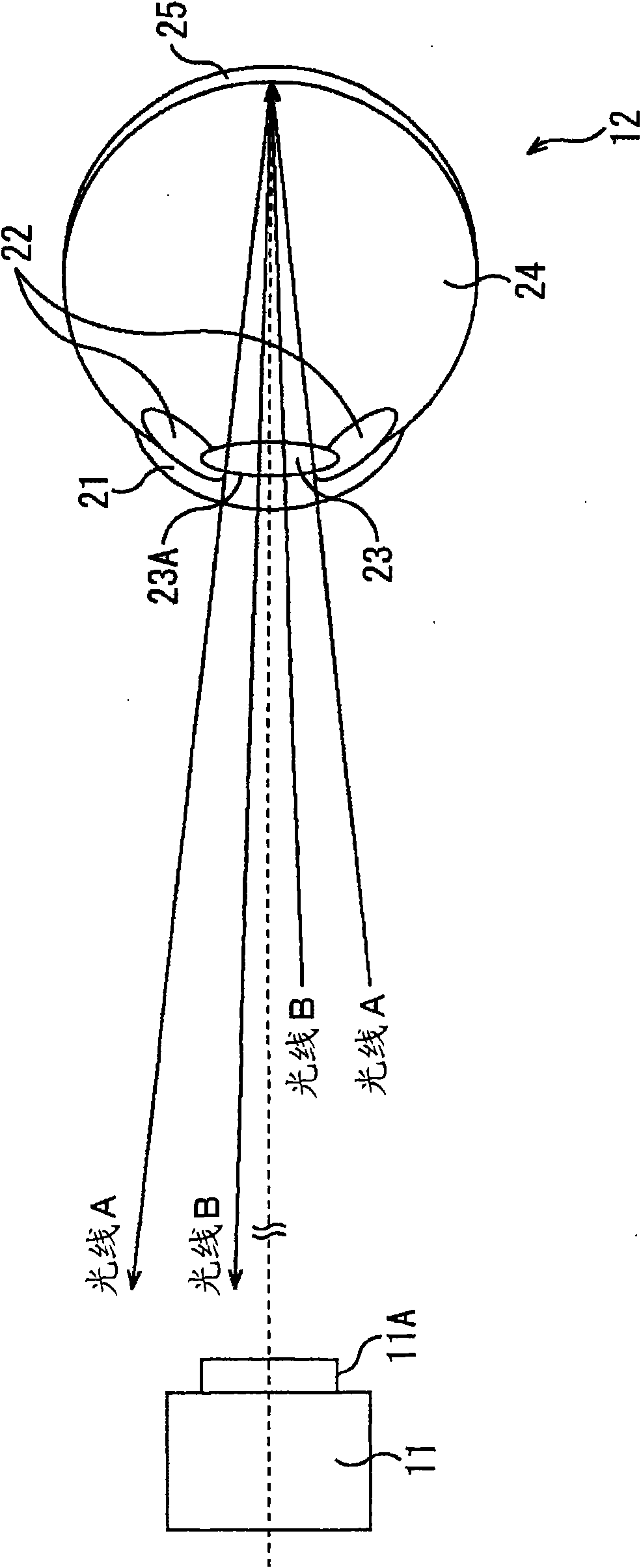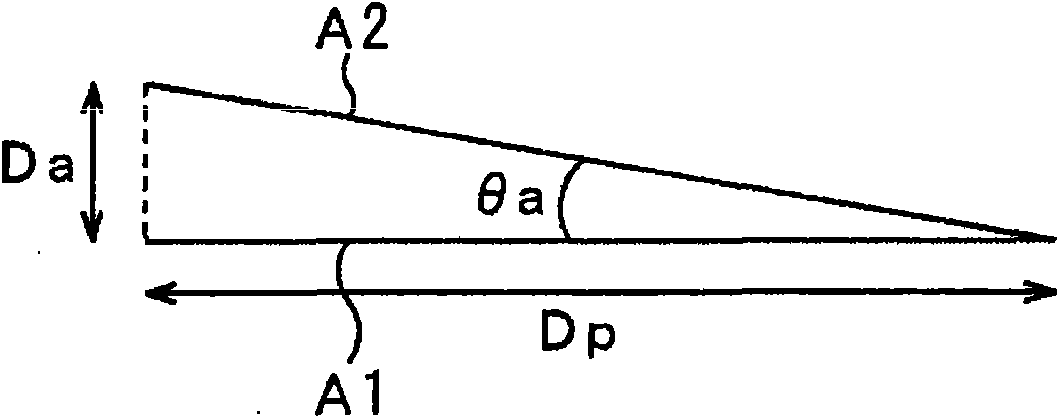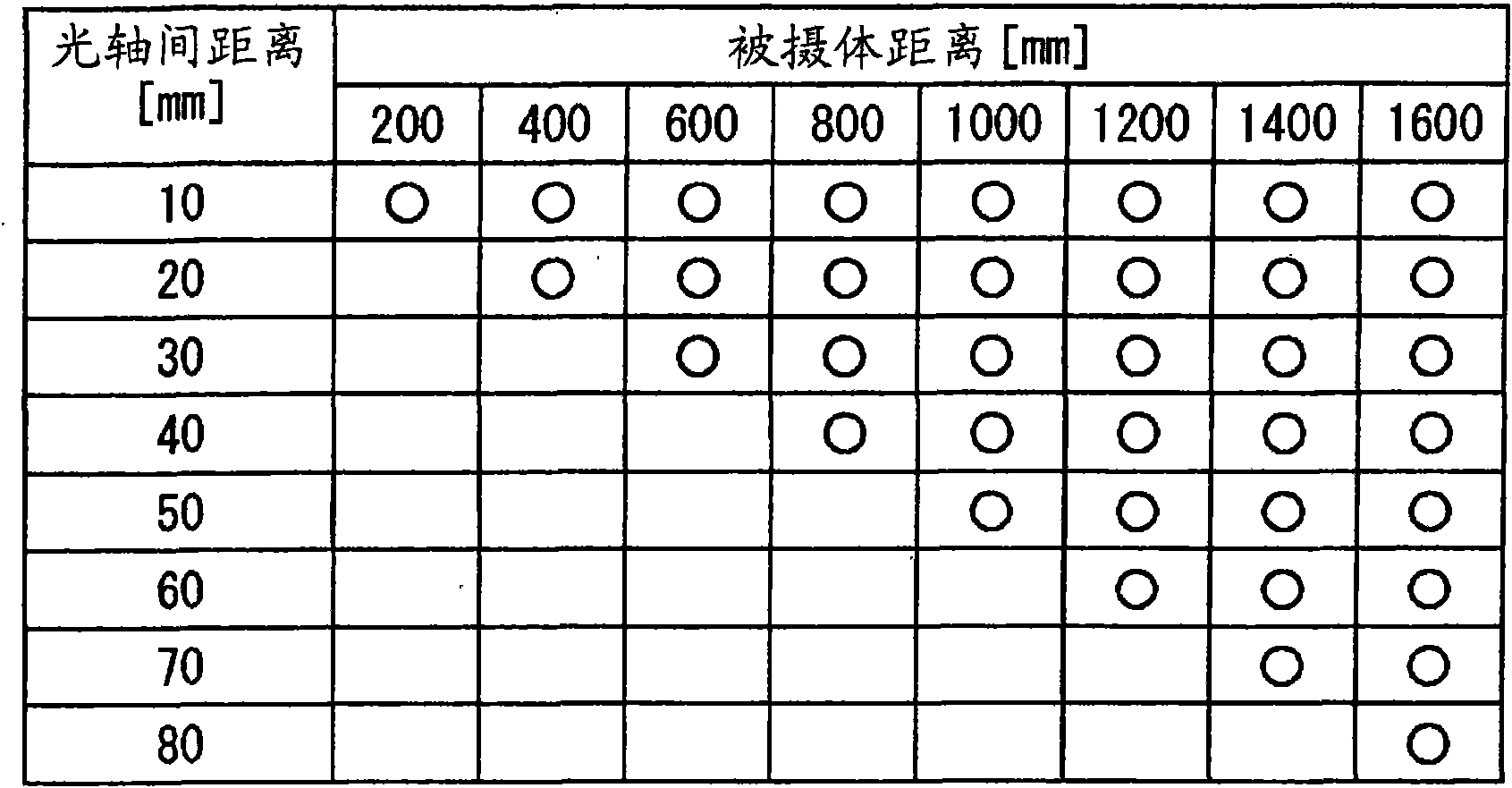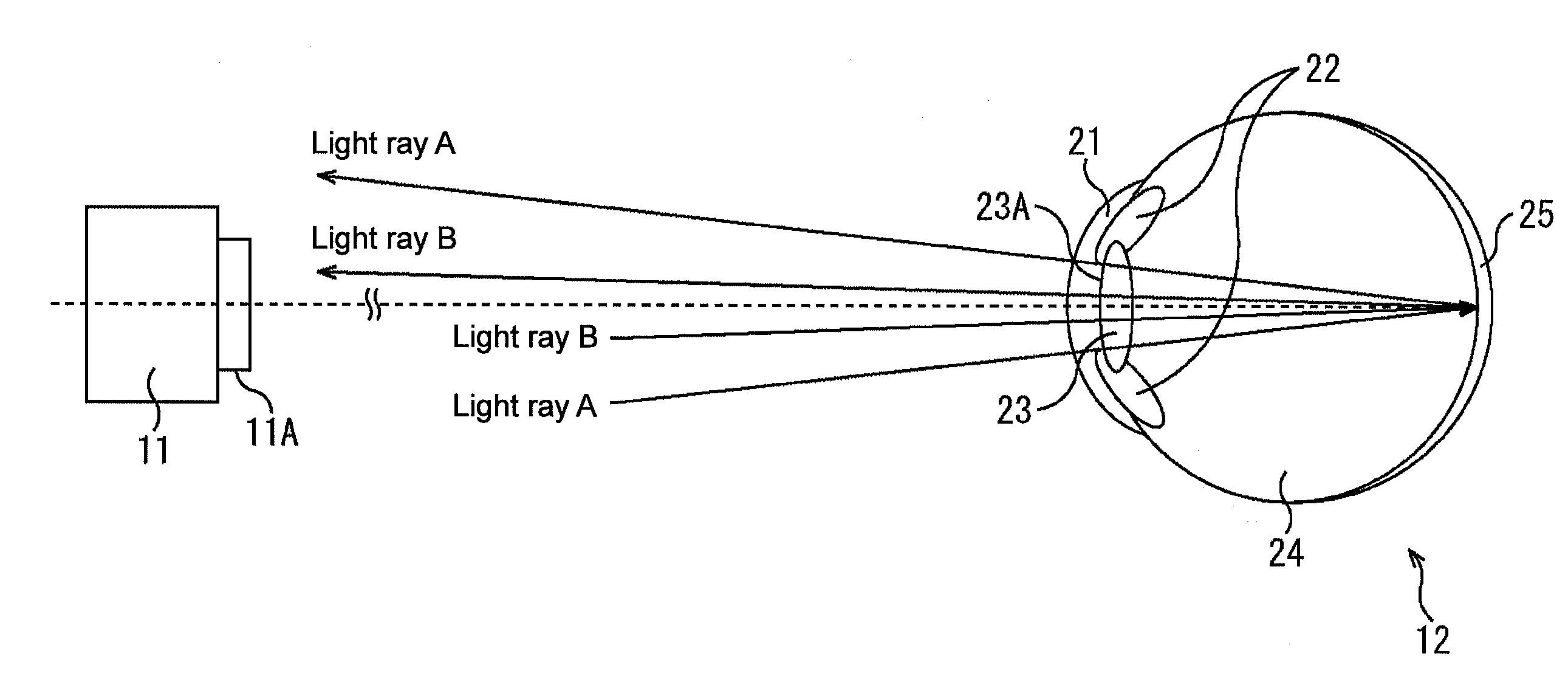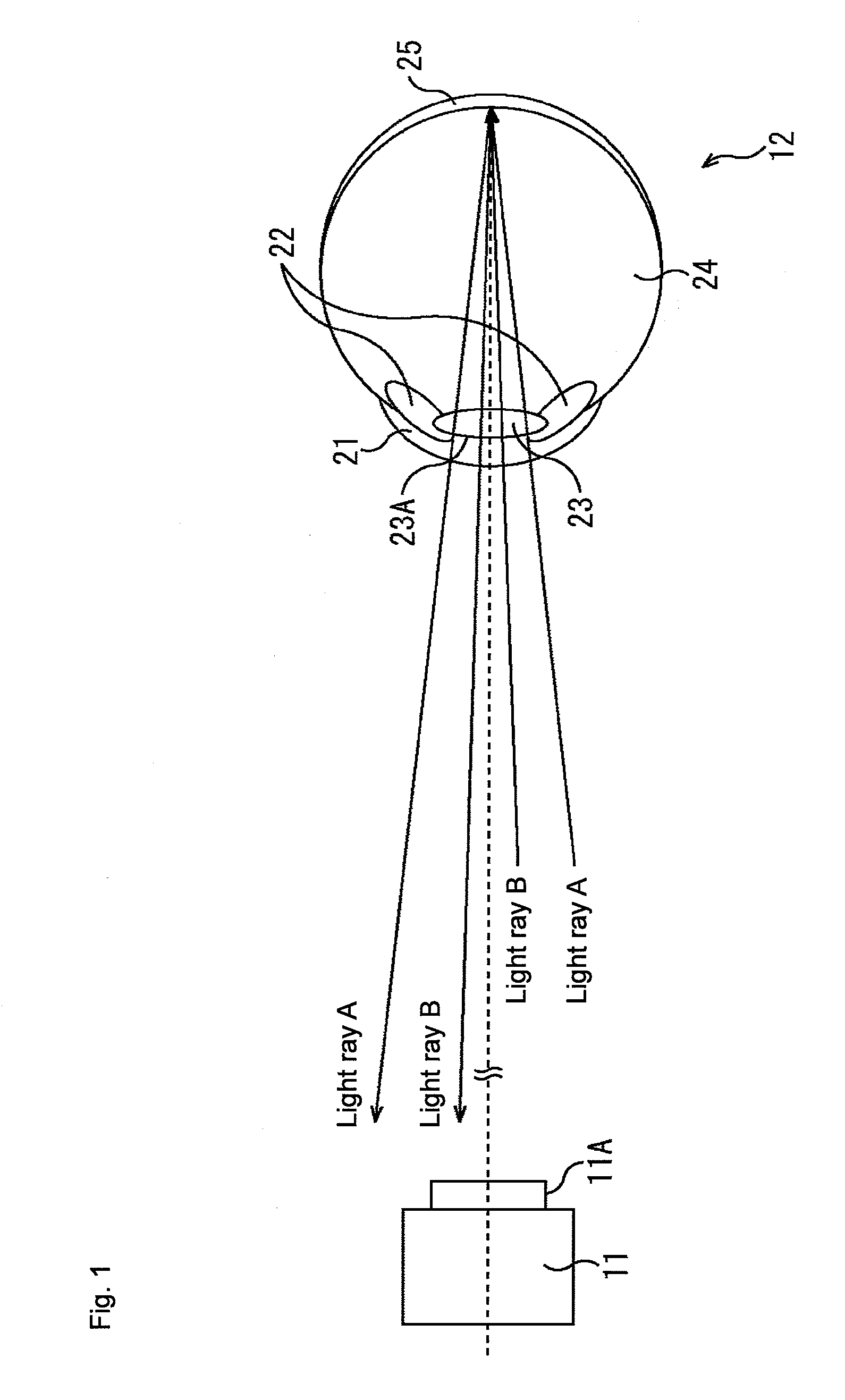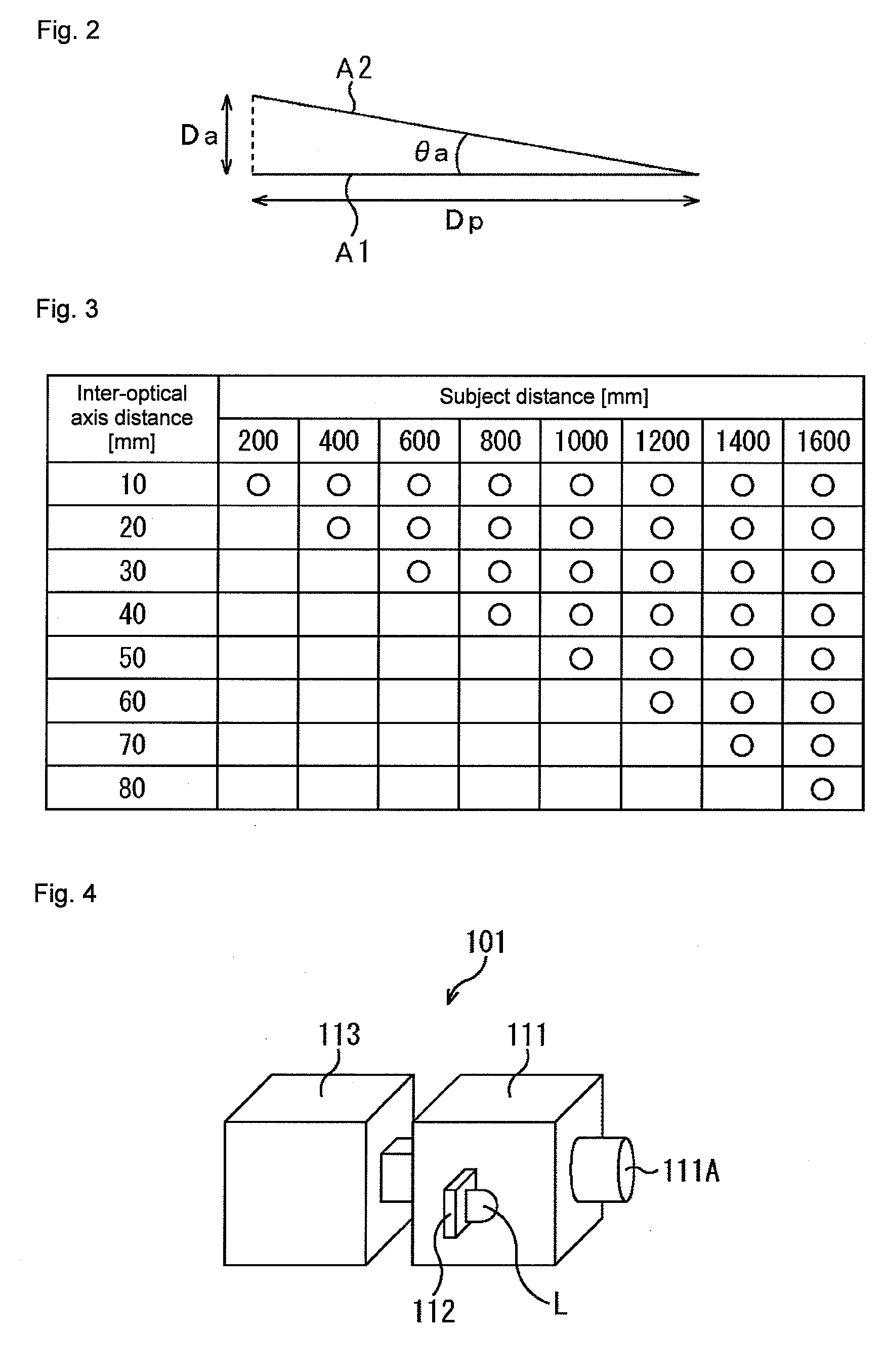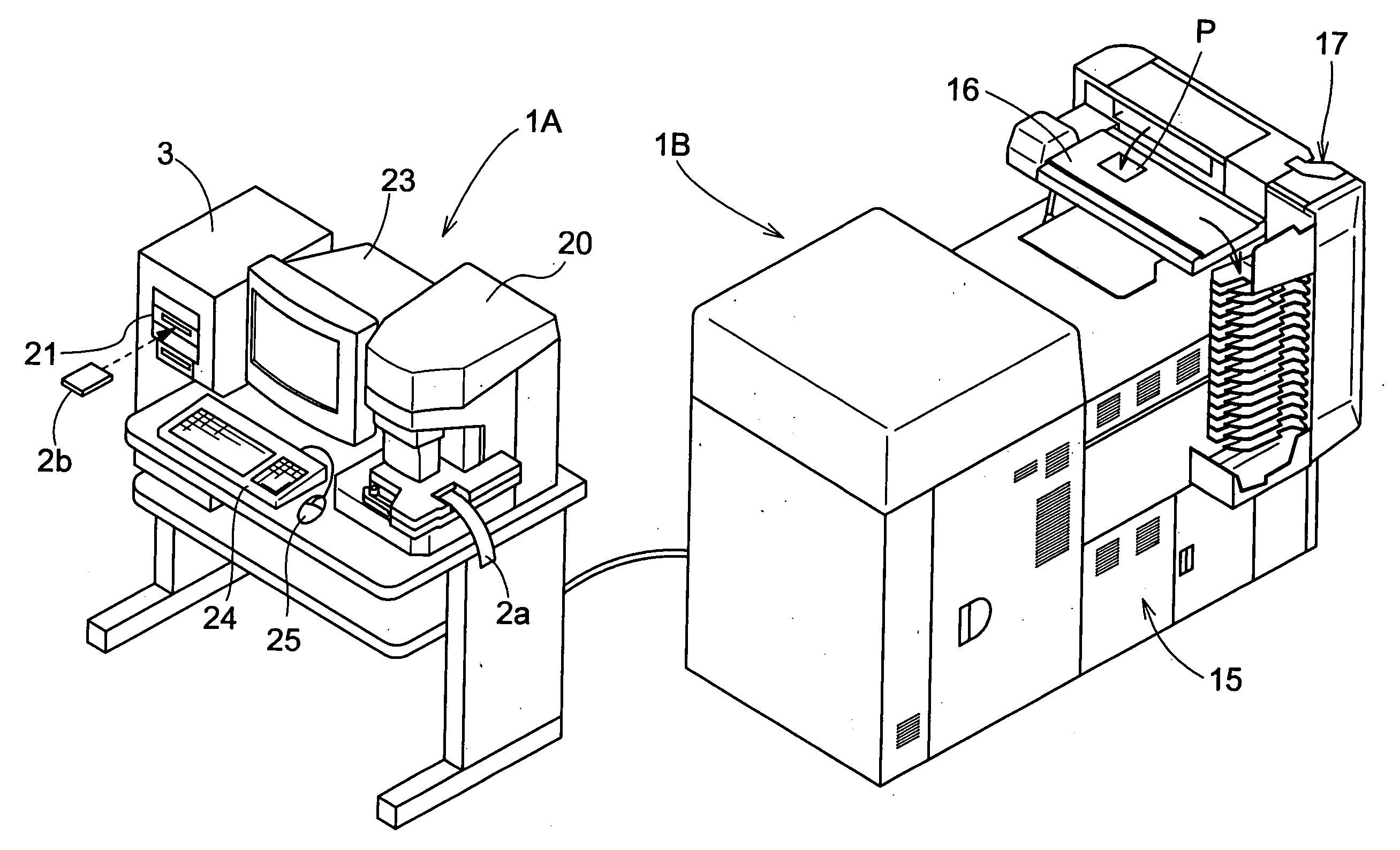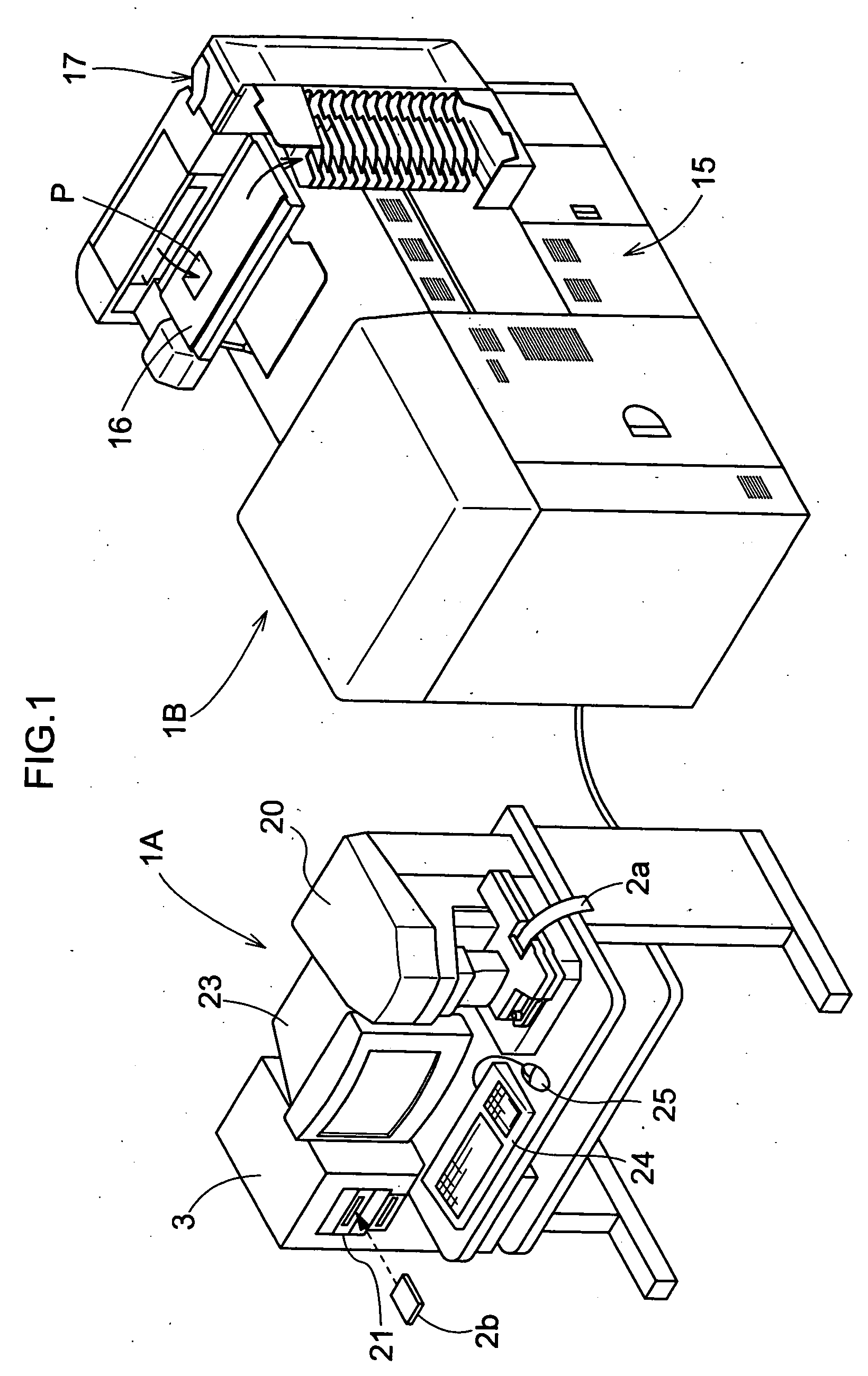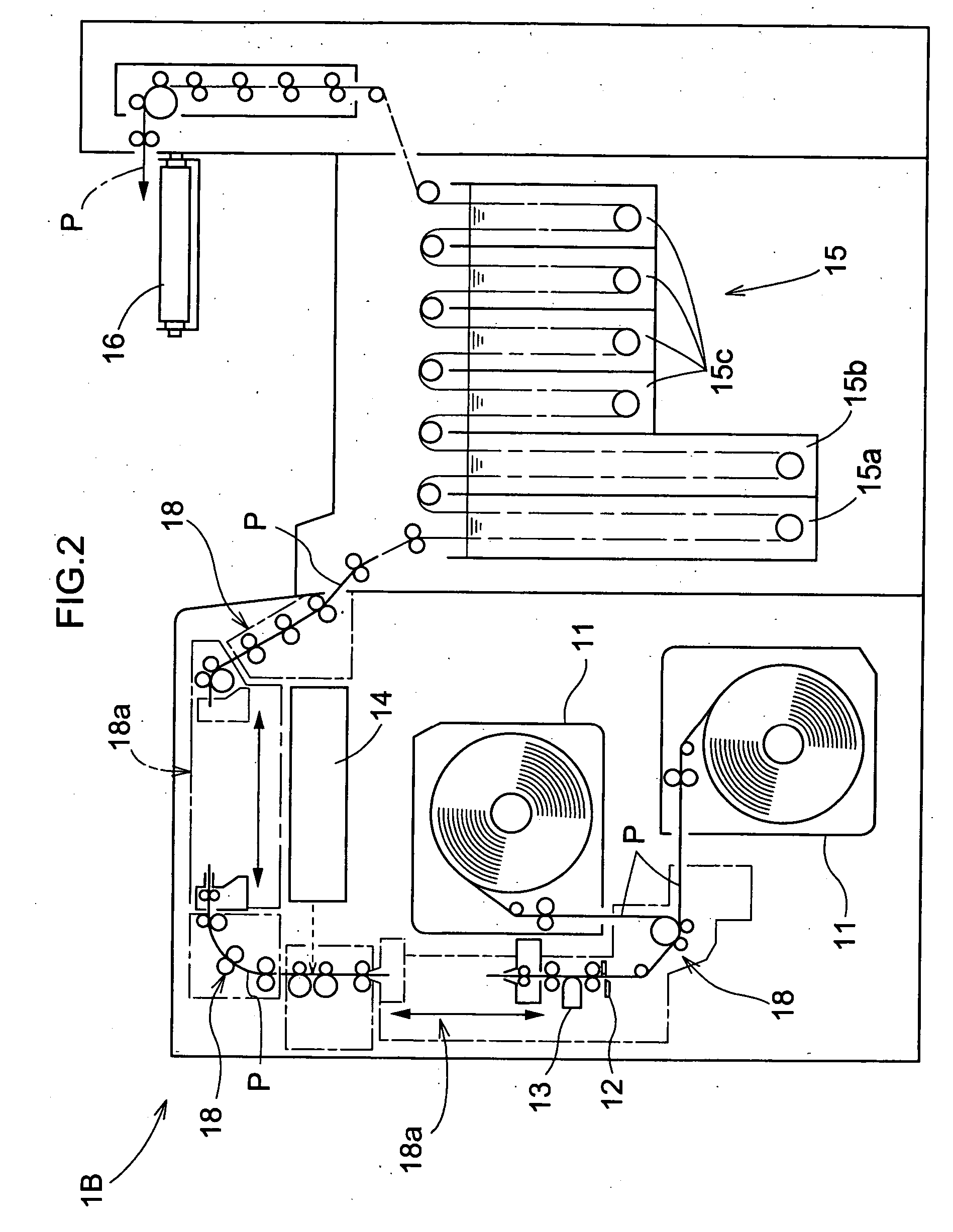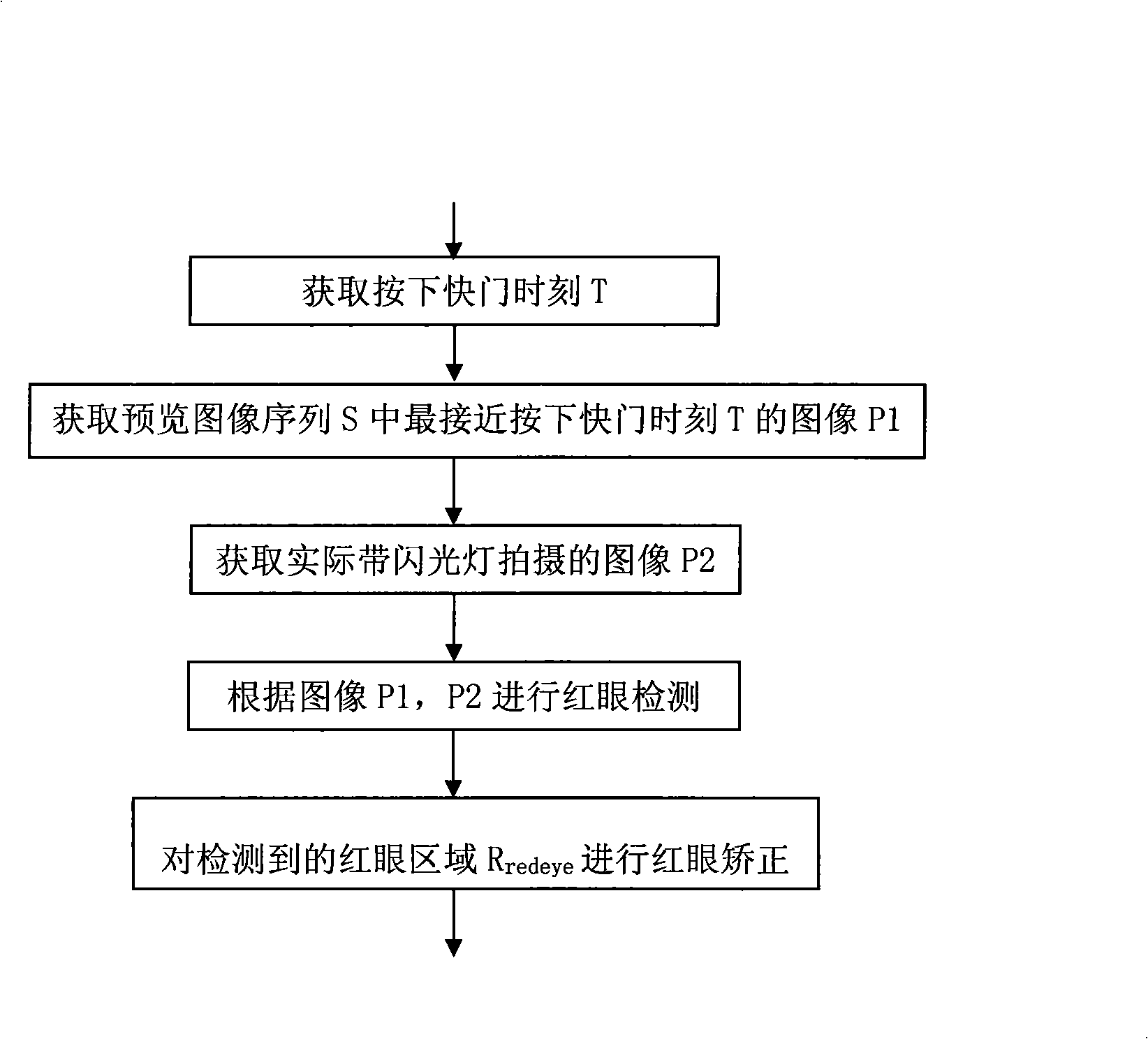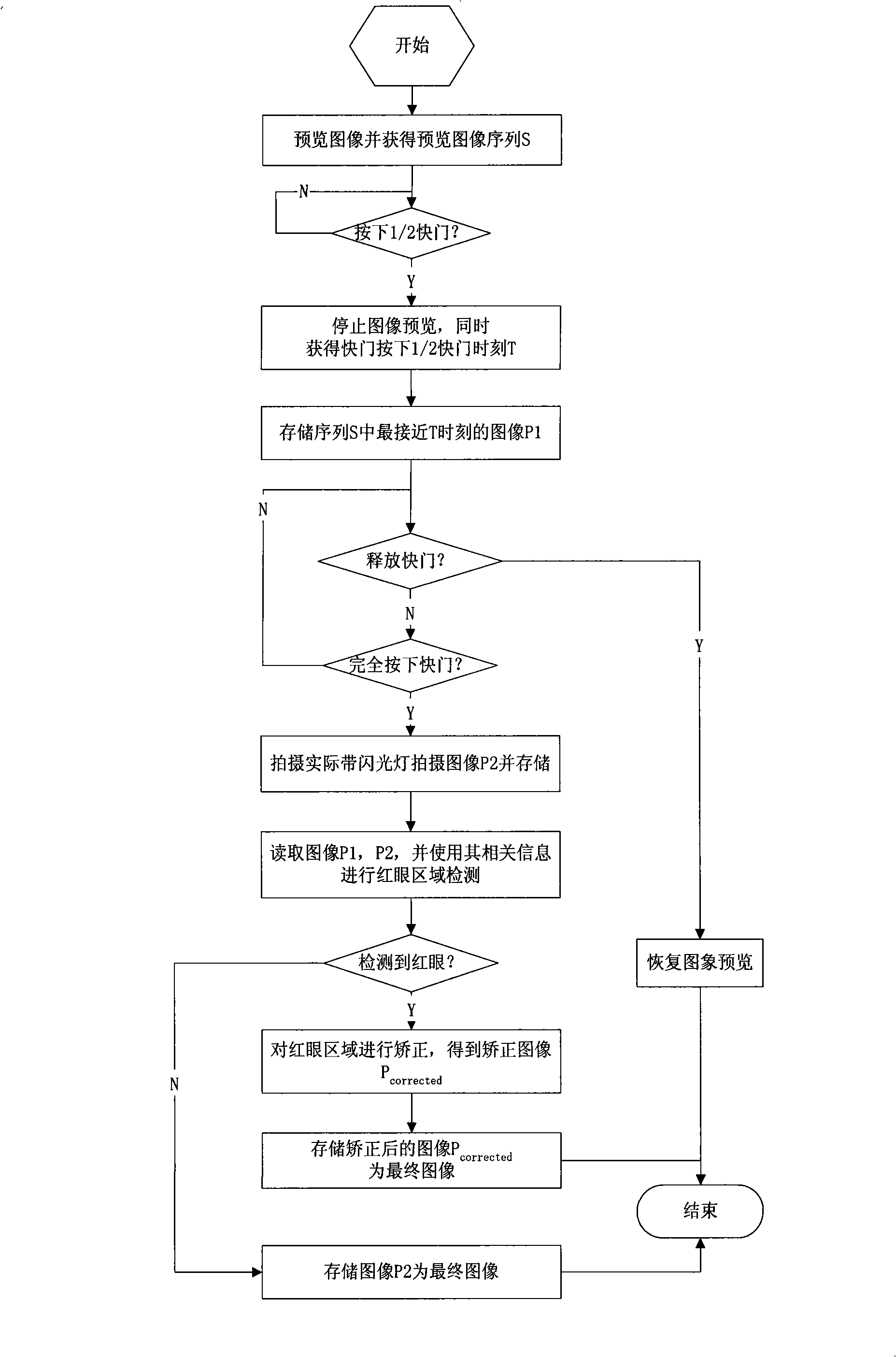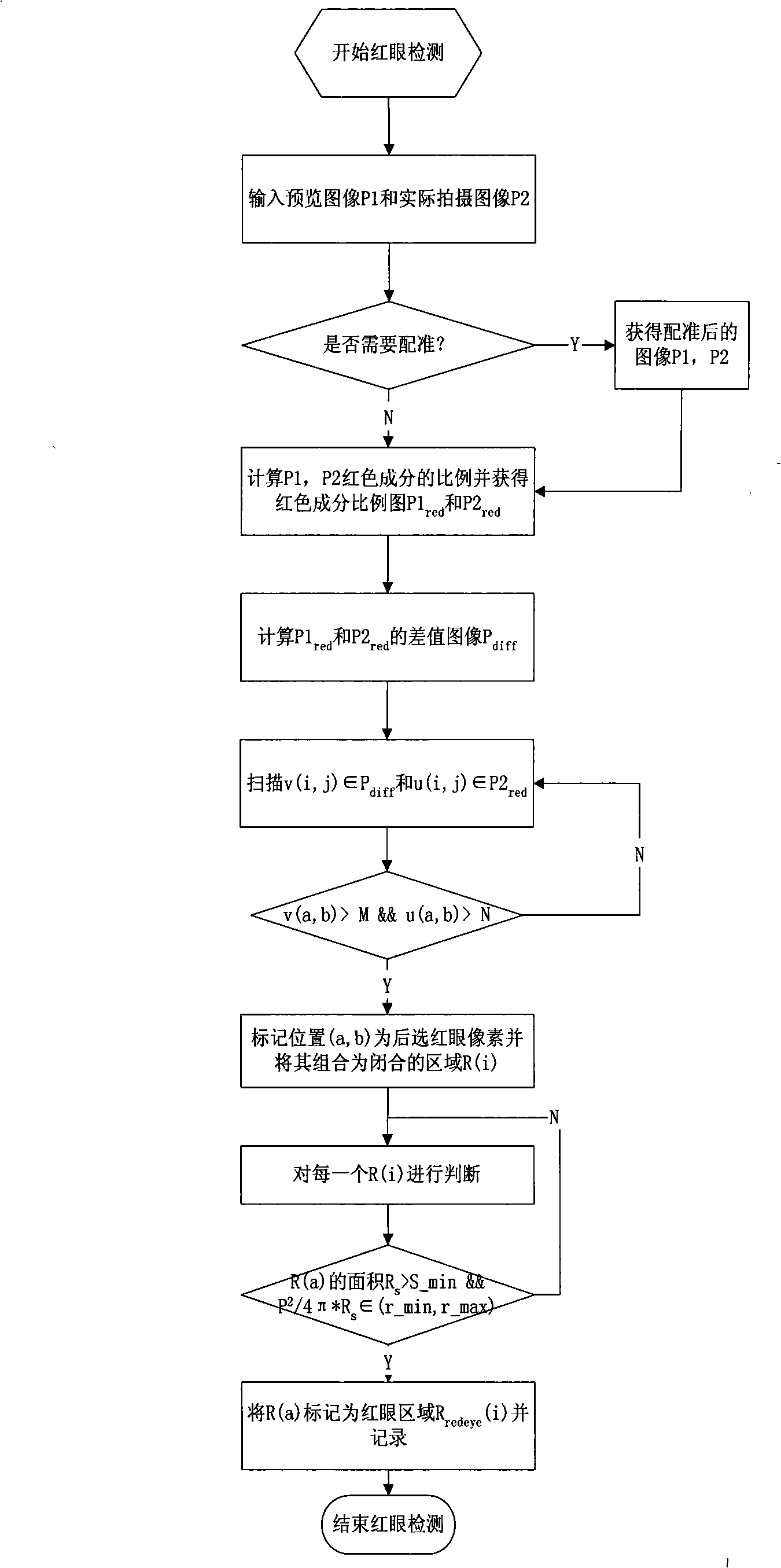Patents
Literature
40 results about "Red-eye effect" patented technology
Efficacy Topic
Property
Owner
Technical Advancement
Application Domain
Technology Topic
Technology Field Word
Patent Country/Region
Patent Type
Patent Status
Application Year
Inventor
The red-eye effect in photography is the common appearance of red pupils in color photographs of the eyes of humans and several other animals. It occurs when using a photographic flash very close to the camera lens (as with most compact cameras) in ambient low light.
Optimized Performance and Performance for Red-Eye Filter Method and Apparatus
A digital camera has an integral flash and stores and displays a digital image. Under certain conditions, a flash photograph taken with the camera may result in a red-eye phenomenon due to a reflection within an eye of a subject of the photograph. A digital apparatus has a red-eye filter which analyzes the stored image for the red-eye phenomenon and modifies the stored image to eliminate the red-eye phenomenon by changing the red area to black. The modification of the image is enabled when a photograph is taken under conditions indicative of the red-eye phenomenon. The modification is subject to anti-falsing analysis which further examines the area around the red-eye area for indicia of the eye of the subject. The detection and correction can be optimized for performance and quality by operating on subsample versions of the image when appropriate.
Owner:TESSERA TECH IRELAND LTD
Optimized performance and performance for red-eye filter method and apparatus
A digital camera has an integral flash and stores and displays a digital image. Under certain conditions, a flash photograph taken with the camera may result in a red-eye phenomenon due to a reflection within an eye of a subject of the photograph. A digital apparatus has a red-eye filter which analyzes the stored image for the red-eye phenomenon and modifies the stored image to eliminate the red-eye phenomenon by changing the red area to black. The modification of the image is enabled when a photograph is taken under conditions indicative of the red-eye phenomenon. The modification is subject to anti-falsing analysis which further examines the area around the red-eye area for indicia of the eye of the subject. The detection and correction can be optimized for performance and quality by operating on subsample versions of the image when appropriate.
Owner:DIGITALPTICS EURO
Optimized Performance and Performance for Red-Eye Filter Method and Apparatus
A digital camera has an integral flash and stores and displays a digital image. Under certain conditions, a flash photograph taken with the camera may result in a red-eye phenomenon due to a reflection within an eye of a subject of the photograph. A digital apparatus has a red-eye filter which analyzes the stored image for the red-eye phenomenon and modifies the stored image to eliminate the red-eye phenomenon by changing the red area to black. The modification of the image is enabled when a photograph is taken under conditions indicative of the red-eye phenomenon. The modification is subject to anti-falsing analysis which further examines the area around the red-eye area for indicia of the eye of the subject. The detection and correction can be optimized for performance and quality by operating on subsample versions of the image when appropriate.
Owner:FOTONATION LTD
Correction of "red-eye" effects in images
InactiveUS6980691B2The effect is accurateEasy to describeImage enhancementImage analysisPattern recognitionPigmentations
After identification of an image or image area where correction is to be effected for red-eye defects, and identification of eye regions within the image or the image area, color data from the area is provided, collected or analyzed according to color channel information. The color channel information may be defined for specific or collections of wavelength values or color content values, usually with at least two channels, up to four or more color channels used to carry all of the information (and with digital images, pixel information) for each color. By using color channel information, local color content information can be readily accessed and evaluated, and after the exact nature or degree of a red-eye effect is determined from evaluation of the color channel information, the data may be readily corrected by a number of different techniques. Templates of colors and / or templates for features (such as glint, pigmentation, or artistic features) may be added to identified regions to be corrected for red-eye
Owner:TAHOE RES LTD
Image modification based on red-eye filter analysis
A digital camera has an integral flash and stores and displays a digital image. Under certain conditions, a flash photograph taken with the camera may result in a red-eye phenomenon due to a reflection within an eye of a subject of the photograph. A digital apparatus has a red-eye filter which analyzes the stored image for the red-eye phenomenon and modifies the stored image to eliminate the red-eye phenomenon by changing the red area to black. The modification of the image is enabled when a photograph is taken under conditions indicative of the red-eye phenomenon. The modification is subject to anti-falsing analysis which further examines the area around the red-eye area for indicia of the eye of the subject. The detection and correction can be optimized for performance and quality by operating on subsample versions of the image when appropriate.
Owner:FOTONATION LTD
Image processing apparatus
InactiveUS7042501B1Precise processingSecuring productivityTelevision system detailsColor television detailsProduction rateImaging processing
There is provided an image processing apparatus comprising a display, a display switching section, a designation section and a red eye correction section, wherein the display switching section switches in such a way that at least a region designated by the designation section in an image is displayed on the display at high resolution before or after, or both before and after the region is processed by the red eye correction section. The image processing apparatus is capable of effectively performing the red eye correction processing by simple manipulation and outputting an image of high quality without a red eye effect in high productivity.
Owner:FUJIFILM CORP
Automatic red eye detection and correction in digital images
A method for the automatic detection and correction of red eye in a digital image is disclosed. The method includes defining a digital image in a hue-saturation-intensity (HSI) color space, and identifying a red eye region in a digital image. Using HSI criteria, identified regions are filtered to discard areas unlikely to be the result of red eye effect, and then a plurality of algorithms are used to apply a color correction to each pixel in the identified red eye region. The color correction manipulates each pixel of the red eye region remove the red eye effect. The method is automatic, and requires no input from a user to define the red eye region, to identify the true color of the red eye region, or to apply the color correction.
Owner:COREL CORP +1
Face tracker and partial face tracker for red-eye filter method and apparatus
An image acquisition device includes a flash and optical system for capturing digital images. A face tracker identifies face regions within a series of one or more relatively low resolution reference images, and predicts face regions within a main digital image. A face analyzer determines one or more partial face regions within the one or more face regions each including at least one eye. A red-eye filter modifies an area within the main digital image indicative of a red-eye phenomenon based on an analysis of one or more partial face regions within the one or more face regions identified and predicted by the face tracker.
Owner:FOTONATION LTD
Partial face detector red-eye filter method and apparatus
A digital camera has an integral flash and stores and displays a digital image. Under certain conditions, a flash photograph taken with the camera may result in a red-eye phenomenon due to a reflection within an eye of a subject of the photograph. A digital apparatus has a red-eye filter which analyzes at least one partial face region identified within the digital image for the red-eye phenomenon and modifies the image to eliminate the red-eye phenomenon by changing the red area to black. The modification of the image is enabled when a photograph is taken under conditions indicative of the red-eye phenomenon. The modification is subject to anti-falsing analysis which further examines the area around the red-eye area for indicia of the eye of the subject. The detection and correction can be optimized for performance and quality by operating on subsample versions of the image when appropriate.
Owner:FOTONATION LTD
Eyelid detecting apparatus, eyelid detecting method and program thereof
An eyelid detecting apparatus includes an image capturing portion for capturing a face image, a red-eye effect detecting portion for detecting a red-eye effect in which a light appears red at the pupil in the face image, the light entering through the pupil, reflecting on a choroidea of the eye, and exiting from the pupil, an eyelid detecting portion for detecting an upper eyelid and a lower eyelid in the face image on the basis of an edge appearing on a boundary between a bright portion and a dark portion and the eyelid detecting portion ignoring the edge of a red-eye effect occurring pupil so as not to be considered as the upper eyelid and the lower eyelid when the red-eye effect detecting portion detects the red-eye effect.
Owner:AISIN SEIKI KK
Image processing apparatus, image processing method, and image capturing apparatus
ActiveUS20070273769A1Accurate correctionImage enhancementTelevision system detailsImaging processingComputer science
This invention can more accurately correct a region in the screen, which suffers a red-eye effect. An image processing apparatus including a processing circuit which executes correction processing for correcting a region in a target image, which satisfies a condition that defines a correction target, comprises a determination circuit which determines whether the target image has already undergone the correction processing, and a correction suppression circuit which suppresses execution of the correction processing for the target image when said determination circuit determines that the target image has already undergone the correction processing.
Owner:CANON KK
Partial Face Detector Red-Eye Filter Method and Apparatus
A digital camera has an integral flash and stores and displays a digital image. Under certain conditions, a flash photograph taken with the camera may result in a red-eye phenomenon due to a reflection within an eye of a subject of the photograph. A digital apparatus has a red-eye filter which analyzes at least one partial face region identified within the digital image for the red-eye phenomenon and modifies the image to eliminate the red-eye phenomenon by changing the red area to black. The modification of the image is enabled when a photograph is taken under conditions indicative of the red-eye phenomenon. The modification is subject to anti-falsing analysis which further examines the area around the red-eye area for indicia of the eye of the subject. The detection and correction can be optimized for performance and quality by operating on subsample versions of the image when appropriate.
Owner:TESSERA TECH IRELAND LTD
Device and method for detecting fatigue
InactiveCN101642374AImprove clarityEnhanced red-eye effectPsychotechnic devicesPupilComputer science
The invention relates to a device and a method for detecting fatigue. Eyes are irradiated by a light source to strengthen the red eye effect, and a pupil image is acquired under the condition of strengthening the red eye effect. Because of the strengthening of the red eye effect, the high-definition pupil image can be acquired so as to ensure that a result of the subsequent analysis performed on the basis is more accurate.
Owner:NANJING UNIV
Red eye reduction apparatus and method
InactiveUS20060008169A1Reducing red eye effectReduce impactAcquiring/recognising eyesImaging dataCentroid
A method, and an apparatus employing the method, of reducing red eye effect from image data having image attributes. In some embodiments, the method includes identifying image data with a first image attribute having characteristics of red eye pixels, determining a centroid of the identified image data having characteristics of red eye pixels, defining a red eye region based on the centroid, and filling each of the pixels in the red eye region with a color determined from an equation relating to a distance between the centroid and each of the pixels.
Owner:LEXMARK INT INC
Red eye filter for in-camera digital image processing within a face of an acquired subject
A digital camera has an integral flash and stores and displays a digital image. Under certain conditions, a flash photograph taken with the camera may result in a red-eye phenomenon due to a reflection within an eye of a subject of the photograph. The digital camera has a red-eye filter which analyzes the stored image for the red-eye phenomenon and modifies the stored image to eliminate the red-eye phenomenon by changing the red area to black. The modification of the image is enabled when a photograph is taken under conditions indicative of the red-eye phenomenon. The modification is subject to anti-falsing analysis which further examines the area around the red-eye area for indicia of the eye of the subject.
Owner:FOTONATION LTD
Image processing method and apparatus for red eye correction
InactiveUS7460707B2Maintain color balanceAvoid inconvenienceImage enhancementImage analysisImaging processingPupil
An image processing apparatus for correcting red eye phenomenon in a photographic image is disclosed. The apparatus includes a fog degree calculating section for calculating a degree of red fog present in a face area, based on values of pixels included in the face area selected from the photographic image, a red eye correction degree determining section for determining a red eye correction degree based on the determined fog degree, a pupil area extracting section for extracting a pupil area from the face area, and a red eye correcting section for effecting a red eye correction on the pupil area based on the determined red eye correction degree.
Owner:NK WORKS CO LTD
Eyelid detection device, eyelid detection method, and recording medium
ActiveUS20140161317A1Accurate settingAccurate detectionAcquiring/recognising eyesEyelidComputer science
A secondary curve, the ends of which coincide with the inner corner and the outer corner of the eye, is determined successively, and the total of the edge values of the pixels overlapping the secondary curve is calculated as an evaluation value. Next, a characteristic curve is generated on the basis of data made up of the calculated evaluation value and the Y-coordinate of the intersection between the secondary curve and a straight line passing through the center of a line segment whose ends coincide with the inner corner and the outer corner of the eye. Then, the reference positions for the upper eyelid and the lower eyelid of the eye are set on the basis of the result of an attempt to detect a pixel group occurring because of the red-eye effect in a search area defined on the basis of peaks in the characteristic curve.
Owner:AISIN SEIKI KK +1
Eyelid detecting apparatus, eyelid detecting method and program thereof
InactiveCN101209207AAccurate detectionAcquiring/recognising eyesDiagnostic recording/measuringCentral unitPupil
The present invention provides an eyelid detection device capable of accurately detecting eyelids even when a red eye phenomenon occurs. The eyelid detection device (1) has a camera (2) and an image input unit (21) for acquiring facial images, a red-eye detection unit (25) for sensing the space of the iris portion from the facial images, and a red-eye detection unit (25) for detecting the red-eye phenomenon. Based on the light and dark boundary, that is, the edge detection of the candidate eyelid detection section (23) and the eyelid judgment section (27) of the upper eyelid and the lower eyelid, when the red eye phenomenon is detected by the red eye detection section (25), the red eye removal processing section (26) removes the red eye. The upper or lower edge of the pupil of the phenomenon is excluded from the lower or upper eyelid. A red-eye detection unit (25) detects a portion of a face image that matches a predetermined bright and dark pixel pattern or an edge pattern as a pupil of the red-eye phenomenon. The predetermined bright and dark pixel pattern is composed of a bright area at the center and dark areas arranged around it.
Owner:AISIN SEIKI KK
Active environment scanning method and device
InactiveUS20080123956A1Character and pattern recognitionInput/output processes for data processingImaging dataActive environment
Methods and apparatuses are used for segmenting a viewing environment of an image display device (80) into angular regions based on the current positioning of viewers. Image data of the viewing environment may be captured and analyzed to detect possible regions (400) exhibiting the red-eye effect. These regions may be paired off, and each pair may be verified as corresponding to a viewer's eyes based on whether they exhibit the characteristics of blinking.
Owner:HONEYWELL INT INC
Pupil color correction device and program
It is an object to provide a pupil color correction device that can correct a person's pupil color in the case where possible abnormalities occurring at images of pupil portions, such as red-eye phenomena, take place from a photographed person's image and an original pupil color of the person is deemed not to be completely lost by the phenomena. A pupil color correction device is provided with a skin color specifying unit (13) for specifying a skin color of an object person in an input image, a skin correcting color calculating unit (14) for seeking a skin correcting color that is a person's pupil color estimated in accordance with the specified skin color, an original pupil color calculating unit (16)for seeking an original pupil color that is a representative pupil color of a surrounding region of the person's pupil from pixel colors included in the surrounding region, a correction standard color determining unit (17) for acquiring the sought skin correcting color and original pupil color to determine either of them to be a pupil correcting standard color, and a correcting unit (19) for correcting the object person's pupil color in accordance with the correcting standard color.
Owner:OMRON CORP
Eyelid detecting apparatus, eyelid detecting method and program thereof
An eyelid detecting apparatus includes an image capturing portion for capturing a face image, a red-eye effect detecting portion for detecting a red-eye effect in which a light appears red at the pupil in the face image, the light entering through the pupil, reflecting on a choroidea of the eye, and exiting from the pupil, an eyelid detecting portion for detecting an upper eyelid and a lower eyelid in the face image on the basis of an edge appearing on a boundary between a bright portion and a dark portion and the eyelid detecting portion ignoring the edge of a red-eye effect occurring pupil so as not to be considered as the upper eyelid and the lower eyelid when the red-eye effect detecting portion detects the red-eye effect.
Owner:AISIN SEIKI KK
Systems and methods of illumination control for biometric capture and liveness detection
InactiveUS20180034812A1Effectively and efficiently performConfirm liveness of the eyeAcquiring/recognising eyesDigital data authenticationComputer scienceNear infra red
The present disclosure describes illumination control for biometric capture with liveness detection. A first near infra-red (NIR) illuminator illuminates, during a first time slice, a right eye and / or a left eye, and may be located within a predetermined distance from a sensor. A second NIR illuminator may illuminate, during a second time slice, the right eye and / or left eye. The second NIR illuminator may be located at a second distance larger than the predetermined distance. A third NIR illuminator may illuminate, during a third time slice, the right eye and / or left eye, and may be located at a third distance that is larger than the predetermined distance. The sensor may be used to detect a red-eye effect during the first time slice, and capture an image of the right eye and / or left eye during the second time slice, and a second image during the third time slice.
Owner:EYELOCK
Image sensing apparatus, image processing apparatus, and control method therefor for relaxing a red-eye effect
InactiveUS7414667B2Accurate detectionTelevision system detailsAcquiring/recognising eyesRelaxation effectImaging processing
This invention makes it possible to execute photography with a sufficient red-eye relaxation effect. To do this, in this invention, the amount of a red eye is detected on the basis of a signal obtained by reading an object image under light projection by a light projection unit. The light projection by the light projection unit is controlled on the basis of the detection result.
Owner:CANON KK
Iris recognition method and mobile terminal
InactiveCN107463893AIncrease success rateReduced or avoided red eye phenomenonAcquiring/recognising eyesComputer terminalIris recognition
The invention discloses an iris recognition method and a mobile terminal. The mobile terminal comprises an iris recognition module and a visible light camera. The iris recognition module comprises an infrared light source and an infrared camera. The method comprises following steps of acquiring eye images; judging whether red eye phenomena exist in the eye images; when the red eye phenomena exist in the eye images, adjusting the included angle between incident light of the infrared light source and reflection light reflected by eyeballs; and carrying out iris recognition when red eye phenomena do not exist in the eye images. According to the invention, through cooperation of the visible light camera and the iris recognition module, whether the red eye phenomena exist is judged before the iris recognition, and corresponding parameters are adjusted to reduce or avoid the red eye phenomena, so the success rate of the iris recognition is effectively improved.
Owner:GUANGDONG OPPO MOBILE TELECOMM CORP LTD
Partial face detector red-eye filter method and apparatus
A digital camera has an integral flash and stores and displays a digital image. Under certain conditions, a flash photograph taken with the camera may result in a red-eye phenomenon due to a reflection within an eye of a subject of the photograph. A digital apparatus has a red-eye filter which analyzes at least one partial face region identified within the digital image for the red-eye phenomenon and modifies the image to eliminate the red-eye phenomenon by changing the red area to black. The modification of the image is enabled when a photograph is taken under conditions indicative of the red-eye phenomenon. The modification is subject to anti-falsing analysis which further examines the area around the red-eye area for indicia of the eye of the subject. The detection and correction can be optimized for performance and quality by operating on subsample versions of the image when appropriate.
Owner:FOTONATION LTD
Image processing method
InactiveUS20050129287A1Lively impressionHigh quality imagingTelevision system detailsCharacter and pattern recognitionImaging processingPupil
The image processing method performs predetermined processing on first image data of an first image obtained by optical photographing to obtain second image data for outputting. The method detects each pupil region, in which a red eye phenomenon occurs, in the first image based on the first image data, performs red eye correction on the detected pupil region through image processing based on the first image data and generates an appropriate catch light in the detected pupil region having undergone the red eye correction to obtain a second image having the appropriate catch light to a photographed scene of the first image.
Owner:FUJIFILM CORP +1
Measurement device and method, imaging device, and program
ActiveCN101526719ADetermination is accurate and reliableOptical rangefindersPedestrian/occupant safety arrangementMeasurement deviceOptical axis
The present invention provides a measurement device and method, an imaging device and a program, which can reliably measure the distance between the imaging device and the person through a simple structure. A measurement device has a light source (L), an imaging device (111), and a distance measuring section. The distance measuring section obtains a distance (Dp) between the imaging device and a person based on a presence of occurrence of a red-eye effect at an eye (151) of the person in an image in which the person irradiated with an illumination light emitted from the light source is imaged by the imaging device, and a distance between an optical axis of the imaging device and the light source (Da). For example, the present invention can be used in imaging device.
Owner:OMRON CORP
Measurement device and method, imaging device, and program
ActiveUS20090226158A1DistanceSimple configurationProjector focusing arrangementPedestrian/occupant safety arrangementMeasurement deviceOptical axis
A measurement device has a light source, an imaging device, and a distance measuring section The distance measuring section obtains a distance between the imaging device and a person based on a presence of occurrence of a red-eye effect at an eye of the person in an image in which the person irradiated with an illumination light emitted from the light source is imaged by the imaging device, and a distance between an optical axis of the imaging device and the light source.
Owner:ORMON CORP
Image processing method and apparatus for red eye correction
InactiveUS20050254725A1Accurate degreeAvoid inconvenienceImage enhancementImage analysisImaging processingPupil
An image processing apparatus for correcting red eye phenomenon in a photographic image is disclosed. The apparatus includes a fog degree calculating section for calculating a degree of red fog present in a face area, based on values of pixels included in the face area selected from the photographic image, a red eye correction degree determining section for determining a red eye correction degree based on the determined fog degree, a pupil area extracting section for extracting a pupil area from the face area, and a red eye correcting section for effecting a red eye correction on the pupil area based on the determined red eye correction degree.
Owner:NK WORKS CO LTD
Automatic red eye detection and correction method when photo taking
ActiveCN101309342AAvoid duplicationEasy to implementImage enhancementTelevision system detailsRelevant informationSingle exposure
The invention discloses a method which detects and rectifies the red-eye effect during the photography process; the method adopts the preview (Preview) function that the current digital camera is provided with; when the flash lamp is needed for taking photos, the image which is stored at the moment closest to the time when the shutter is pressed in the preview image sequence is read and stored; the image and various related information (such as the chromaticity information) of the shot image are used to detect the red-eye area; the detected red-eye area is rectified; the rectified image is used as the final image and stored in the memory of the shooting device; thereby, the red-eye is removed rapidly and accurately during the normal and single exposure-shooting process; the image data without the red-eye is obtained.
Owner:SPREADTRUM COMM (SHANGHAI) CO LTD
Features
- R&D
- Intellectual Property
- Life Sciences
- Materials
- Tech Scout
Why Patsnap Eureka
- Unparalleled Data Quality
- Higher Quality Content
- 60% Fewer Hallucinations
Social media
Patsnap Eureka Blog
Learn More Browse by: Latest US Patents, China's latest patents, Technical Efficacy Thesaurus, Application Domain, Technology Topic, Popular Technical Reports.
© 2025 PatSnap. All rights reserved.Legal|Privacy policy|Modern Slavery Act Transparency Statement|Sitemap|About US| Contact US: help@patsnap.com
